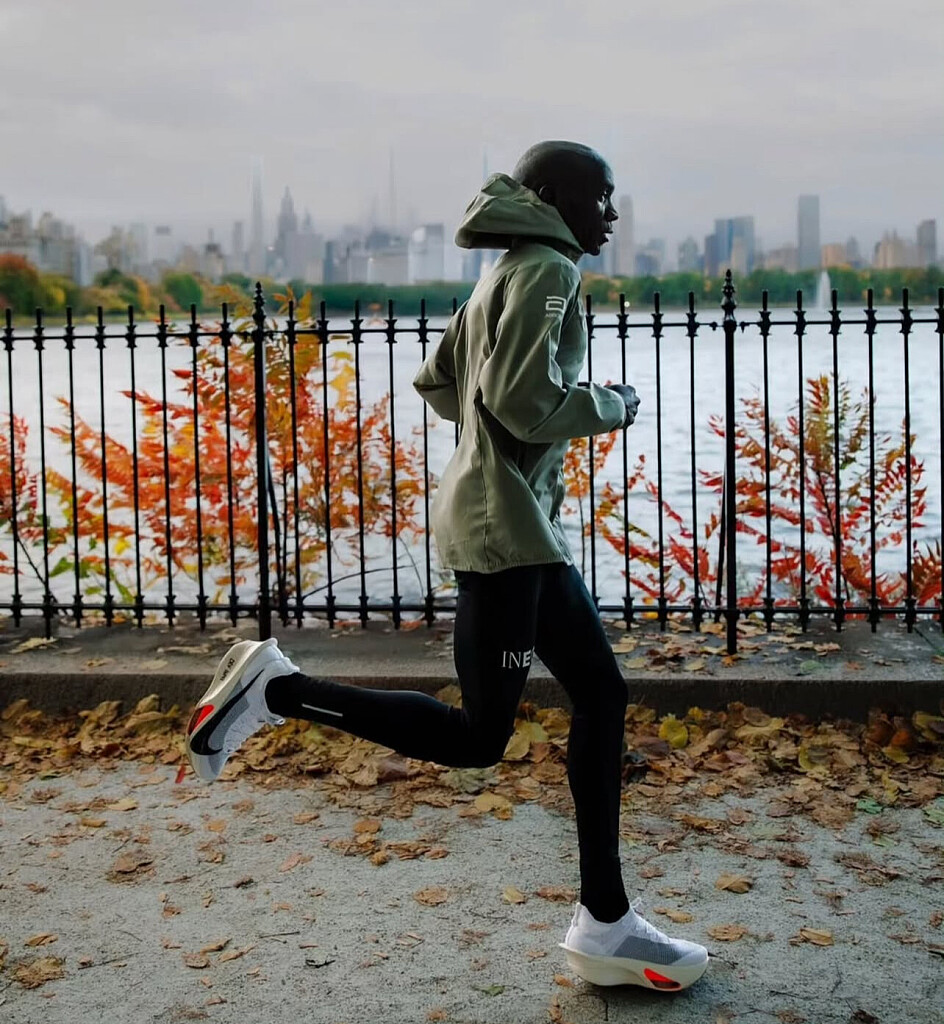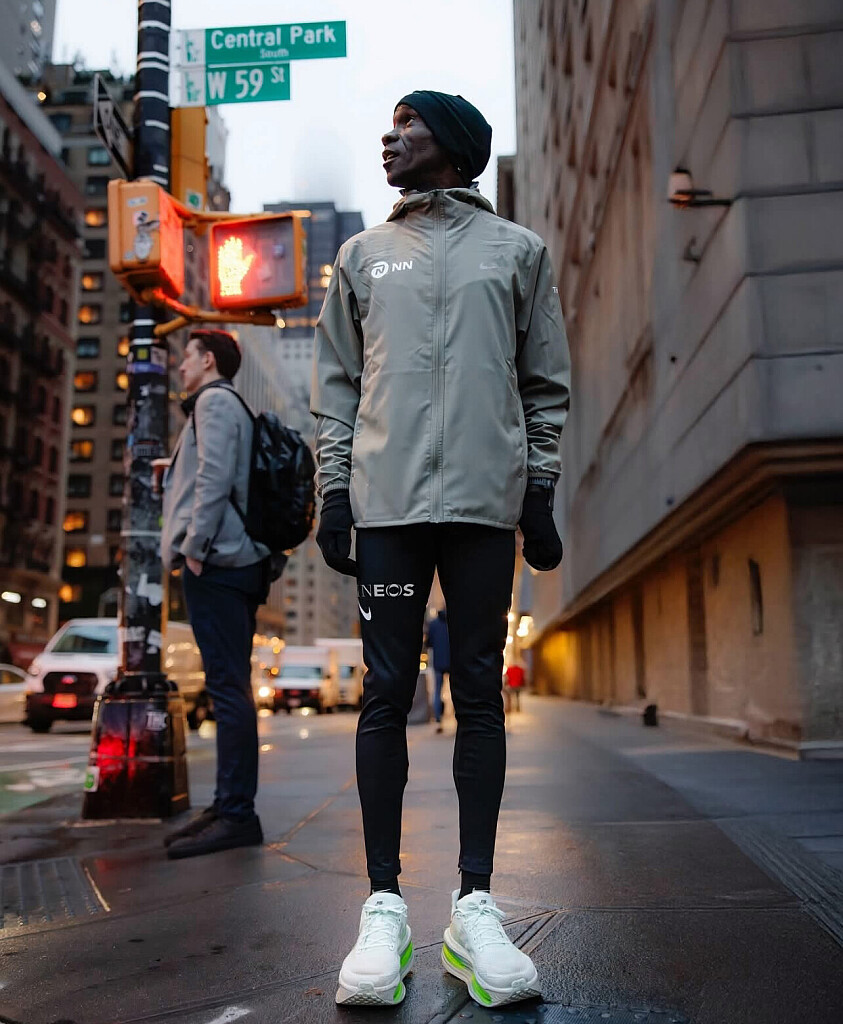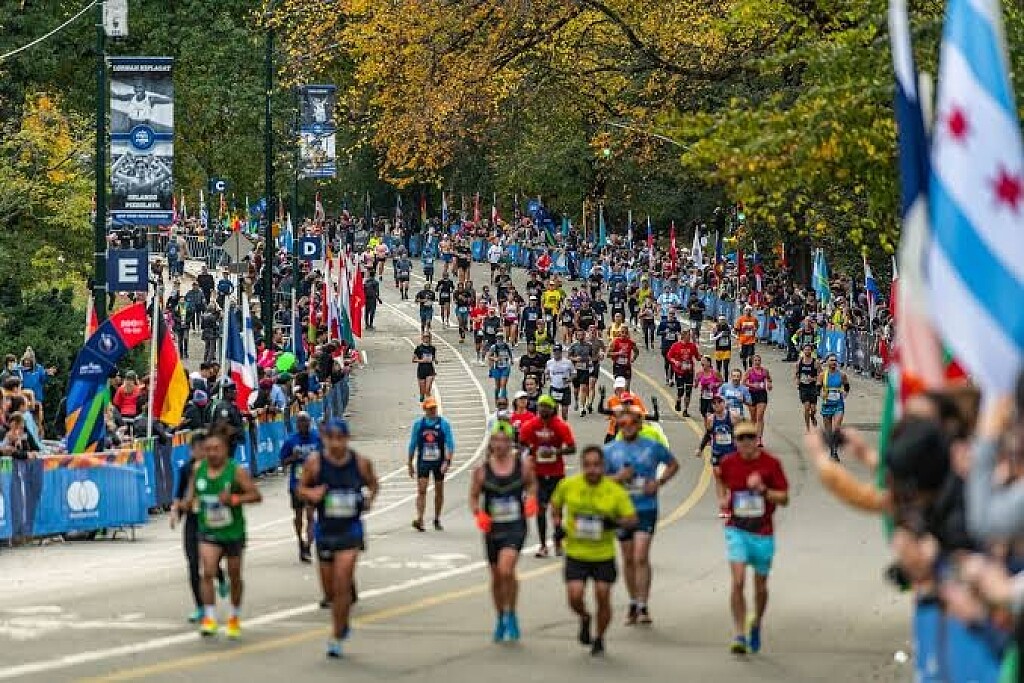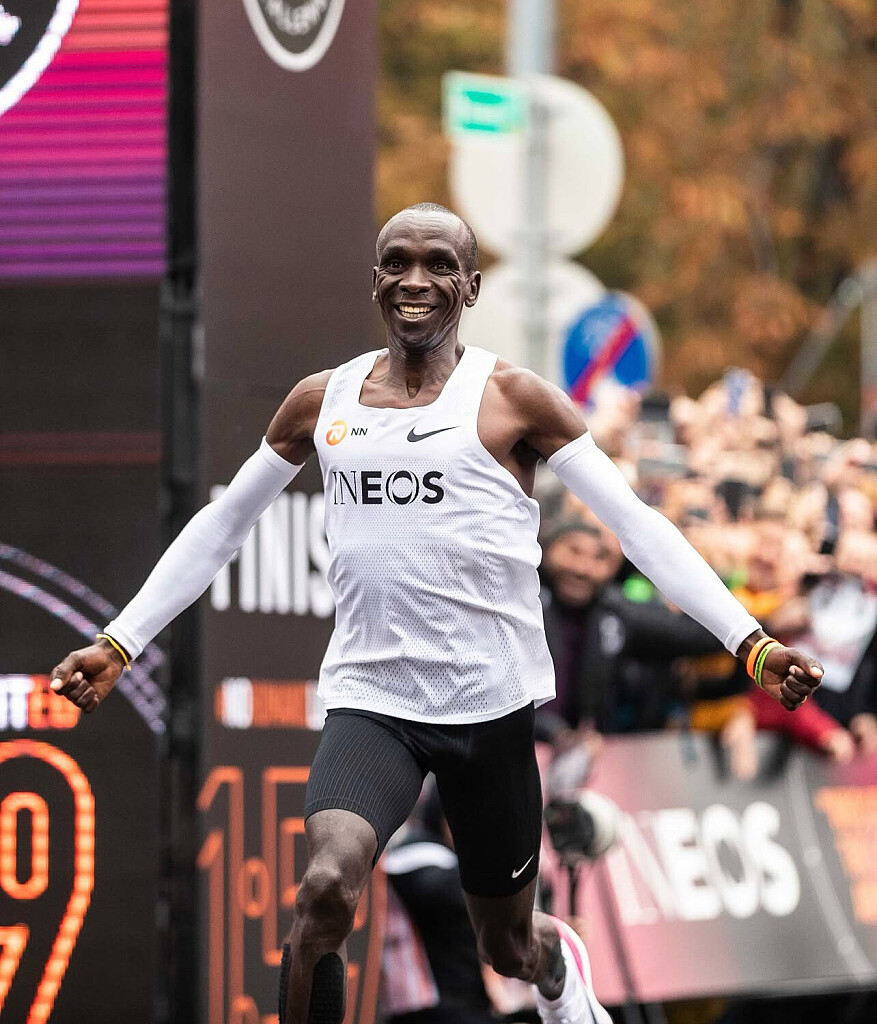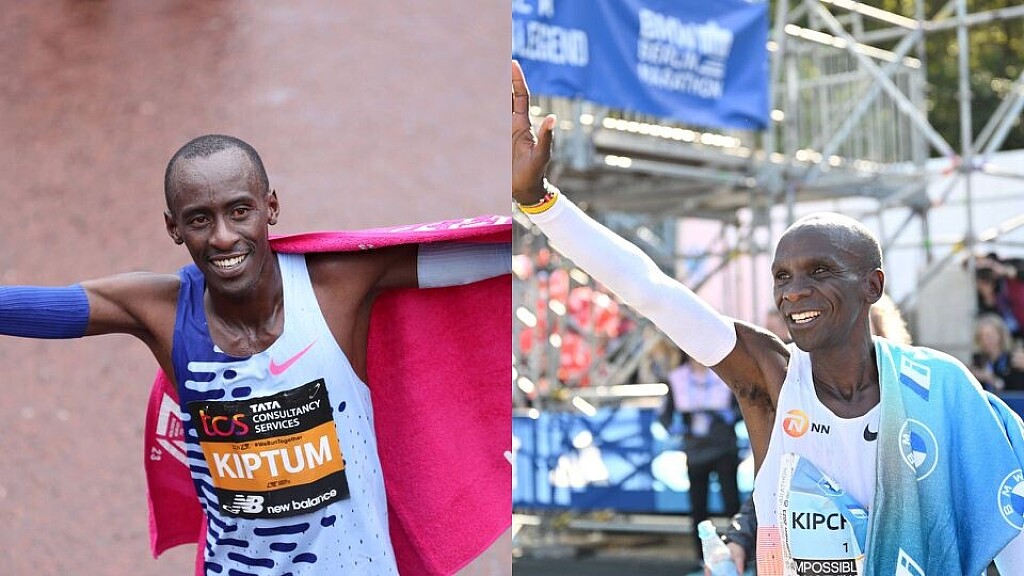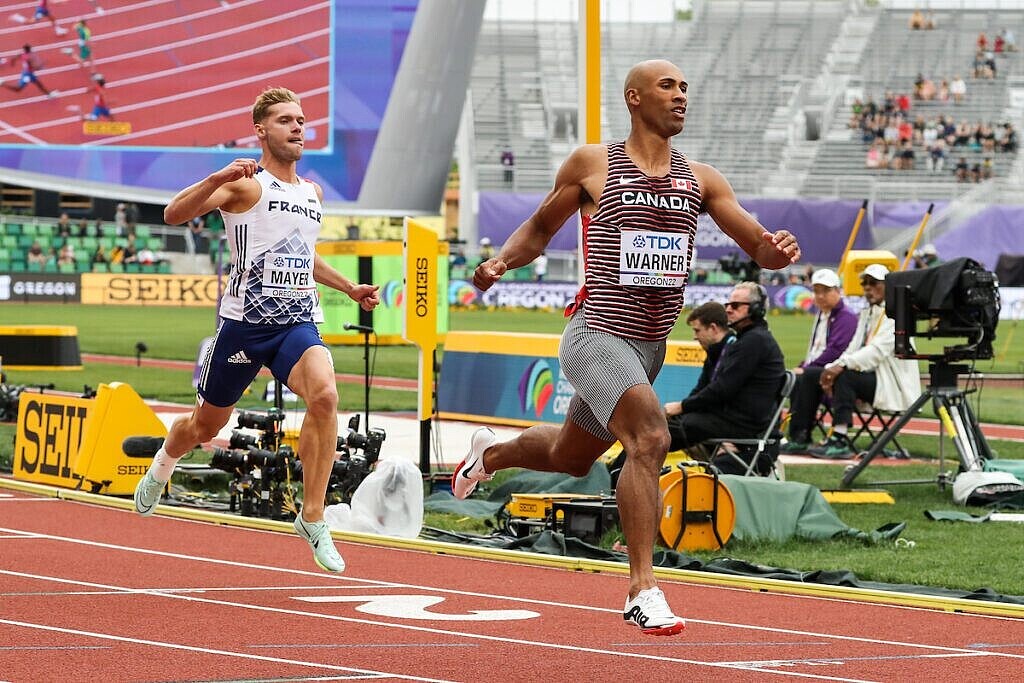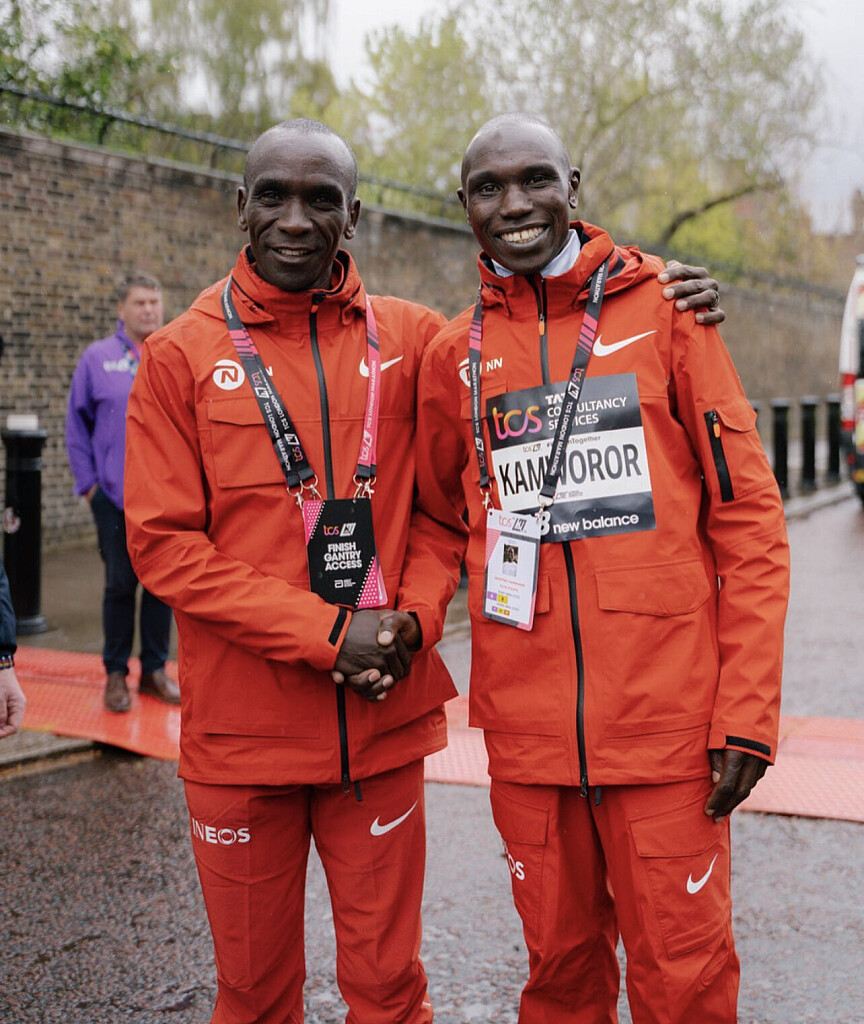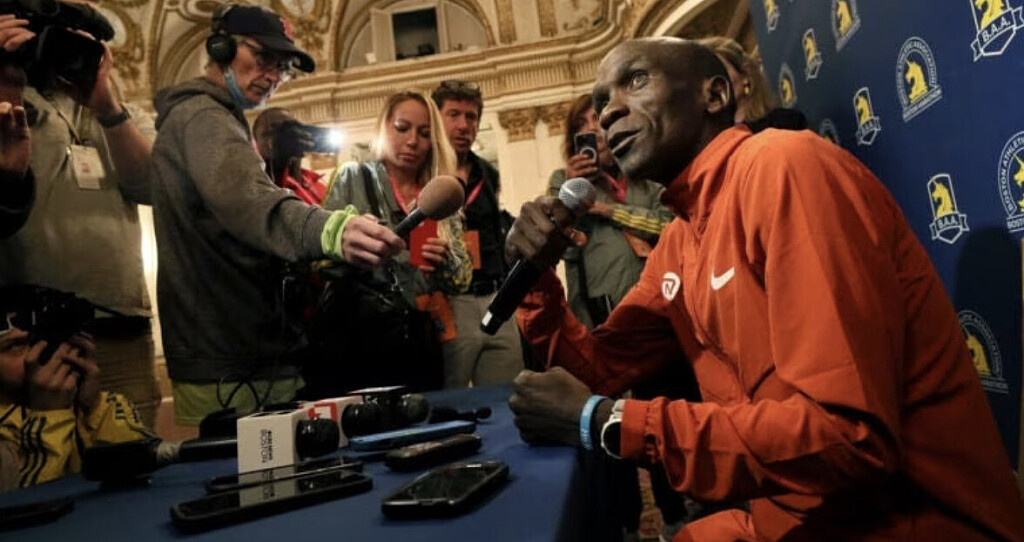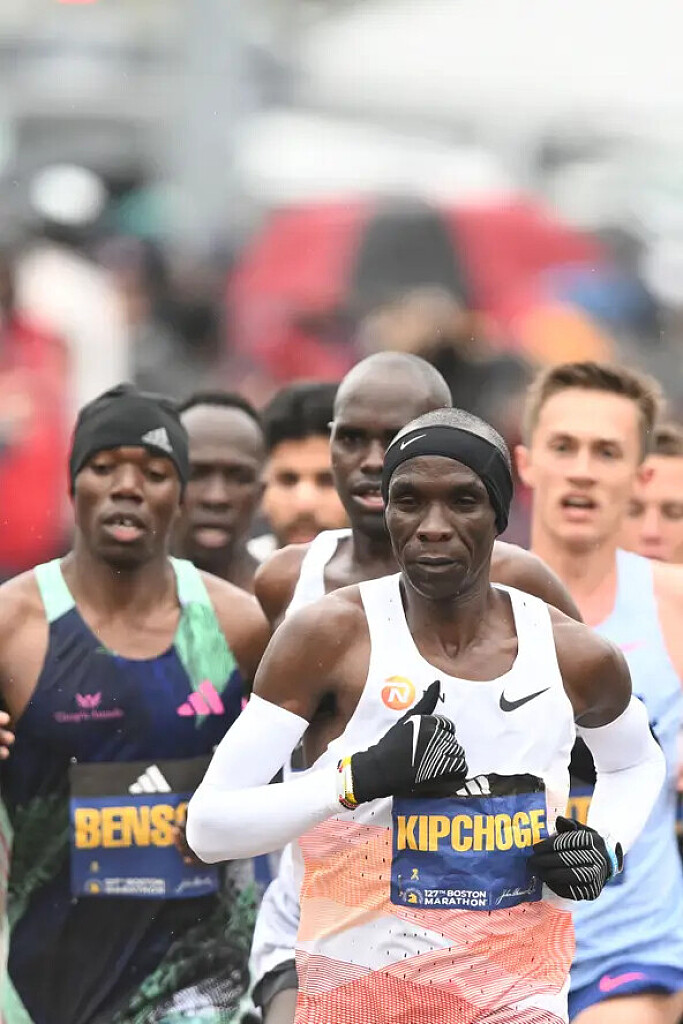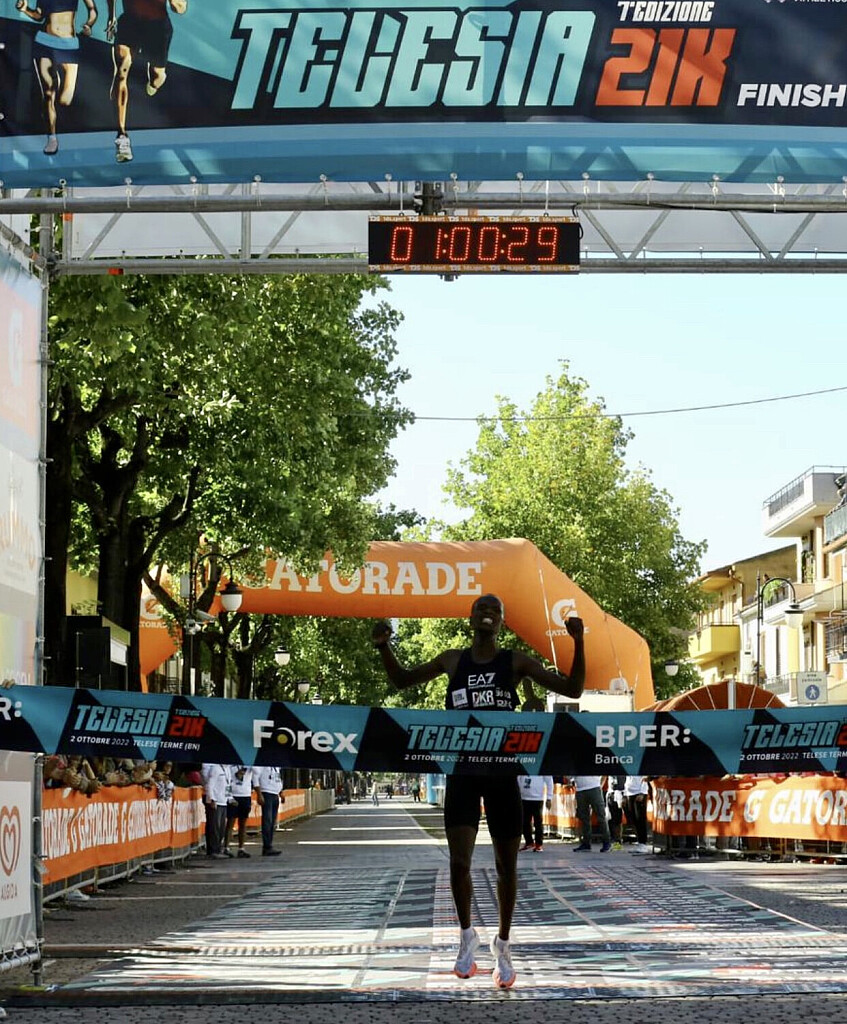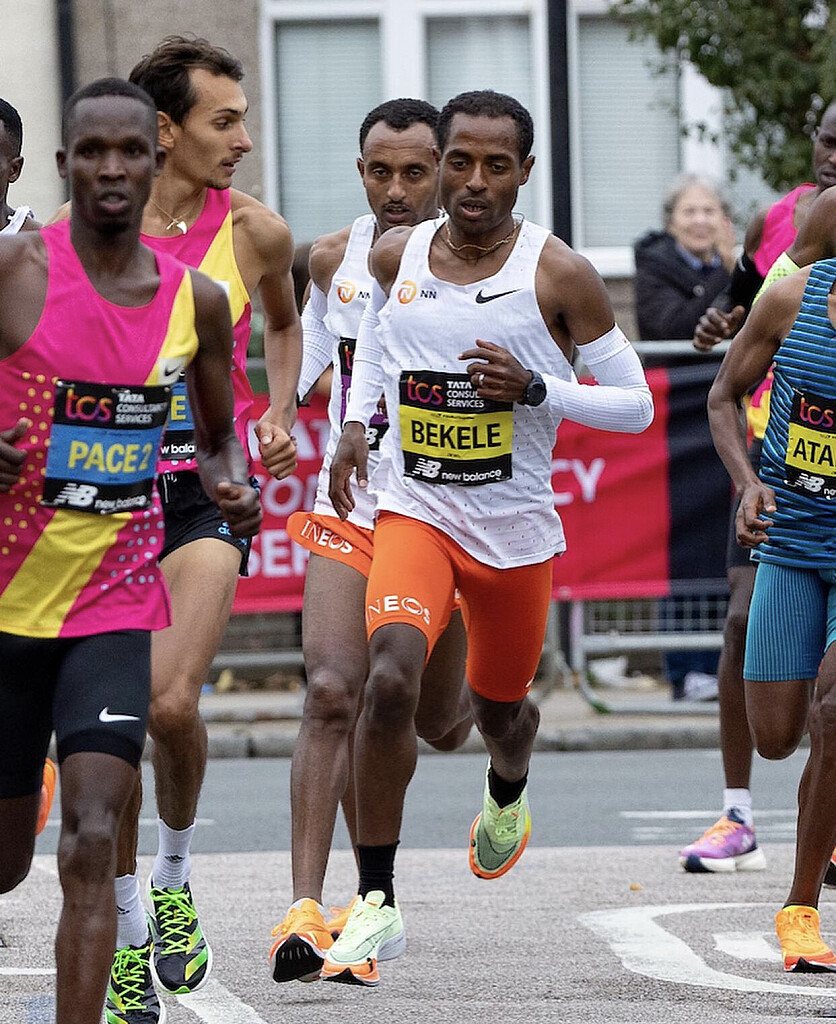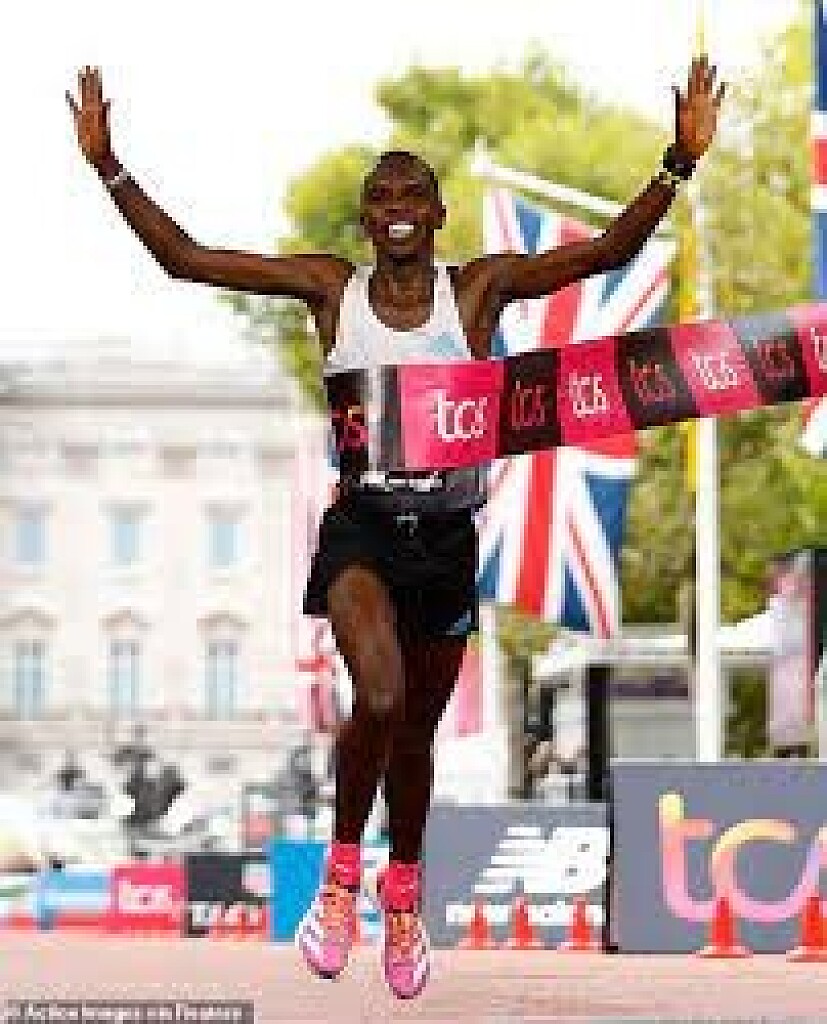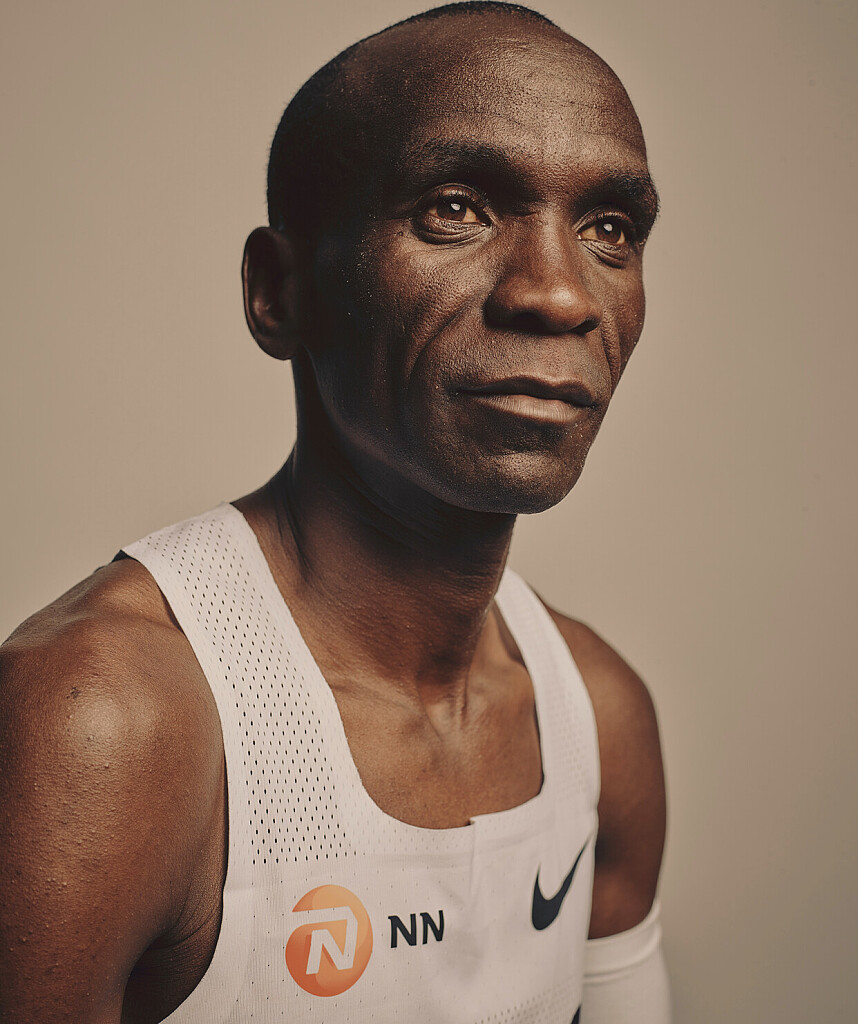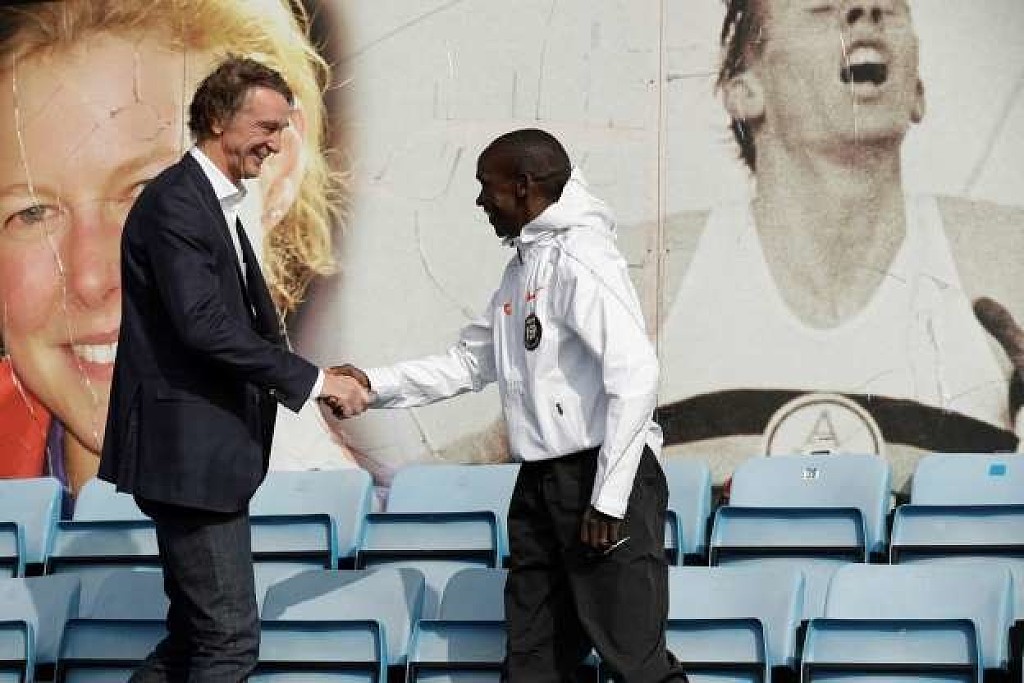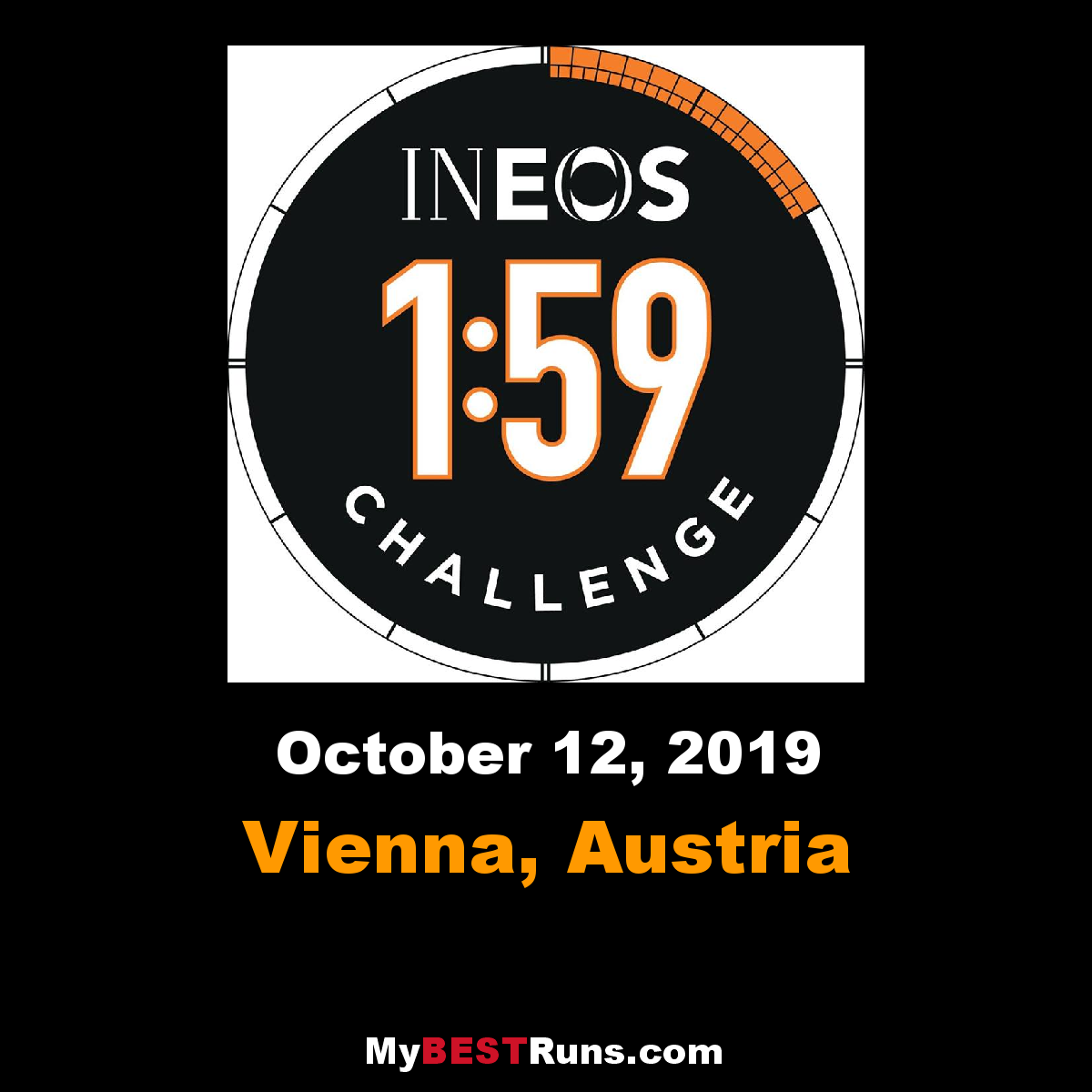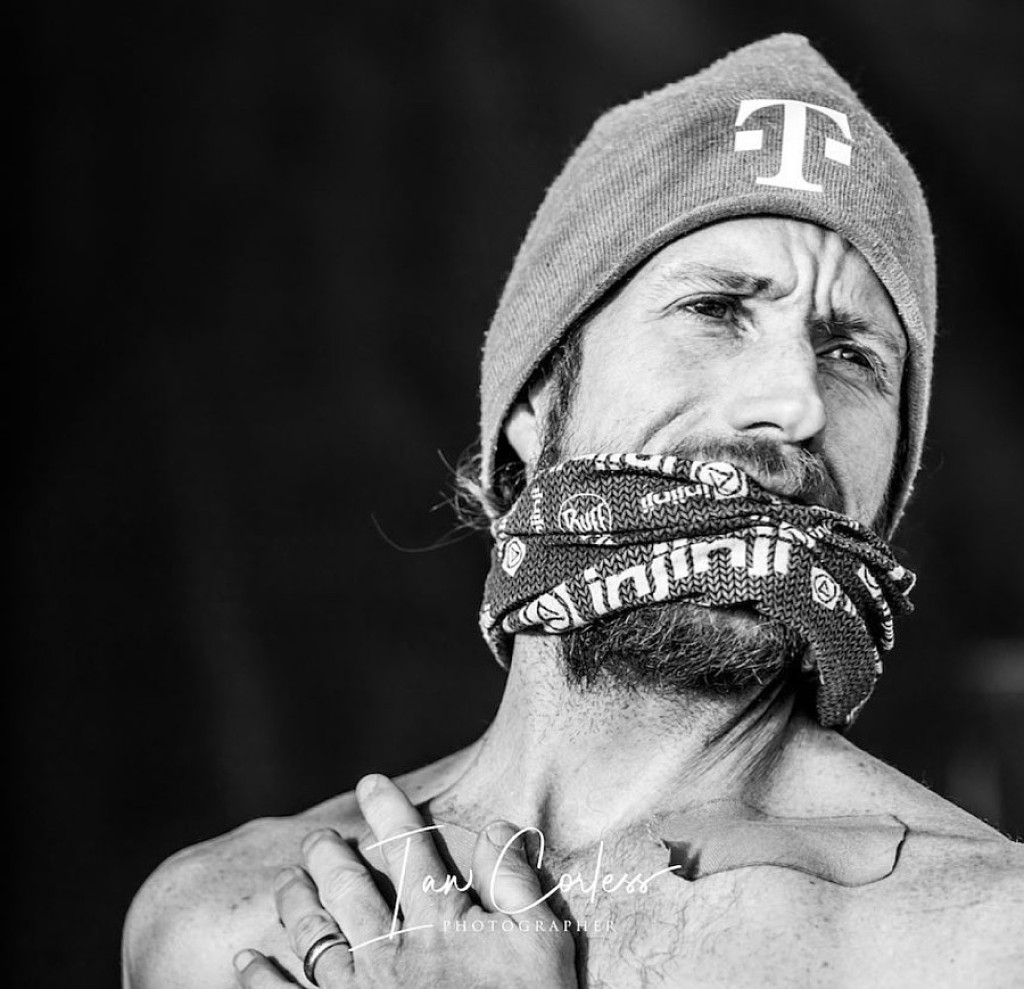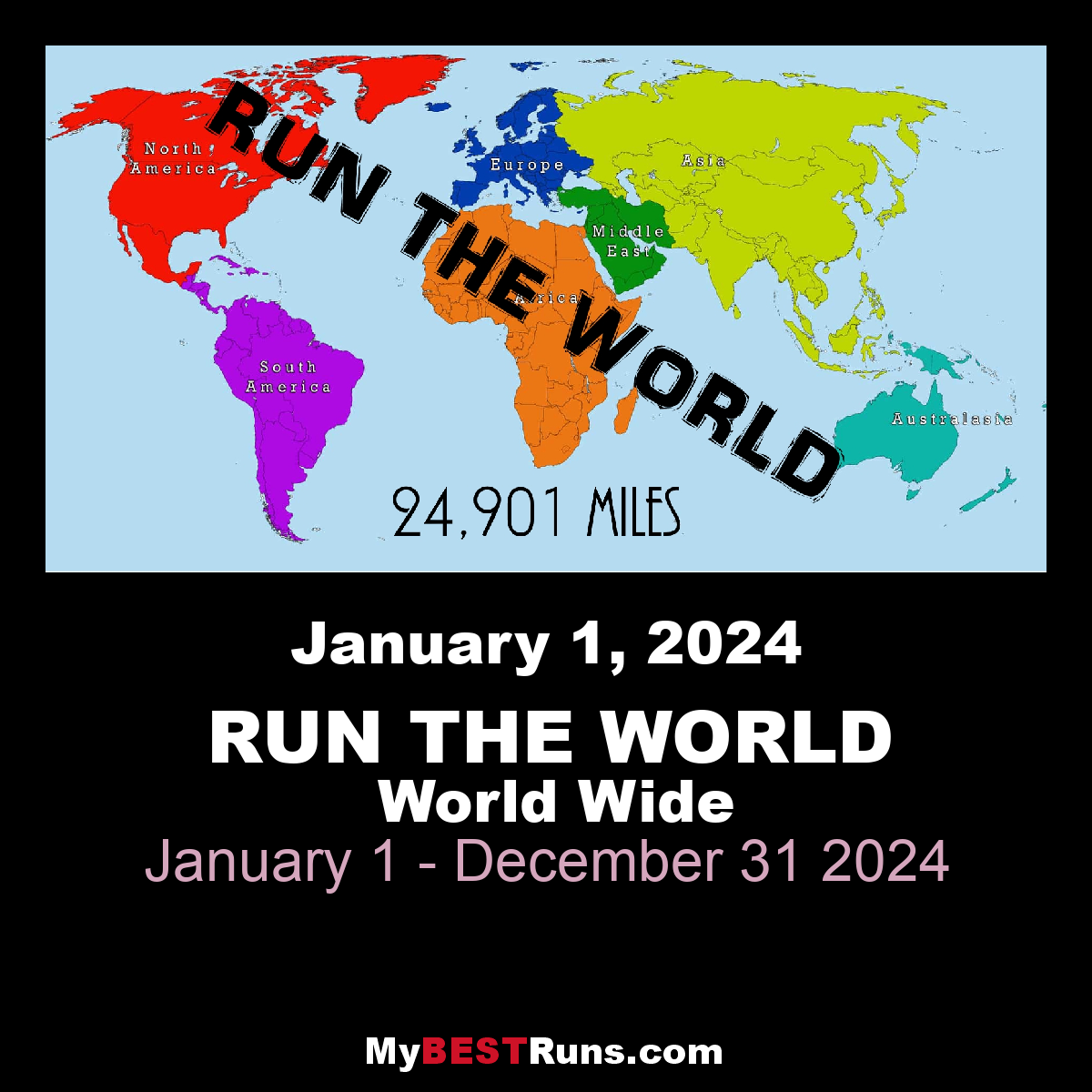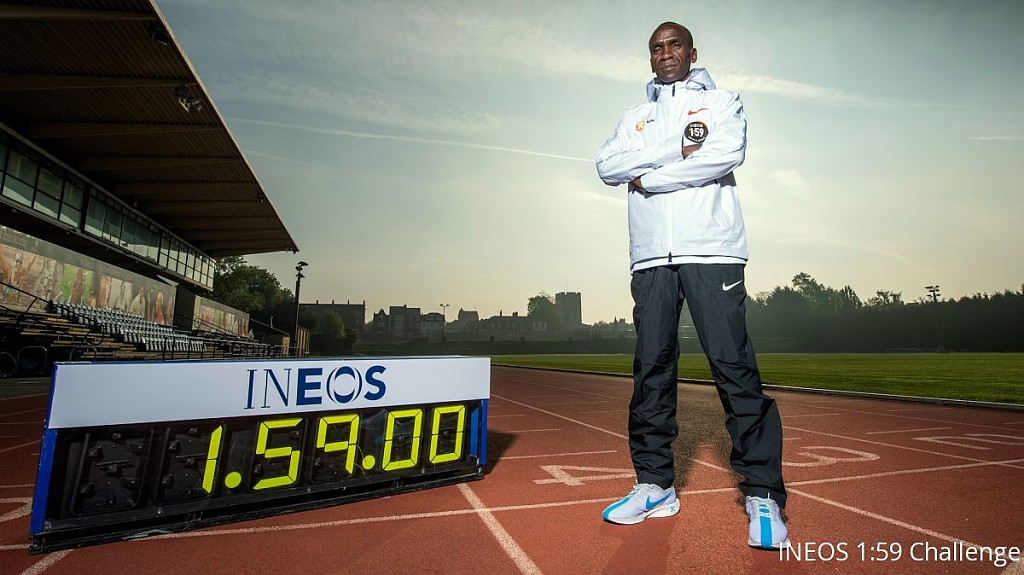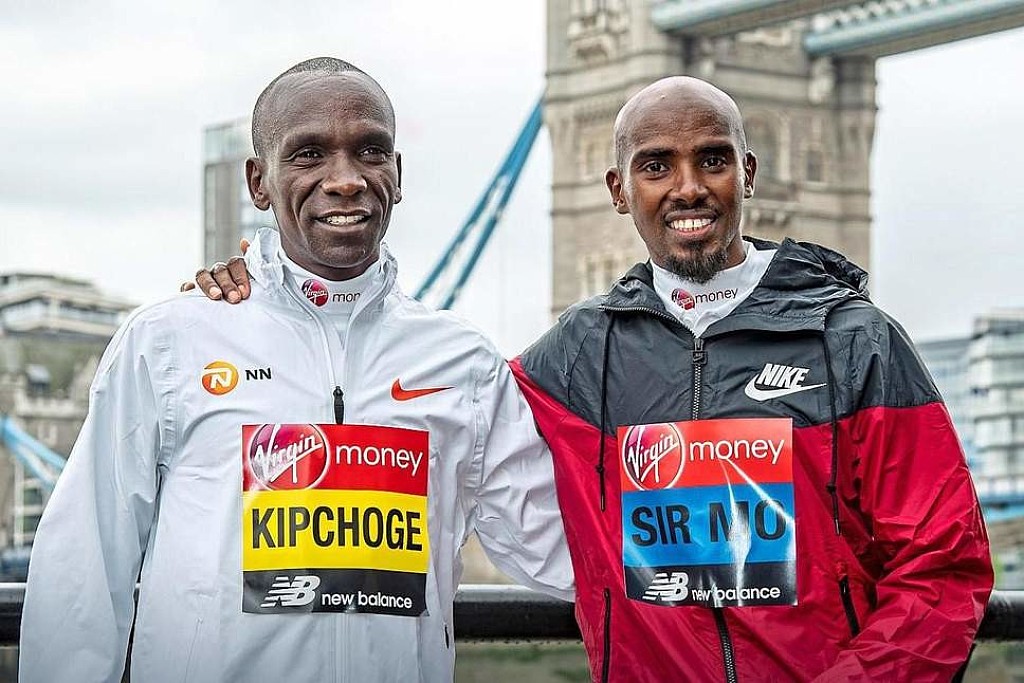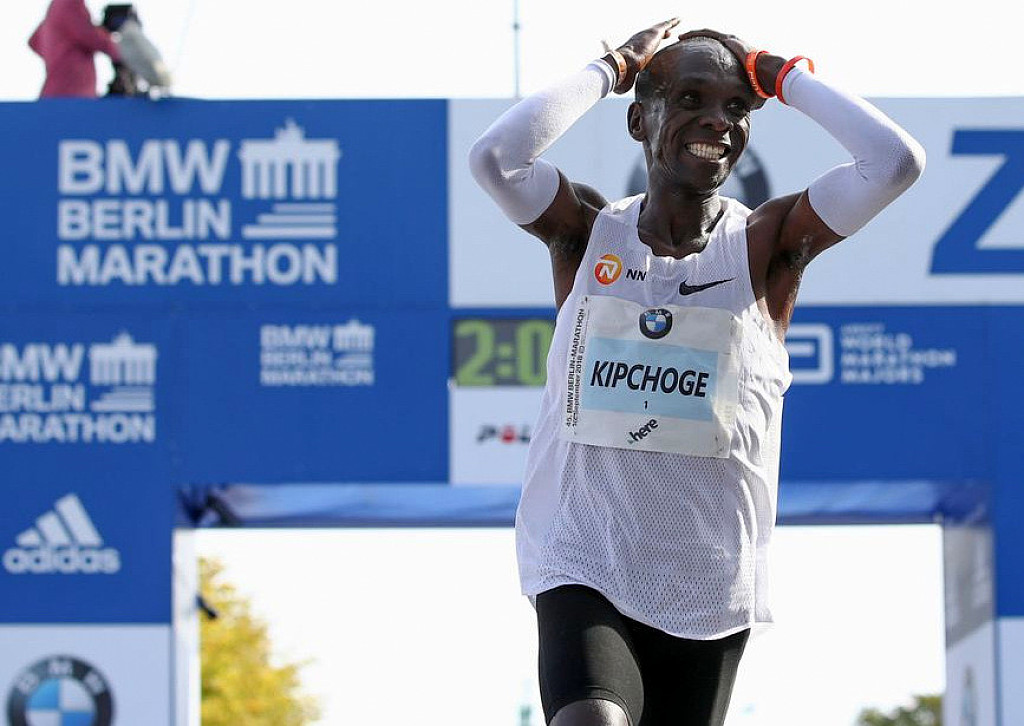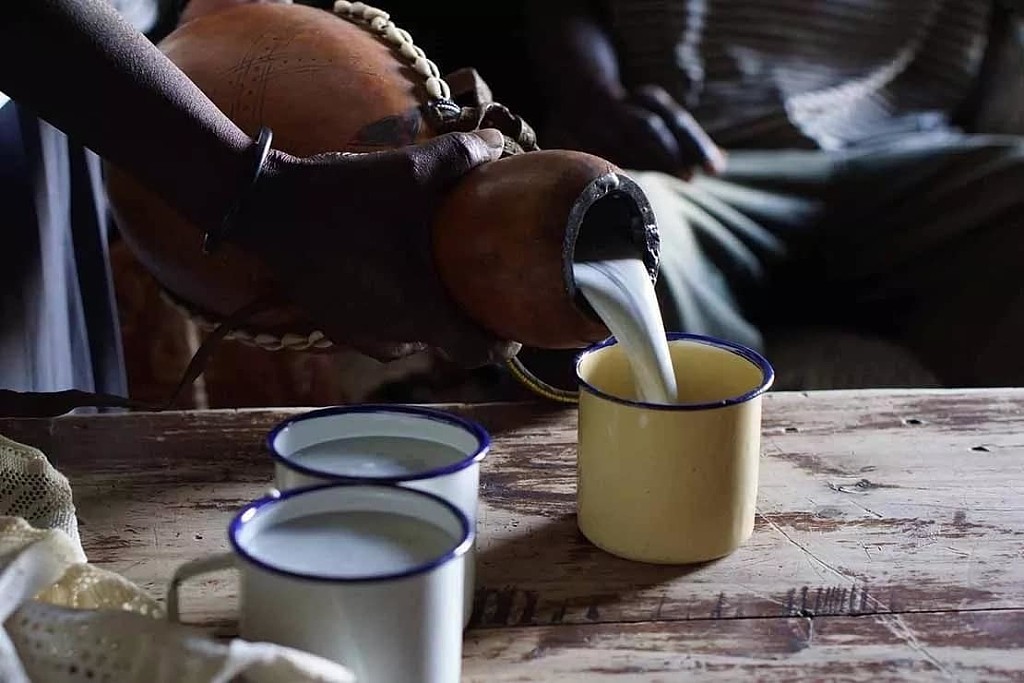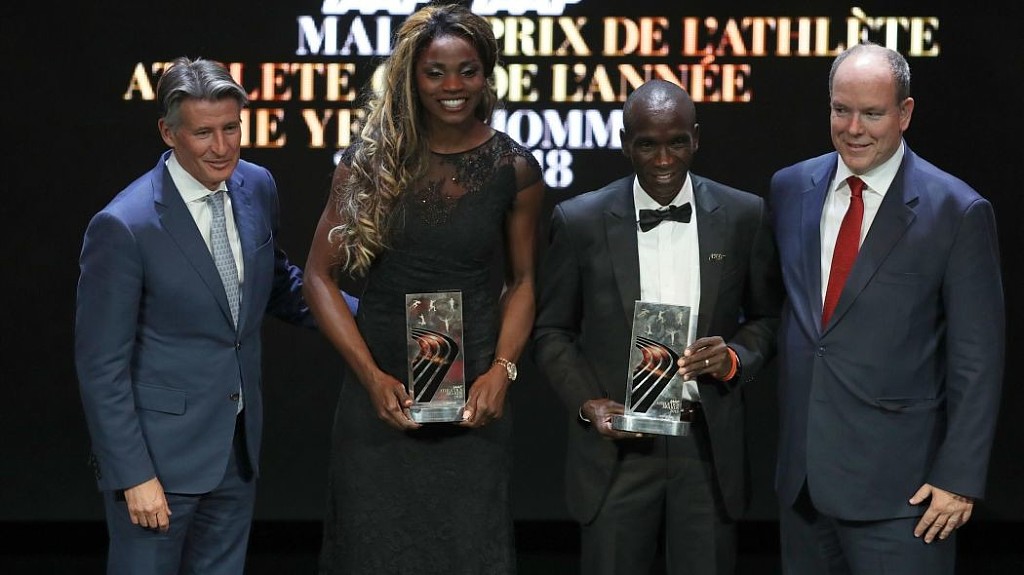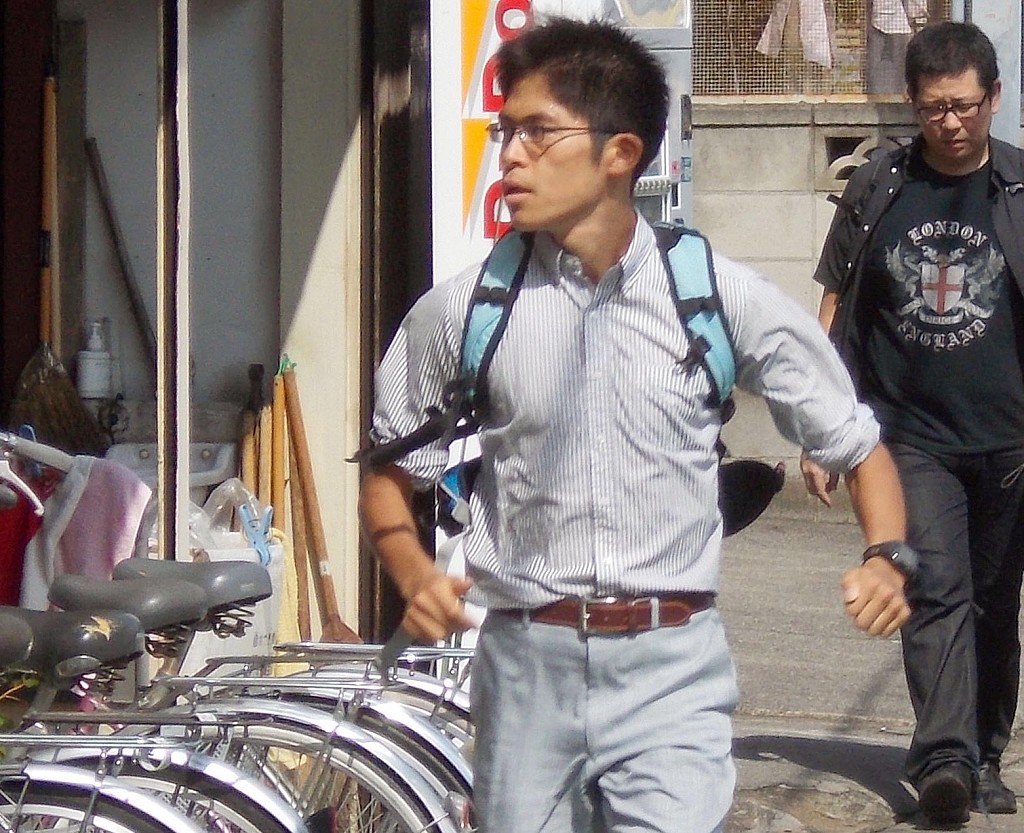Running News Daily
Running News Daily is edited by Bob Anderson. Send your news items to bob@mybestruns.com Advertising opportunities available. Train the Kenyan Way at KATA Kenya and Portugal owned and operated by Bob Anderson. Be sure to catch our movie A Long Run the movie KATA Running Camps and KATA Potato Farms - 31 now open in Kenya! https://kata.ke/
Index to Daily Posts · Sign Up For Updates · Run The World Feed
Articles tagged #Eluid Kipchoge
Today's Running News
Eliud Kipchoge’s Final Quest: Chasing Meaning, Not Medals in New York
When the sun rises over Staten Island this Sunday, the world will witness something special — Eliud Kipchoge, the greatest marathoner of all time, running the TCS New York City Marathon for the first time. At 40, the Kenyan legend isn’t chasing records. He’s chasing completeness — the final chapter of a career that redefined endurance and possibility.
With two Olympic golds, 11 major marathon victories, and the historic sub-two-hour run, Kipchoge already stands alone. Yet New York remains the one missing jewel in his Abbott World Marathon Majors crown. “If I don’t complete all of them,” he says, “I feel like I am halfway. My legacy will be complete when I have a sixth star.”
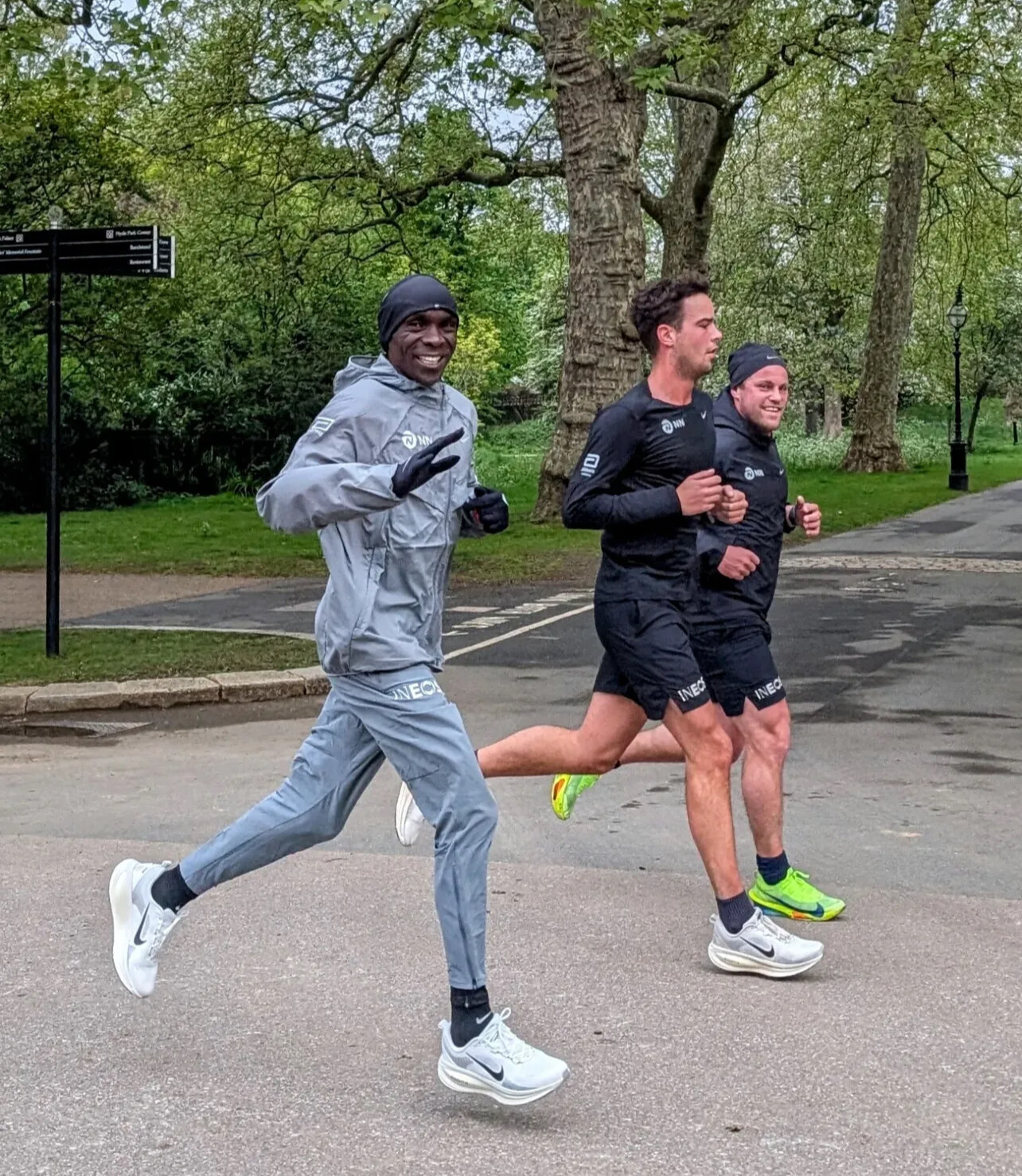
But New York is no Berlin. Its hills and bridges test rhythm and resolve. Kipchoge faces a tough field, led by his former training partner and defending champion Abdi Nageeye, along with Benson Kipruto, Alexander Mutiso, and Ethiopia’s Deresa Geleta. Nageeye, coming off a 2:04:20 in London, aims to defend his title and disrupt the legend’s farewell.
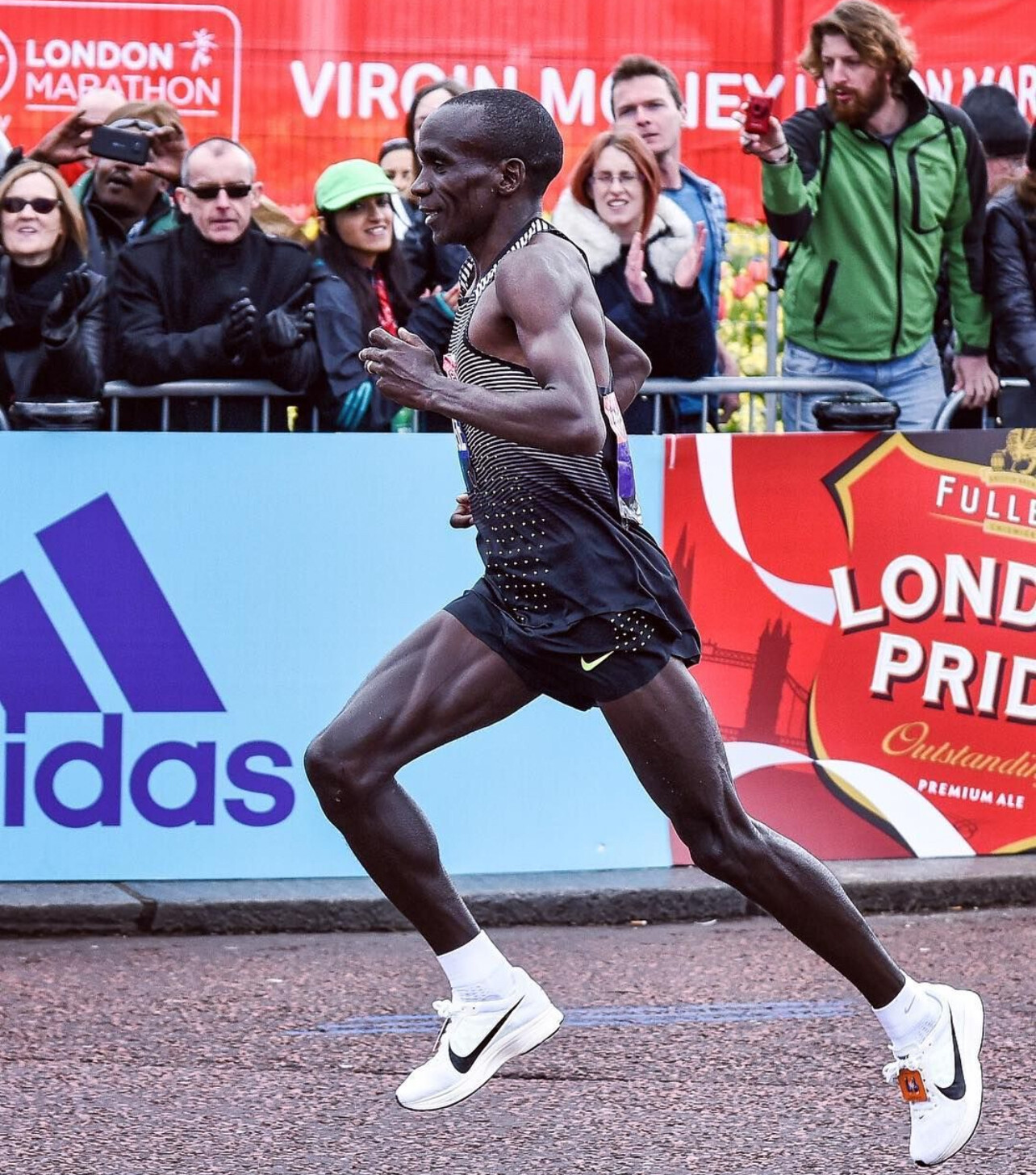
Still, for Kipchoge, this race is about purpose, not podiums. “My happiness is to see people getting interested in what I’m selling,” he says. “I’m selling the sport as a profession.” His mission now is to inspire — through running, mentorship, and his wellness platform Kotcha, which blends training, nutrition, and education. “We’re bringing knowledge to people’s fingertips,” he explains.
To him, running is a universal language. “All human beings are beautiful,” Kipchoge says. “The problem is ourselves — not using our knowledge.”
As 50,000 runners take on the five boroughs, Kipchoge’s presence turns the marathon into something larger — a meditation on effort, purpose, and legacy. His calm smile and relentless discipline remind the world that greatness isn’t about medals, but meaning.
On Sunday, as he strides through Central Park, Kipchoge won’t just be chasing a finish line. He’ll be closing a circle — running not for glory, but for the joy of fulfillment.
by Robert Kibet for My Best Runs
Login to leave a comment
Eliud Kipchoge Chases One Final Milestone as He Makes His New York City Marathon Debut This Sunday
One of the most anticipated starts in marathon history arrives this Sunday as Eliud Kipchoge, the two-time Olympic marathon champion and widely regarded as the greatest marathoner of all time, makes his debut at the TCS New York City Marathon (NYC Marathon).
The Big Picture
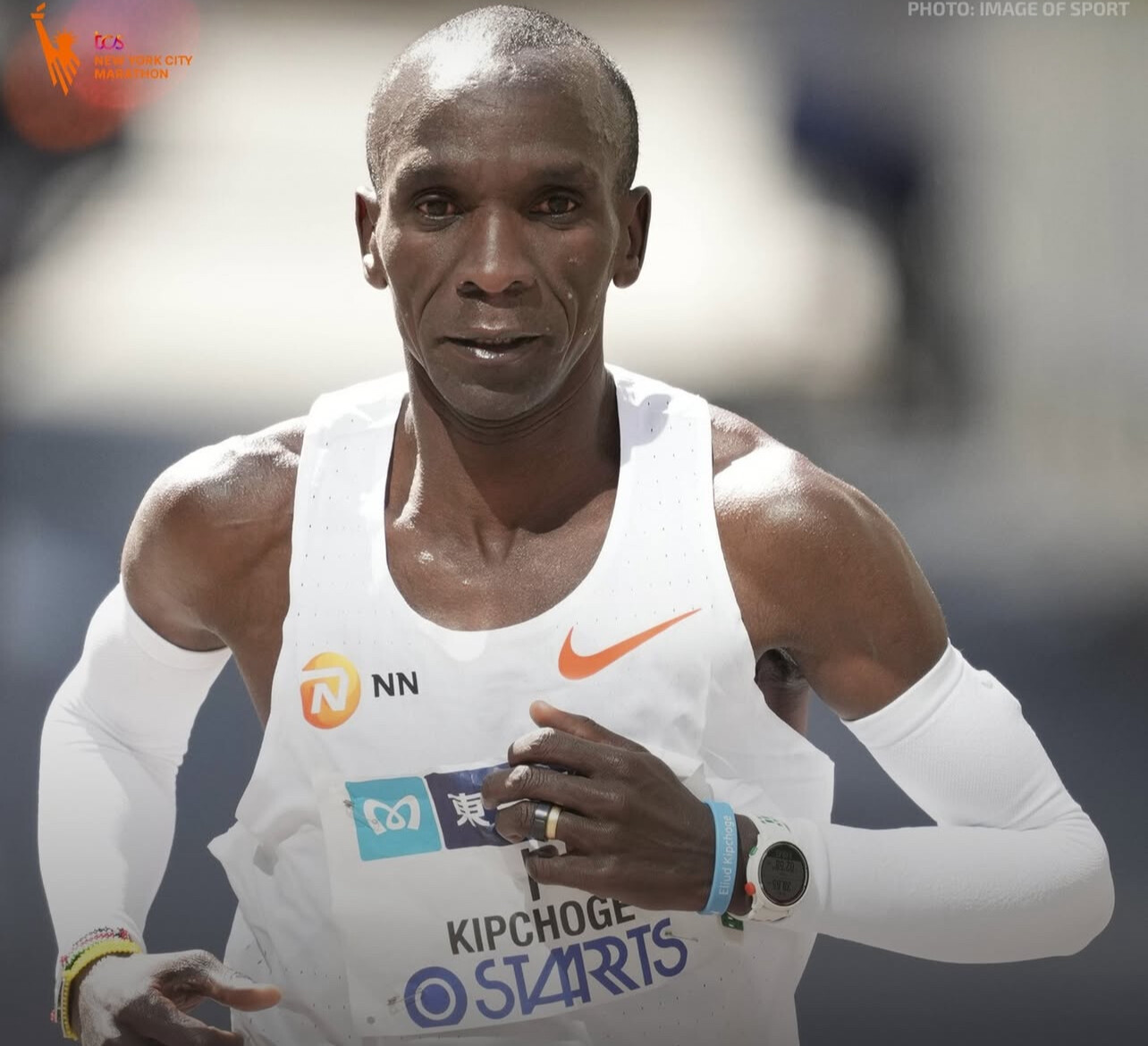
At 40 years old, Kipchoge has already built an extraordinary legacy: Olympic gold medals in 2016 (Rio) and 2020 (Tokyo), a world-record marathon time of 2:01:09 in Berlin 2022, and a historic sub-2-hour marathon effort in Vienna 2019 (1:59:40 – though not ratified).
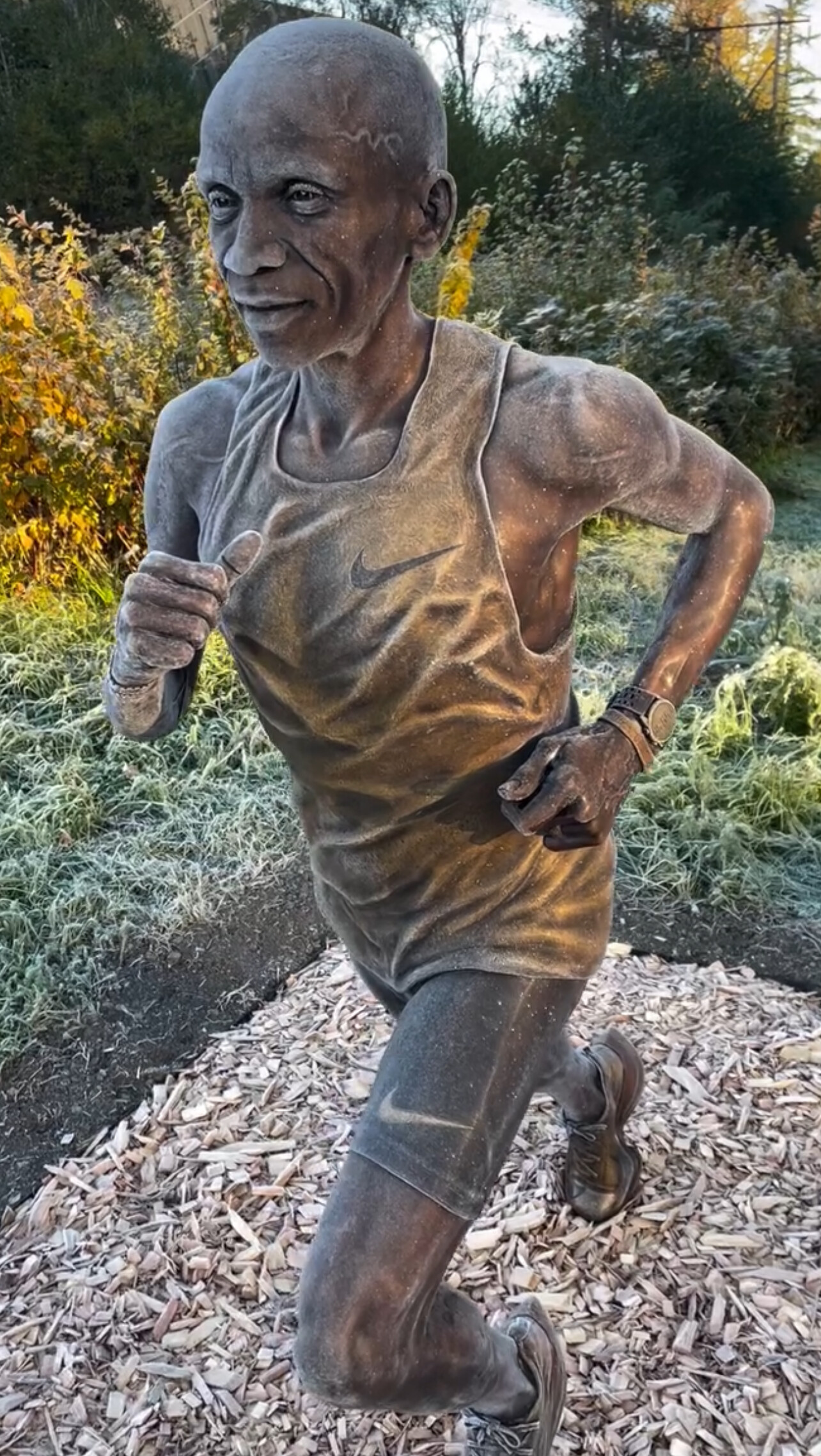
Yet until now, the NYC Marathon has been the elusive piece of the puzzle. By lining up this Sunday, Kipchoge will complete his set of the major Abbott World Marathon Majors (AWMM) if he crosses the finish line—it’s the only major marathon he has yet to run.
Why It Matters
• Legacy: Finishing NYC would give Kipchoge the coveted “six-star” AWMM medal for running all six of the premier majors.
• New challenge: The NYC course is markedly different from the flat, fast courses of Berlin or London. It’s undulating, uses bridges, and traverses the five boroughs—a true test of both physical and mental strength.
• Age and motivation: While Kipchoge remains in top shape, he acknowledges the impact of time and says this race is as much about meaning and experience as it is about finishing fast.
The Competition & Conditions
Kipchoge enters a stacked elite field. He’ll face defending champion Abdi Nageeye of the Netherlands, former NYC winners Evans Chebet and Albert Korir, and several rising stars with sub-2:04 personal bests.
What to Watch
• Will Kipchoge go for a bold win or focus on completing this final major?
• How will the unique challenges of NYC—bridges, hills, and roaring crowds—affect his pacing and strategy?
• Could this race mark the close of his competitive marathon career—or the beginning of a new chapter as ambassador and mentor?
Sunday’s race isn’t just another marathon for Eliud Kipchoge. It’s a long-awaited chapter in a legendary career—one that may see him conquer the final major, inspire millions, and reaffirm his enduring message: No human is limited.
by Boris Baron
Login to leave a comment
Running Through The City Of Dreams New York Marathon 2025
On Sunday, November 2, 2025, the five-borough spectacle of the New York City Marathon will unfold once again, offering more than 50,000 runners the chance to push 26.2 miles through the heart of New York. From the cannon blast on Staten Island to the triumphant finish in Central Park, this is a race that marries endurance, emotion and urban drama.
Kipchoge and Hassan Headline an Extraordinary Field
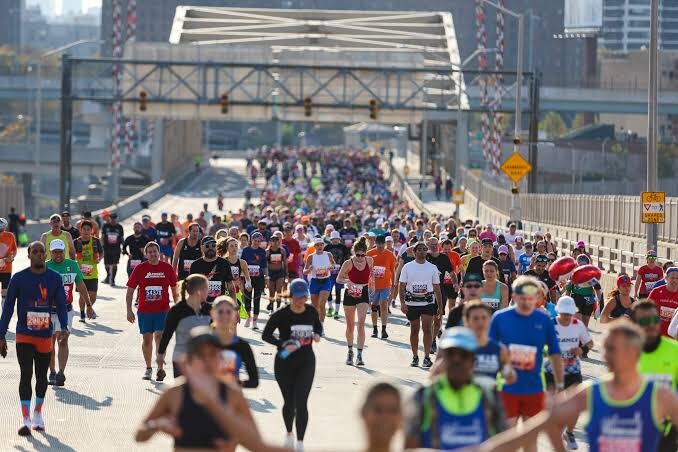
The biggest storyline heading into this year’s race is the presence of Eliud Kipchoge, the greatest marathoner in history, and Sifan Hassan, the double Olympic champion who stunned the world with marathon victories in both London and Chicago. For Kipchoge, New York completes his journey through all six Abbott World Marathon Majors — a crown that has eluded him until now.
Hassan, meanwhile, returns to the marathon distance after a string of world-class performances on both track and road, her fearless racing style perfectly suited to the unpredictable rhythm of New York’s streets.
They’ll face an elite field stacked with world-class names, including Benson Kipruto of Kenya (2:02:16 PB), Evans Chebet (two-time Boston champion, 2:03:00 PB), and defending champion Tamirat Tolaof Ethiopia (course record holder at 2:04:58). The women’s field is equally star-studded, featuring 2022 champion Sharon Lokedi, Tokyo winner Rosemary Wanjiru, and a host of East African contenders ready to test Hassan on one of the sport’s toughest stages.
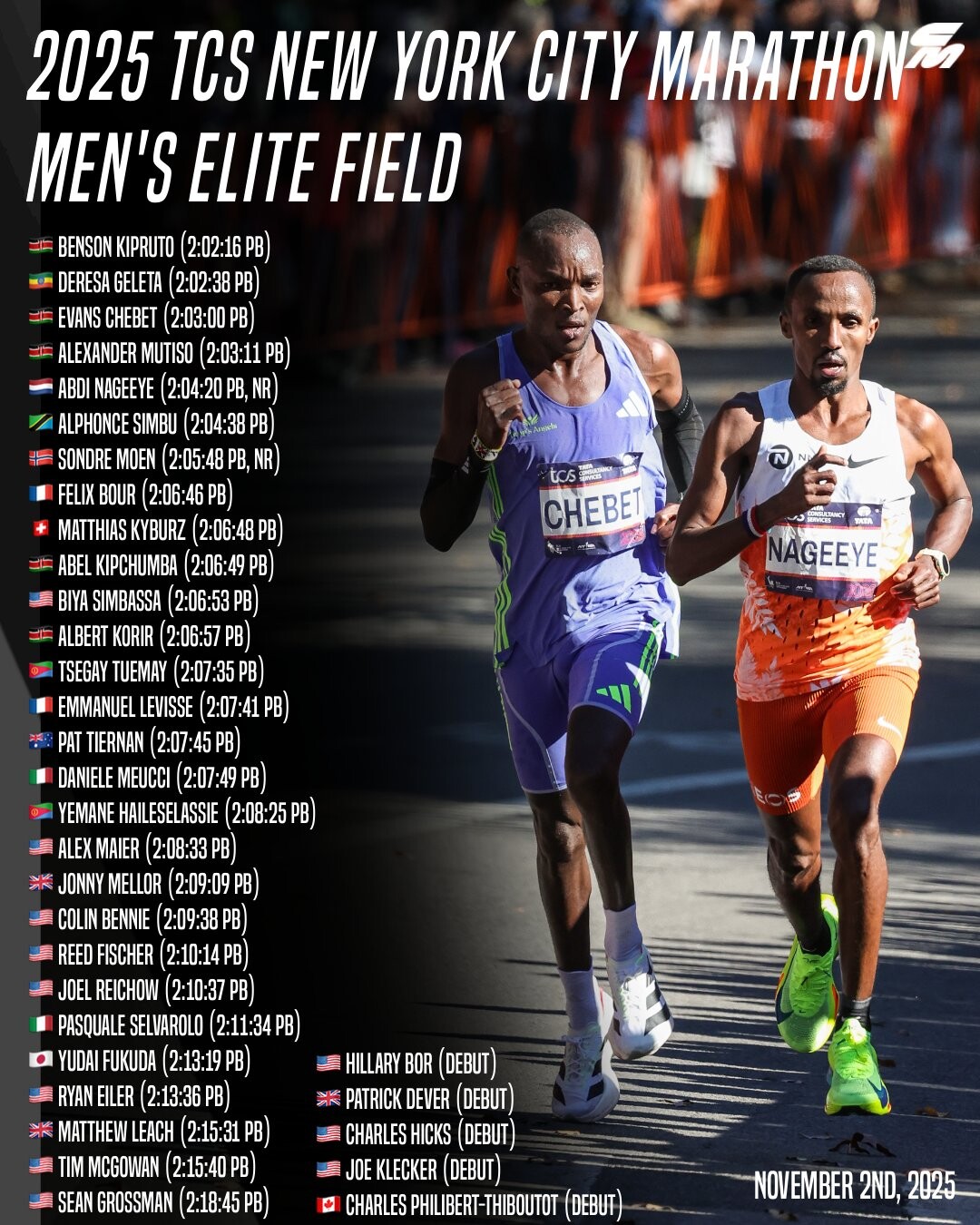
Among the American hopefuls, Emily Sisson, the U.S. record holder in the marathon, headlines the women’s field and will make her New York debut. On the men’s side, Biya Simbassa leads the U.S. charge, joined by a deep domestic field racing for top-American honors and prize bonuses.
Course Records
• Men: 2:04:58 — Tamirat Tola (ETH), 2023
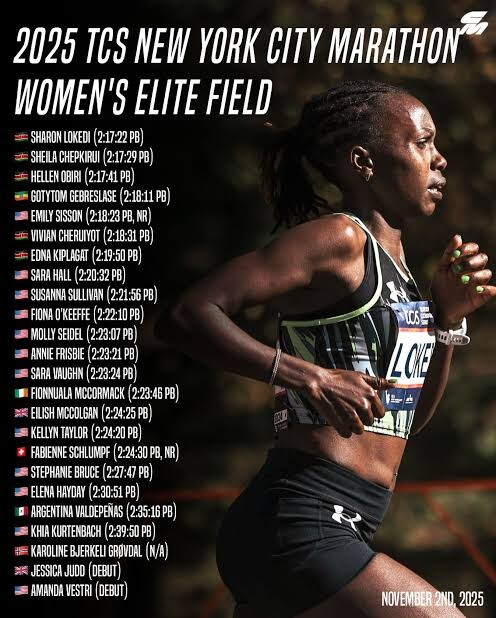
• Women: 2:22:31 — Margaret Okayo (KEN), 2003
These records reflect both top-tier performance and the challenging character of the course — rather than flat, pacer-assisted routes that routinely see world-record times.
Prize Purse
The stakes are high. Open-division winners stand to earn $100,000, with descending prizes through 10th place. The event also offers a $50,000 bonus for a winner who breaks the standing course record, plus separate prize pools for top U.S. finishers and wheelchair divisions. With total payouts approaching nearly a million dollars, the financial motivation is real — even if the course isn’t built for world-record thrills.
Why a World Record Isn’t Realistic
Make no mistake: the New York course is legendary for its toughness rather than its speed. Runners face five major bridge crossings, a long ascent up the Queensboro Bridge around mile 15–16, variable terrain, sharp turns and a final push up Fifth Avenue into Central Park. Unlike flat, pacemaker-led courses such as Berlin or Chicago, NYC emphasises tactical racing, rivalries and finish-line theatre. The organising body eliminated dedicated elite pacemakers years ago in favour of pure head-to-head competition.
While pace groups may support recreational waves, elite winners will race without the type of structured pacemaking that enables constant sub-2:03 splits. In short: this is a championship-style contest, not a time-trial.
What Makes NYC Unique
• Cityscape & crowd noise: From Staten Island’s Verrazzano Narrows Bridge to Brooklyn’s vibrant neighborhoods, the Queensboro Bridge, Manhattan’s First Avenue and the final loop in Central Park, the scenery is unmatched.
• Massive scale but elite depth: The global field, the tens of thousands of recreational runners, the international media — the race’s atmosphere is unmatched in road-racing.
• Legacy of racing over timing: Past editions have celebrated bold attacks and dramatic finishes more than normally smooth pacing. That makes this one of the world’s most storied and unpredictable marathons.
What to Watch on November 2
• How Kipchoge adapts his disciplined, flat-course style to a course that demands rhythm changes, hills and surges.
• Whether Hassan will leverage her track speed and tenacity to counter a course that rewards strength and race-tactics.
• Whether Sisson (and other U.S. entrants) can navigate the final tougher miles to claim top-American status or even an open podium spot.
• The weather and pacing strategy: any wind across the bridges or mis-timed surge could decide the race more than early splits.
• Whether someone dares to go after Tola’s 2:04 : 58 mark — unlikely but possible under perfect conditions.
The 2025 New York City Marathon is more than a race. It is a testament to endurance, to the city that hosts it and to runners who thrive in challenge rather than comfort. Kipchoge and Hassan bring star power. The U.S. challengers bring ambition. And the 50,000+ starters bring stories.
Whether you’re chasing a personal best, seeking a finish-line moment or just watching from the sidelines, November 2 will be unforgettable. The bridges, the boroughs, the final climb into Central Park — the city will judge your resolve. And with no pacemakers to pull you through, this year’s finishers will know they earned every step with heart.
by Boris Baron
Login to leave a comment
TCS New York City Marathon
The first New York City Marathon, organized in 1970 by Fred Lebow and Vince Chiappetta, was held entirely in Central Park. Of 127 entrants, only 55 men finished; the sole female entrant dropped out due to illness. Winners were given inexpensive wristwatches and recycled baseball and bowling trophies. The entry fee was $1 and the total event budget...
more...Eliud Kipchoge Launches “Kotcha Run” — Bringing His Training Secrets to Runners Worldwide
Eliud Kipchoge, the marathon icon and global ambassador of distance running, has officially launched a new app — Kotcha Run — designed to share his legendary training methods with runners everywhere.
Developed in partnership with the NN Running Team, the app provides athletes of all levels with access to the very strategies, tools, and insights that have powered Kipchoge’s record-breaking career and two Olympic gold medals.
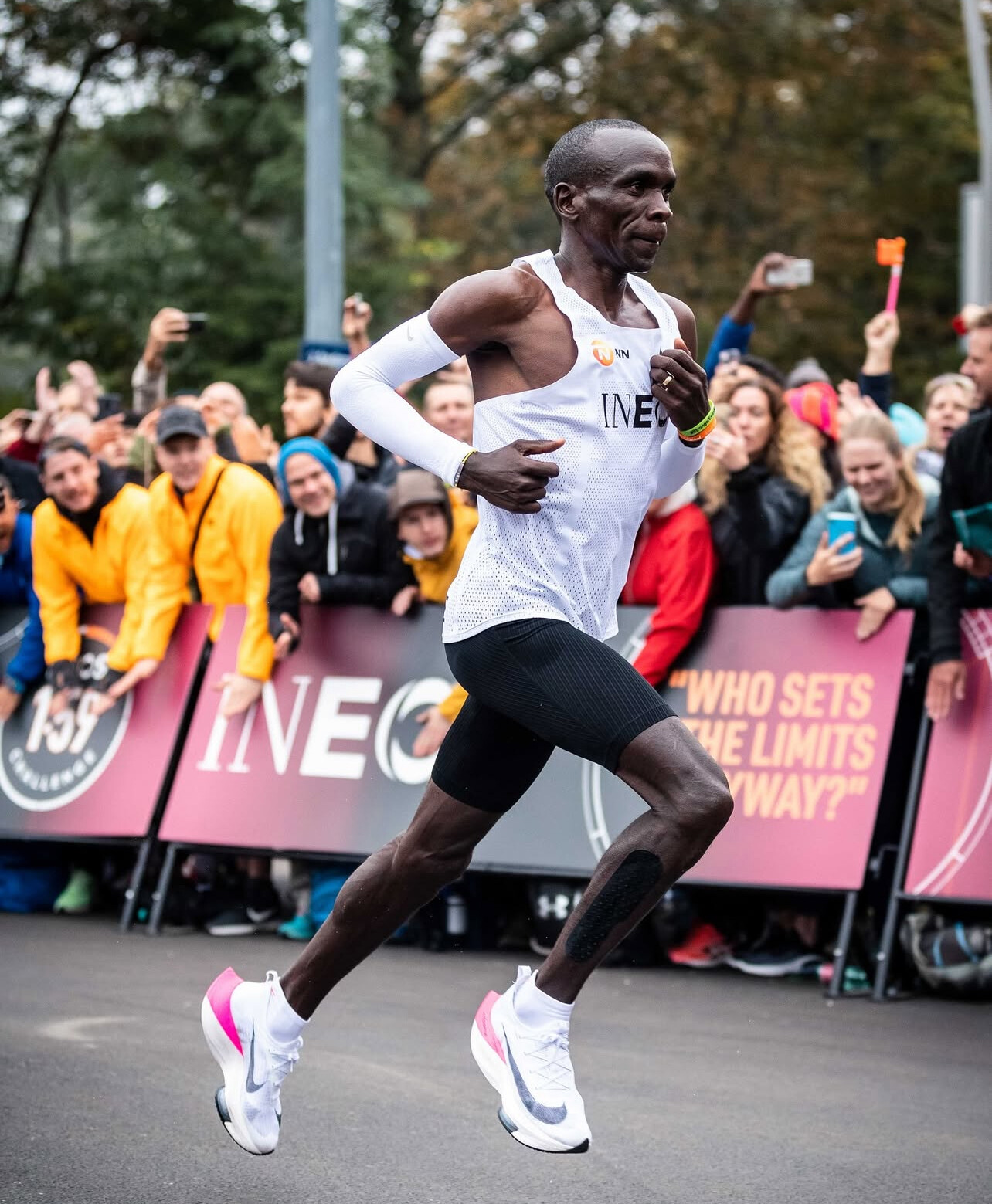
“People always ask me about my secret. Today, I’m offering a way to share it,” Kipchoge explained.
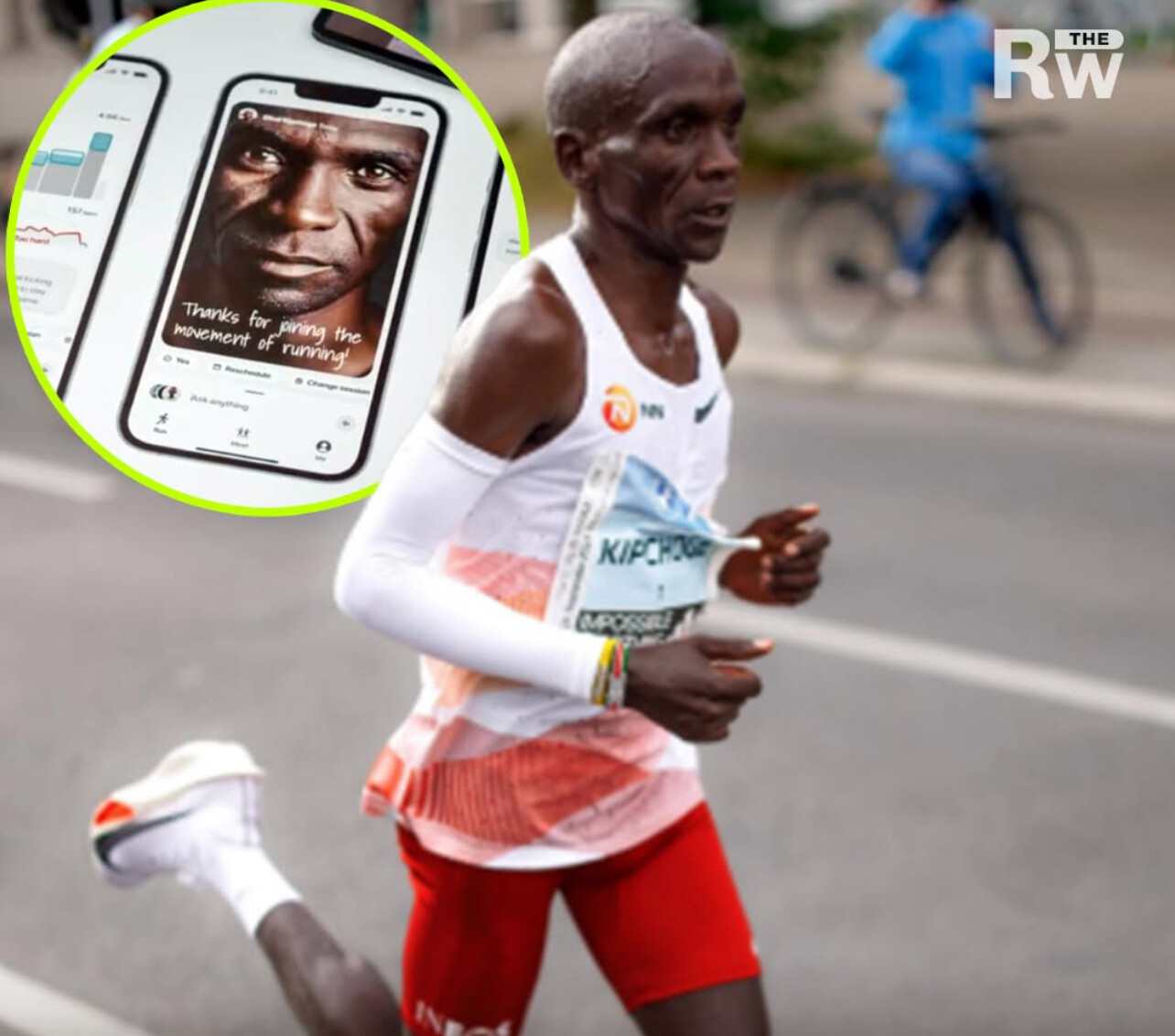
Through Kotcha Run, users can follow customized training programs, explore practical tips, and gain daily motivation directly inspired by the world’s greatest marathoner. Whether you’re preparing for your first 5K or your next marathon, the app helps runners apply Kipchoge’s disciplined yet philosophical approach — centered on patience, consistency, and belief.
Runners can now pre-register on the App Store to be among the first to experience it.
With this launch, Eliud Kipchoge once again proves his commitment to democratizing elite training, helping every runner — from beginner to professional — discover their own “No Human Is Limited” potential.
by Boris Baron
Login to leave a comment
How to use time off to make you a stronger and faster runner
New Brunswick-based coach Stephen Andersen explains how to use time off to make you a stronger, faster runner.
The fall racing season is coming to a close, and if you’re not already there, the off season is at your doorstep. Whether you appreciate taking some time off training or you loathe getting out of your regular running routine, one thing is certain: downtime is an important part of your training plan. We spoke with coach and agent Stephen Andersen of Fredericton, who explained how runners can maximize their downtime so they come back healthier and stronger for their next training block.
For starters, Andersen doesn’t like the term “off-season:” “Running is a year-round sport, despite the sometimes crummy weather we get in Canada,” he says. “Instead, I like to frame it as taking downtime.”

This downtime, he says, should usually follow a big goal race or tough training block. For example, he says it’s important to take some time off after a marathon, because it allows your body to rest and recover. He adds that taking some downtime can also help your body absorb your previous block of training, so you can return to running feeling rested and ready to work hard. It also helps to mentally reset and prepare for your next goal.
How long should your downtime be?
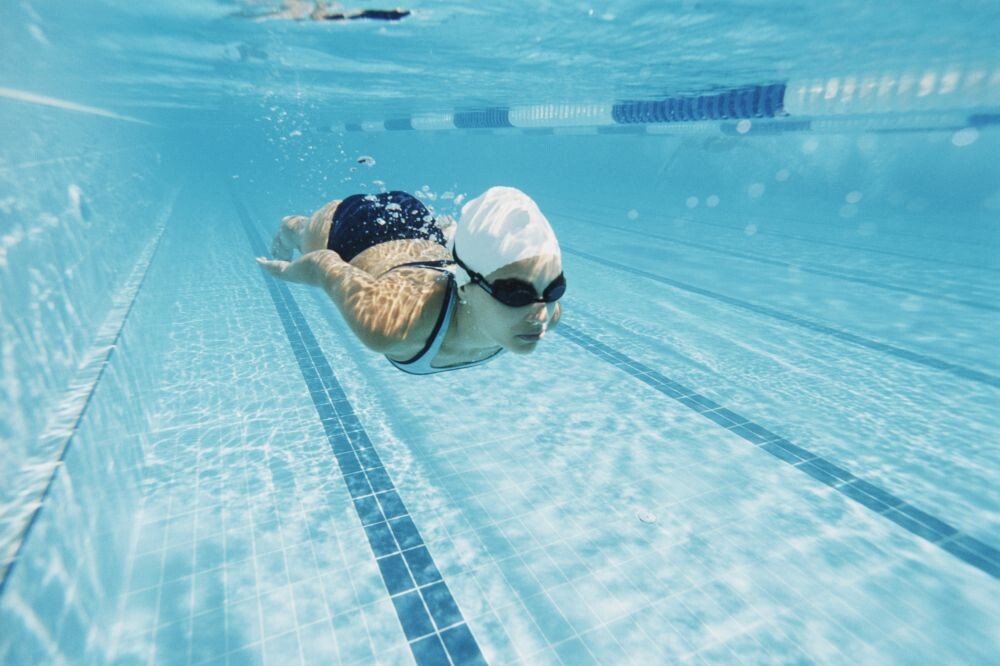
This, Andersen says, will vary from runner to runner, and will depend on several factors, including what kind of race you’re training for, what your cross-training is like and how your body is feeling. “It is very contextual and individualistic,” he says. “For some people, one week of downtime is plenty. Others need a couple of weeks to a month of downtime before ramping back up into training.”
He notes that even two-time Olympic champion and former world record-holder Eluid Kipchoge takes it easy for about a month following a big goal marathon.
Should you run during your downtime?
Again, this depends. Andersen says the important thing is that runners keep moving during their downtime, since not moving can lead to tendon issues and other injuries when you start running again. Being too sedentary during downtime is one of the biggest mistakes he sees runners make.
“It will shock the system when you return to run,” he says. “Think of a gas fireplace. You leave the pilot on for most of the year, so when you need to turn up the heat, you are able to do it seamlessly and quickly, usually with no issues.” Turning that pilot off for too long, on the other hand, can lead to trouble.
He encourages runners to incorporate cross-training to maintain some base fitness during their downtime, such as cycling, pool running, swimming, cross-country skiing or using the elliptical. “This takes some of the impacts off the body, but also ensures you are keeping your muscles and tendons active, so there isn’t a shock when you return to running,” he says.
This doesn’t mean you can’t do any running at all during your downtime. If you’re taking more than one week off training, Andersen says you can incorporate one or two short, easy runs per week to keep your body used to the impact of running. “If someone is taking three weeks of downtime, the first week off I may suggest running once, the second week two or three times, and the third, three or four runs, with some easy elliptical and biking mixed in during each of those weeks,” he says.
You can also try participating in other sports during your downtime, which can help you develop skills that will make you a better runner, such as explosiveness, mobility and stability. Just be careful that you don’t get injured playing a different sport if you have a big running goal on the horizon.
The bottom line
Taking downtime to allow your body to rest and recover is an important part of your training plan and shouldn’t be neglected. As long as you continue moving and then return to running gradually so your body has time to adjust, a little time off will make you a better runner.
by Brittany Hambleton
Login to leave a comment
Bullish Kelvin Kiptum wants a duel with Eluid Kipchoge at Paris Olympic Games
After his exploits at the Chicago Marathon, Kelvin Kiptum is considering competing at the Olympic Games where he will face off against Eliud Kipchoge.
After his jaw-dropping performance that saw him break the world record at the Chicago Marathon, Kelvin Kiptum has now confirmed that the Olympic Games are on his mind.
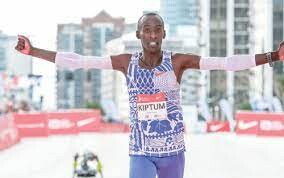
The 23-year-old clocked 2:00:35 to completely destroy Eliud Kipchoge’s world record time of 2:01:09 and he is not resting on his laurels.
His focus has now shifted to the Olympic Games in Paris, France where he will lock horns with five-time Berlin Marathon champion, Kipchoge.
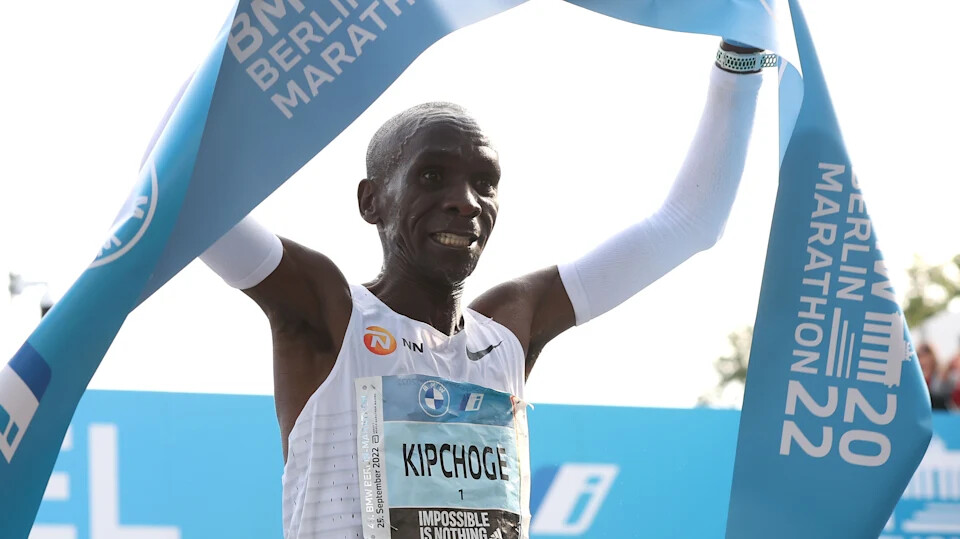
Speaking during a post-race interview, the reigning London Marathon champion said: “Yes, the Olympic Games are on my mind. I think this win has placed me in a better position ahead of the global showpiece.”
Kiptum added that he is not aware of the selection criteria and he will have to get back to the country and discuss it with his management first. However, he is planning on resting first before resuming training ahead of next season.
If it happens, the race will definitely be one to remembered since Kipchoge will be bidding to become the first man to win the Olympic title in the marathon three times.
He has not had a great 2023 season and will be plotting a comeback next year. The 38-year-old started off with the Boston Marathon where he finished sixth due to a problem with his left leg.
He then proceeded to the Berlin Marathon with the hope of breaking his own world record but he did not achieve the target.
Meanwhile, Kiptum has enjoyed a blissful season, winning the London Marathon earlier this year and winning the Chicago Marathon in a world record time to end his season with a bang.
He made his debut at the Valencia Marathon last year and ran the fastest debut time in history.
by Abigael Wuafula
Login to leave a comment
Paris 2024 Olympic Games
For this historic event, the City of Light is thinking big! Visitors will be able to watch events at top sporting venues in Paris and the Paris region, as well as at emblematic monuments in the capital visited by several millions of tourists each year. The promise of exceptional moments to experience in an exceptional setting! A great way to...
more...How to train your mind like an elite athlete
What separates an elite athlete from the rest of us? Most people will argue they have a superhuman-like level of physical superiority that is unattainable for the average Joe. While it is true that most of us will never reach the levels of success of Eluid Kipchoge or Paula Radcliffe, there is one way we can be more like our running heroes–our mental game. In 2019, the Canadian non-profit Own the Podium gathered six elite sports psychologists to scour the current sports psychology research. They developed “The Gold Medal Profile for Sport Psychology” and published it in The Journal of Applied Sports Psychology. Want to know how to improve your mental game? We’ve broken down their findings here.
The mental elite
Yes, elite athletes are blessed with physical gifts that the rest of us don’t have. But that isn’t the only reason they’re successful. It’s their natural ability combined with their obsessive passion for practising and improving that has allowed them to rise above their peers and reach the highest level of sport. But how do these athletes stay so dedicated, even when things aren’t working out in their favour? How do they always seem to push through and carry on, no matter how tough a practice or competition gets?
The psychologists interviewed by Own The Podium have come up with 11 mental skills that the elites have mastered, broken down into three categories: fundamental skills, self-regulation skills and interpersonal skills. Olympic podiums may not be in your future, but improving these mental skills may help you snag that new PB or age-group podium you’re after.
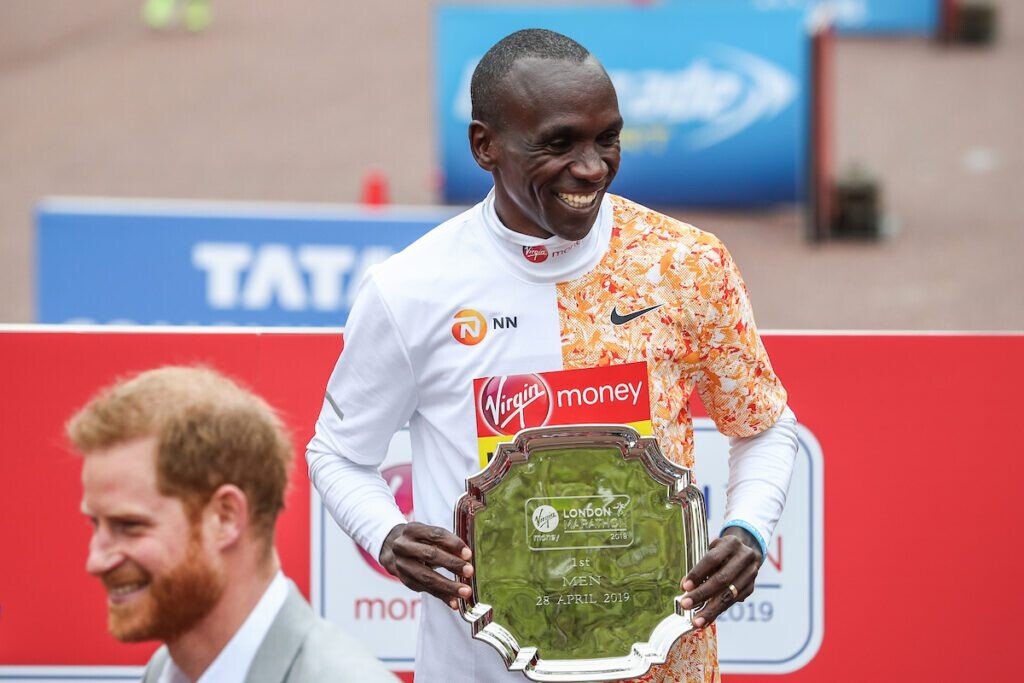
Fundamental skills
The psychologists deemed these skills as the most important, which is why they’re in the gold category.
Motivation: In particular, intrinsic motivation, which comes from within, rather than being dictated from someone or somewhere else. Intrinsic motivation results when someone has high levels of competence, relatedness and autonomy–i.e., they’re good at them and want to perform well for the sake of performing well, rather than for accolades or medals (even though those are usually be present also).
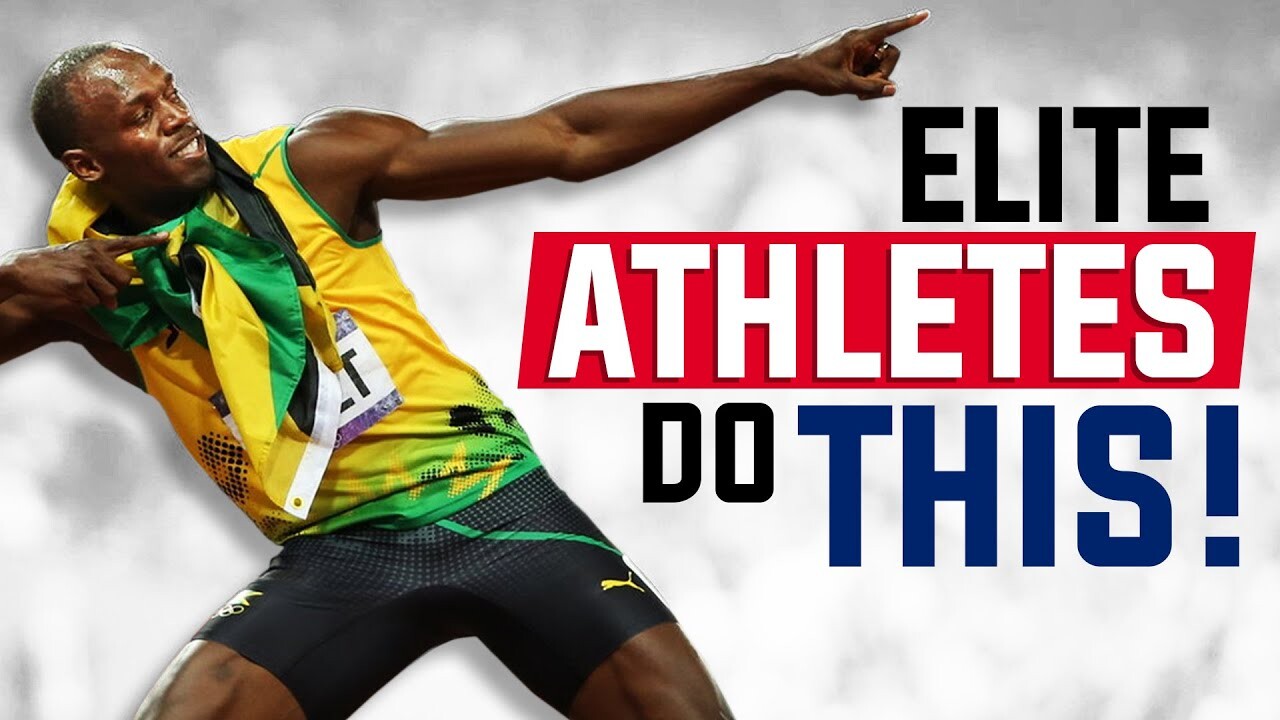
Confidence: You can watch countless interviews with athletes who have finally reached a career-long goal, and they all say something along the lines of: “I just knew I had it in me, I knew I could do it if I just kept at it.” If you believe you will achieve something, you’re much more likely to do so.
Resilience: Remember when Evan Dunfee made a heroic push to go from fifth to third in the final stretch of the men’s 50K race walk at the 2021 Olympics? Most of us would’ve counted ourselves out, but he didn’t. How many times have you watched an athlete fall in the first lap of a race, only to get up and storm back to take the win? Things don’t always go perfectly, but an athlete who can deal with and rise above adversity will always have the advantage.
Fundamental skills for recreational runners:
Don’t shy away from a challenge
Find a group to train with and keep you motivated
Believe in your ability to achieve your goal
Don’t throw in the towel just because conditions aren’t perfect or you encounter an injury or other setback
Self-regulation skills
These are in the silver category, and involve your ability to manage your thoughts and emotions in a way that helps (rather than hinders) achievement. They include mastering things like self-awareness, stress management, emotion and arousal regulation and attention control.
Self-regulation skills for recreational runners
Figure out what kind of psychological state you need to be in to perform well, and how “pumped up” you need to be before a workout or competition
Work on looking inwardly and understanding where you’re at psychologically at any given moment, so you can assess whether you’re “in the zone” or not
Figure out what tools you need (like deep breathing, upbeat music, etc.) to get yourself ready for competition
Practise focusing your attention on your body and its cues and filtering out distractions
Interpersonal skills
These are in the bronze category and describe how you deal with other people, like coaches, teammates and other competitors. They include aspects such as the athlete-coach relationship, leadership, teamwork and communication.
Interpersonal skills for recreational runners
Build yourself a good support system–get a coach or a dedicated running buddy, or join a running club
Communicate effectively with your coach or running friends. A good coach or running group can help you troubleshoot problems when you’re in a training rut.
Login to leave a comment
Eliud Kipchoge says he is determined to keep on writing history — and secure a third Olympic marathon crown next year
Eliud Kipchoge is widely regarded as the greatest marathon runner of all time has set himself many challenges in his dazzling career, and remains insatiable despite his two Olympic titles, his world record of 2:01:09 in Berlin in 2022 and an incredible 15 wins in 18 marathons he has entered.
He broke the mythical two-hour barrier over the 26.2 mile (42.195 kilometre) distance in Vienna in 2019, with a time of 1:59:40, but the feat was not recognised as an official world record as it was not in open competition.
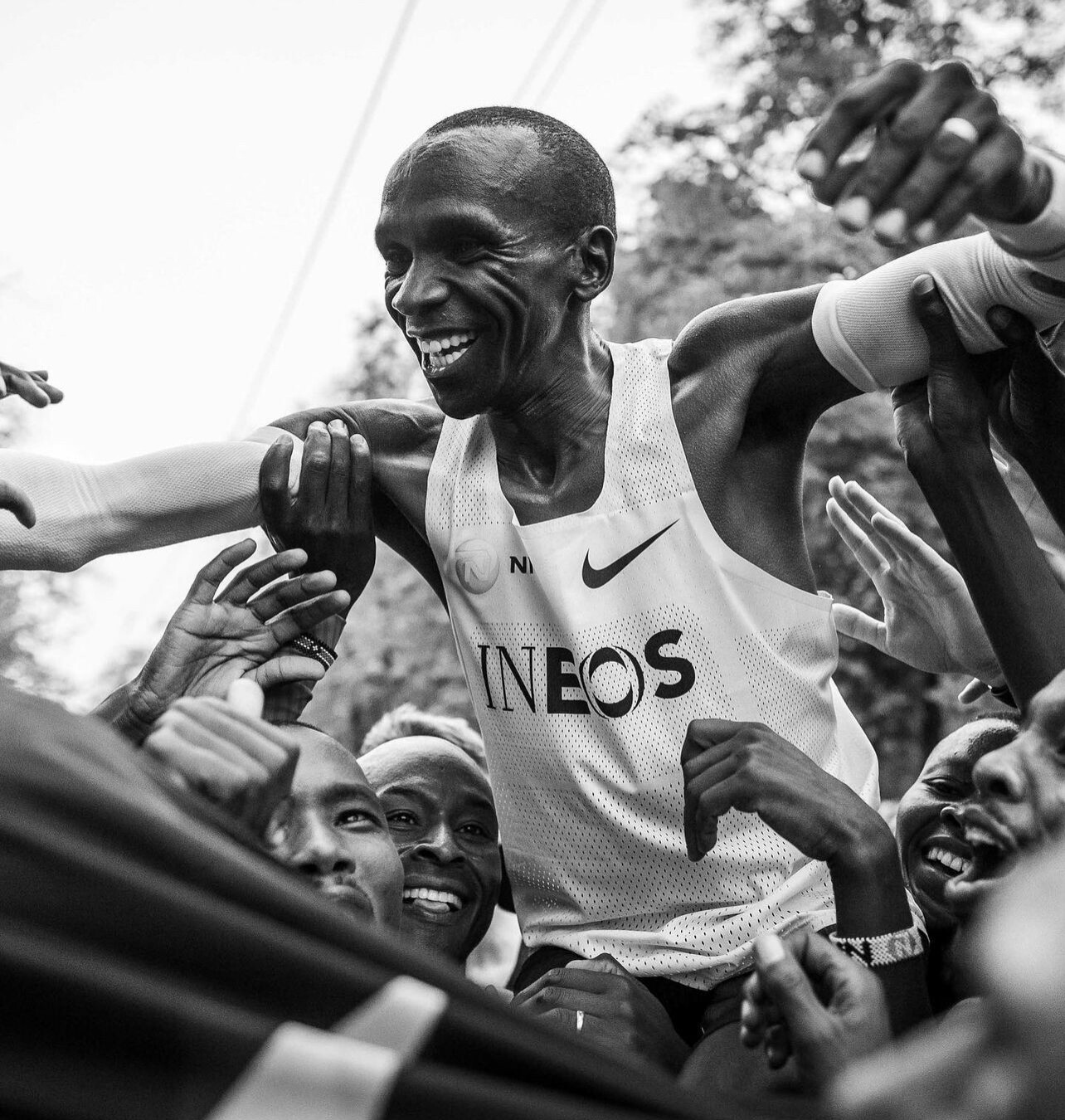
Victory has eluded the 38-year-old in the Boston and New York marathons, which if he won would make him the first man to have all six major titles under his belt.
"The priority now is to focus on the Olympics and win a third time. The other (challenges) will come later," Kipchoge says in an interview with AFP at the renowned Kaptagat training camp in Kenya's Rift Valley.
His two Olympic marathon gold medals in 2016 and 2021 put him at level pegging with Ethiopia's Abebe Bikila (1960, 1964) and Waldemar Cierpinski of East Germany (1976, 1980).
A third gold at the Paris Olympics in 2024 would make Kipchoge the undisputed marathon giant at the Games, and bring him a victory steeped in symbolism.
The French capital was the city where he won his first international crown in 2003 at the age of 18, clinching the 5,000 metres world championship title ahead of sporting legends Hicham El Guerrouj of Morocco and Ethiopia's Kenenisa Bekele.
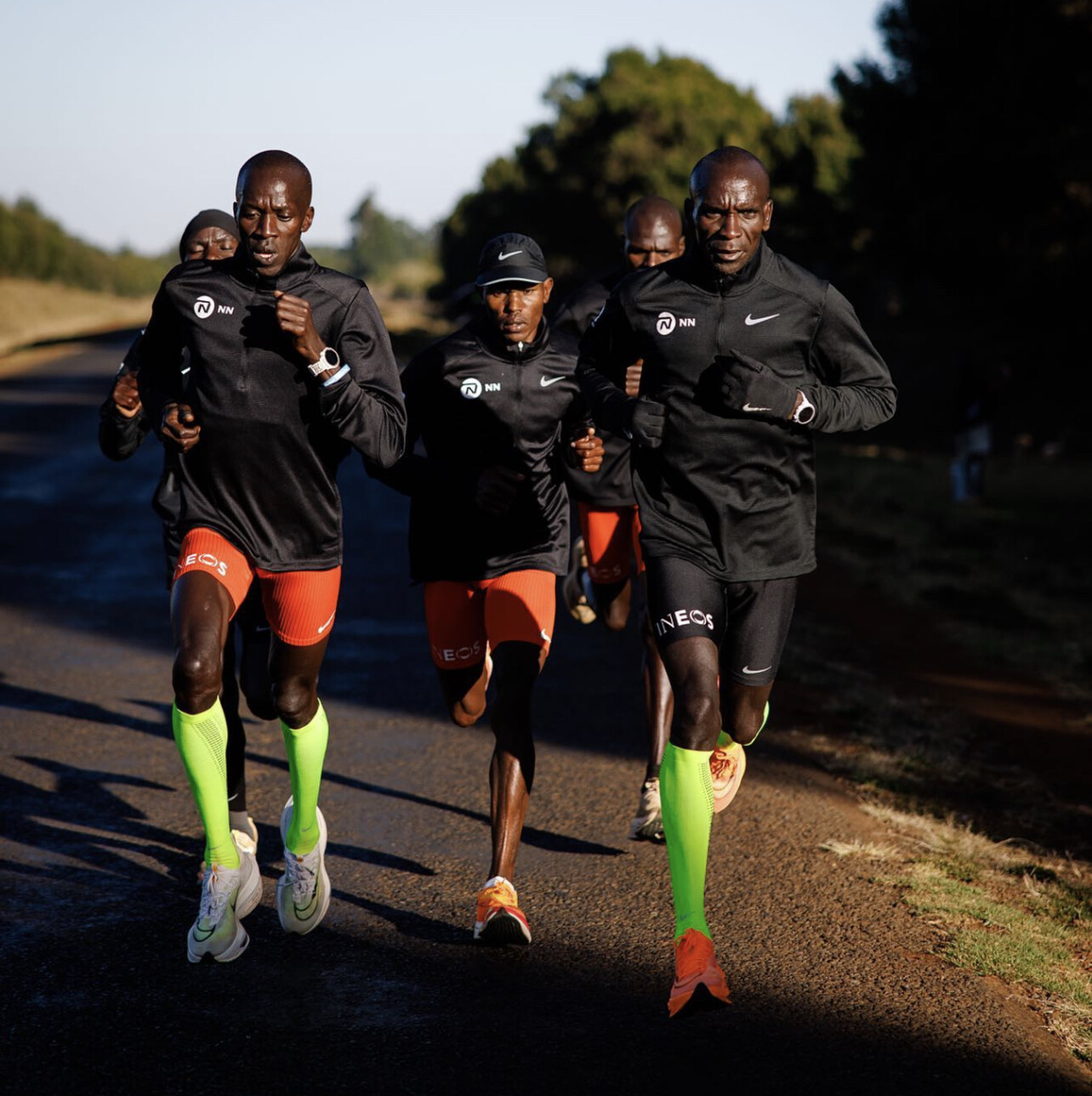
However, Kipchoge does not rule out giving up on his other goals.
"If time comes in to hang the racing shoes, I will say bye to other big things in sport."
'I know myself'
Sitting on a shaded bench in the Kaptagat camp where he has lived and trained for several months a year for 20 years, Kipchoge looks back on his poor showing in Boston on April 17, where he dropped from the lead group in the 30th kilometre and ended up finishing sixth.
This rare failure dampened his spirits.
"I'm trying to forget what has happened in Boston. It's caught in my mind... but I believe that what has passed has passed."
With his lifelong coach Patrick Sang, he has analysed the reasons for his disappointing performance, saying "it's mostly the hamstring".
He brushes aside concerns about his difficulties on hilly courses such as Boston and New York and which will also confront him in Paris.
"It is not really a concern, but I respect everybody's thoughts," he says. "I think it was a bad day and every day is a different day. I'm looking forward for next year.
"Everybody can write anything, you have no control. But I know myself."
'Want to be an inspiration'
Kipchoge is now preparing for his final marathon of the year.
"I'm doing well. My training is going on in a good way," he says.
But he has not yet disclosed which event it will be — Berlin on September 24, Chicago on October 8 or New York on November 5.
"At the end of July, I will know where to go."
He is following his usual training programme, eating up more than 200 kilometres a week on the red dirt tracks of Kaptagat forest, 2,400 metres above sea level.
Among his 20-odd training partners at the camp at the time of the AFP interview were Kenya's new 1,500m and 5,000m world record holder Faith Kipyegon and two-time New York marathon winner Geoffrey Kamworor.
As the respected dean of Kenyan athletics, Kipchoge is happy to see the emergence of 23-year-old compatriot Kelvin Kiptum, who won the London Marathon in April in 2:01:25, the second fastest time in history and just 16 seconds away from his own world record.
"I want to be an inspiration and I trust my breaking the world record twice is an inspiration to many young people. I trust they will want more and even beat my records."
'Prioritise drugs tests'
But in a country where athletics has become tainted by large-scale drug use, Kipchoge laments that "many people are going into shortcuts to advance".
"I think doping is there... It's all more about getting rich."
Kipchoge says the authorities should prioritise testing for performance-enhancing substances, saying it was much more important than education "because everybody who is doing doping knows what is going on".
"Just pump everything in testing, put testing as a first priority and all will be well," he says.
"The moment we prioritise testing and we register those who are handling the athletes across the country, we have the right data to know who is who in the whole country.
"But if we really ignore the people who are working with athletes and athletes themselves, then we are in danger."
Login to leave a comment
Eliud Kipchoge shed some light on what happened in his Boston Marathon debut
More than a day after he finished sixth in his first Boston Marathon, Eliud Kipchoge sat down to answer a few questions.
Kipchoge, the 38-year-old marathon world record holder, had only lost two of his 17 career marathons prior to Monday. So it was surprising to see him struggle to answer the acceleration of Gabriel Geay during Mile 18 of the race. He then fell to the back of the pack and was subsequently dropped by the race leaders by Mile 21.
Kipchoge acknowledged that he had an issue with his upper left leg that began during Mile 18.
“That’s where the problem is,” Kipchoge told reporters on Wednesday. “I tried to do what was necessary, but it was not working.”
“I’m not a doctor,” he later joked when asked for more specifics.
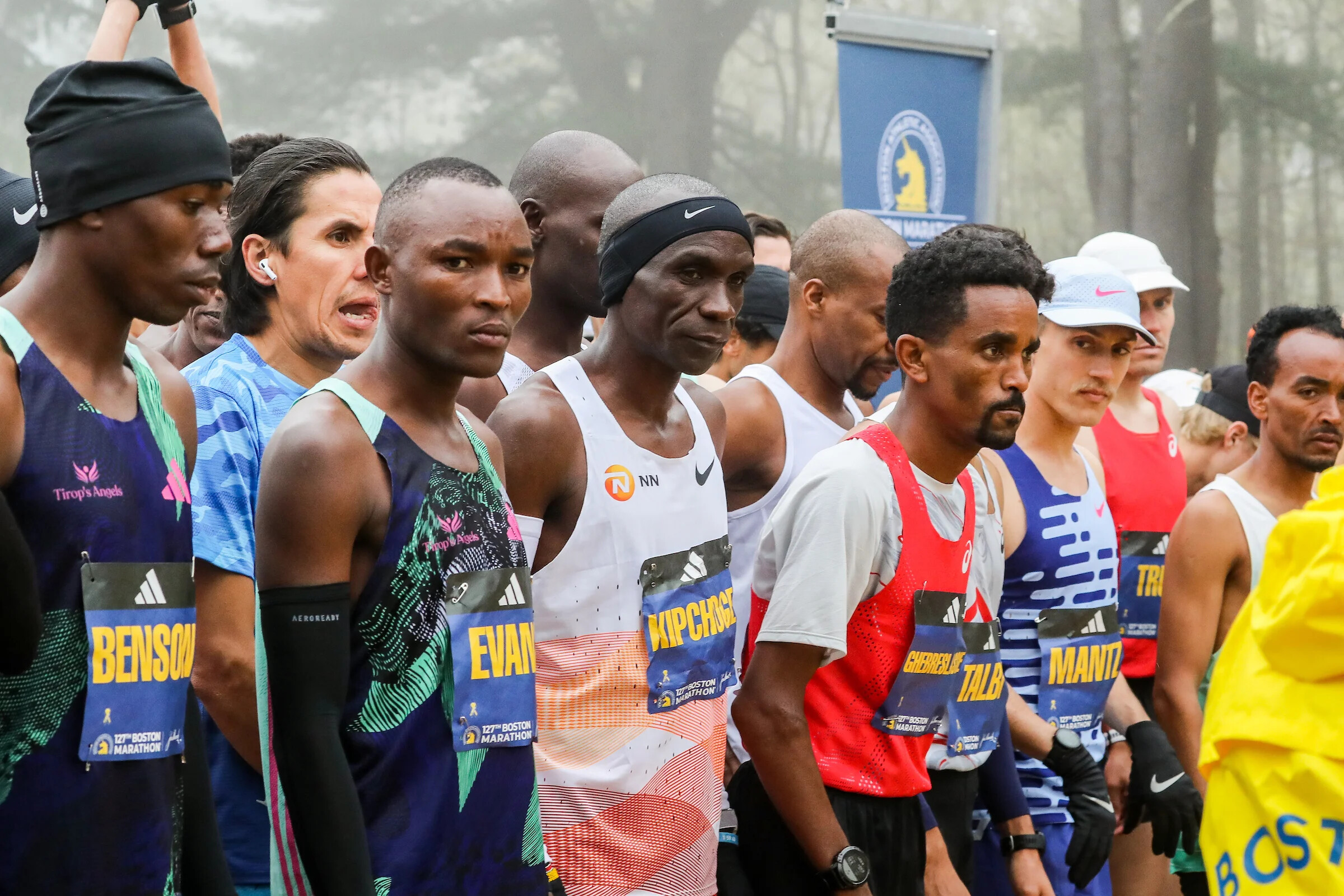
Having encountered the issue mid-race, he said that he simply “put my mind just to run in a comfortable pace to finish.”
Asked if he considered dropping out once he experienced an issue with his leg, Kipchoge admitted that “a lot of talking was going on in my mind.”
“But I said, ‘Hey, I can’t quit.’ They say it’s important to win, but it’s great to participate and finish.”
Given that he started confidently — leading the pack of elite runners for nearly all of the opening 17 miles — Kipchoge responded to a question about whether he had been tactically too aggressive in the early part of the race.
“This is sport, and you need to push,” he replied.
As for what’s next on his agenda, the Kenyan acknowledged that he will take some time to think things over. His main focus in the short term is to “recover, both mentally and physically.”
Despite the differences between Boston’s course — with its continuous elevation changes — and others that he’s run, which have generally been much more flat, Kipchoge also downplayed its effect on how he ran.
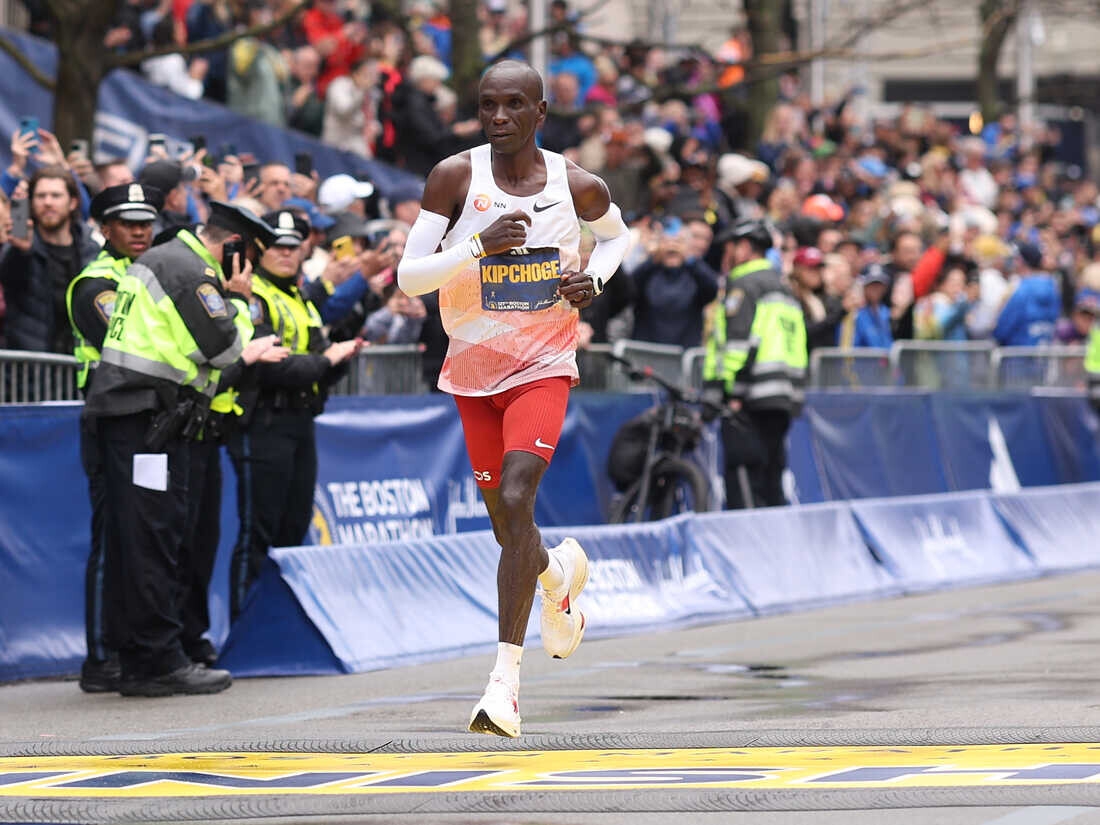
Though his debut in Boston didn’t go to plan, he said he would “absolutely” consider returning to run again. However, this will likely not be in 2024 since Kipchoge will probably aim to run in the Paris Olympics, which will take place too close to Boston’s April schedule for him to be at his fitness peak. He is the two-time defending Olympic gold medalist.
Kipchoge also released a statement following the race on Monday in which he congratulated eventual winner (and fellow Kenyan) Evans Chebet.
“I live for the moments where I get to challenge the limits. It’s never guaranteed, it’s never easy,” Kipchoge said. “Today was a tough day for me. I pushed myself as hard as I could but sometimes, we must accept that today wasn’t the day to push the barrier to a greater height.
“I want to congratulate my competitors and thank everyone in Boston and from home for the incredible support I am so humbled to receive,” he added. “In sports you win and you lose and there is always tomorrow to set a new challenge. Excited for what’s ahead.”
by Hayden Bird
Login to leave a comment
Boston Marathon
Among the nation’s oldest athletic clubs, the B.A.A. was established in 1887, and, in 1896, more than half of the U.S. Olympic Team at the first modern games was composed of B.A.A. club members. The Olympic Games provided the inspiration for the first Boston Marathon, which culminated the B.A.A. Games on April 19, 1897. John J. McDermott emerged from a...
more...Eliud Kipchoge is human afterall
Eliud Kipchoge came to Boston seeking to add the world’s most storied annual marathon to his unrivaled trophy case. He will leave with a sixth-place result and questions about whether he can achieve two outstanding, unprecedented goals.
“I live for the moments where I get to challenge the limits,” was posted on Kipchoge’s social media four hours after he finished. “It’s never guaranteed, it’s never easy. Today was a tough day for me. I pushed myself as hard as I could but sometimes, we must accept that today wasn’t the day to push the barrier to a greater height.”
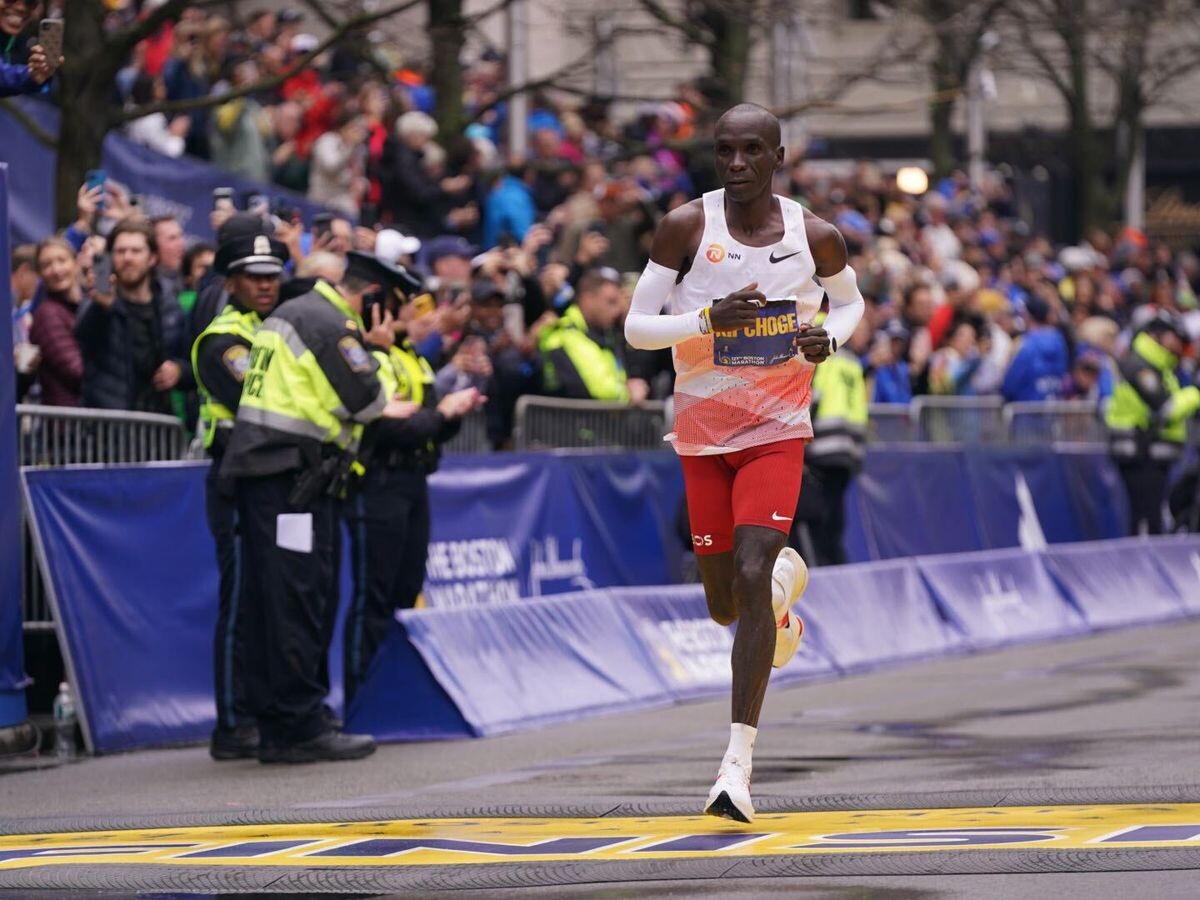
Kipchoge was dropped in the 19th mile in his Boston Marathon debut in the middle of the race’s famed hills. He finished 3 minutes, 29 seconds behind fellow Kenyan Evans Chebet, who clocked 2:05:54 and became the first male runner to repeat as Boston champion since 2008.
“I did not observe Kipchoge,” Chebet said of what happened, according to the Boston Athletic Association. “Eliud was not so much of a threat because the bottom line was that we trained well.”
It marked just Kipchoge’s third defeat in 18 career marathons, a decade-long career at 26.2 miles that’s included two world record-breaking runs and two Olympic gold medals.
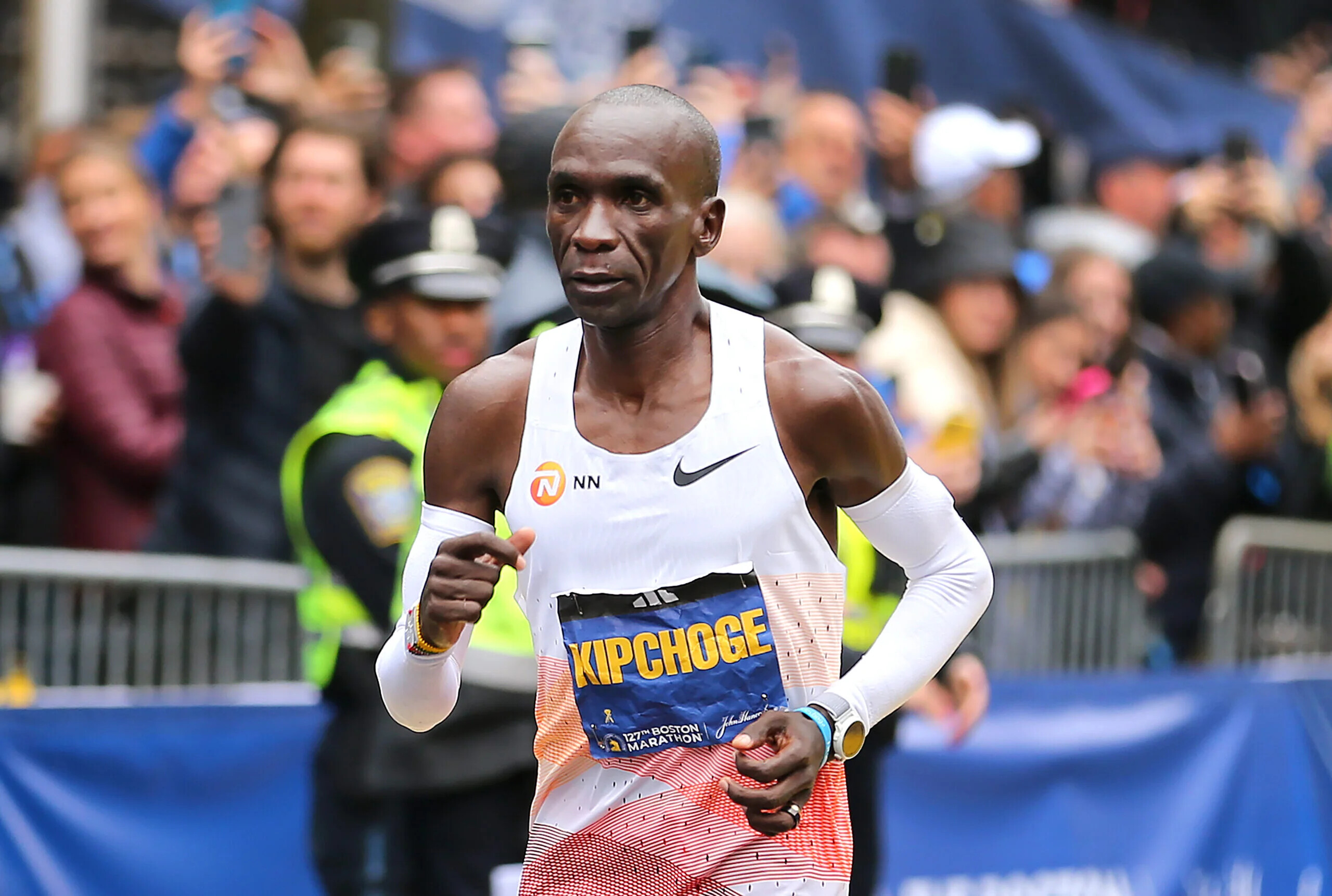
Kipchoge, 38, hopes next year to become the first person to win three Olympic marathons, but major doubt was thrown on that Monday, along with his goal to win all six annual World Marathon Majors. Kipchoge has won four of the six, just missing Boston and New York City, a November marathon that he has never raced.He skipped his traditional spring marathon plan of racing London to go for the win in Boston, the world’s oldest annual marathon dating to 1897.
Kipchoge has yet to speak to media, but may be asked whether a failed water bottle grab just before he lost contact with a leading pack of five contributed to his first defeat since he placed eighth at the 2020 London Marathon. Boston’s weather on Monday, rainy, was similar to London in 2020.
Kipchoge’s only other 26.2-mile loss was when he was runner-up at his second career marathon in Berlin in 2013.
He is expected to race two more marathons before the Paris Games. Kipchoge will be nearly 40 come Paris, more than one year older than the oldest Olympic champion in any running event, according to Olympedia.org. Kenya has yet to name its three-man Olympic marathon team.
“In sports you win and you lose and there is always tomorrow to set a new challenge,” was posted on Kipchoge’s social media. “Excited for what’s ahead.”
Kenyan Hellen Obiri won Monday’s women’s race in 2:21:38, pulling away from Ethiopian Amane Beriso in the last mile.
Obiri, a two-time world champion and two-time Olympic medalist in the 5000m on the track, made her marathon debut in New York City last November with a sixth-place finish. She was a late add to the Boston field three weeks ago after initially eschewing a spring marathon.
“I didn’t want to come here, because my heart was somewhere else,” said Obiri, who is coached in Colorado by three-time U.S. Olympian Dathan Ritzenhein. “But, my coach said I should try and go to Boston.”
Emma Bates was the top American in fifth in the second-fastest Boston time for an American woman ever, consolidating her status as a favorite to make the three-woman Olympic team at next February’s trials in Orlando. Emily Sisson and Keira D’Amato, who traded the American marathon record last year, didn’t enter Boston.
“I expected myself to be in the top five,” said the 30-year-old Bates, who feels she can challenge Sisson’s American record of 2:18:29, if and when she next races on a flat course.
The next major marathon is London on Sunday, headlined by women’s world record holder Brigid Kosgei of Kenya, Tokyo Olympic champion Peres Jepchirchir of Kenya and Olympic 5000m and 10,000m champion Sifan Hassan of the Netherlands in her 26.2-mile debut.
by Olympic Talk
Login to leave a comment
Boston Marathon
Among the nation’s oldest athletic clubs, the B.A.A. was established in 1887, and, in 1896, more than half of the U.S. Olympic Team at the first modern games was composed of B.A.A. club members. The Olympic Games provided the inspiration for the first Boston Marathon, which culminated the B.A.A. Games on April 19, 1897. John J. McDermott emerged from a...
more...The Kenyan Athletics Training Academy in Thika just launched today the KATA hunger project helping potential pro runners from poor families
KATA (Kenyan Athletics Training Academy) announced today (Oct 4, 2022) it has launched a new project. The KATA Hunger Project is going to help potential Pro runners from poor families. Additionally the project will help struggling women farmers to be better more efficient farmers year around.
"Our Kenya Fresh Farm Hunger Project (KATA Hunger Project) is going to provide 8.8 pounds (four kilos) of home-grown fresh fruits and vegetables weekly to Kenyans in Need for 13 weeks," says KATA director Bob Anderson, MBR publisher and founder of Runner's World Magazine (1966-1984).
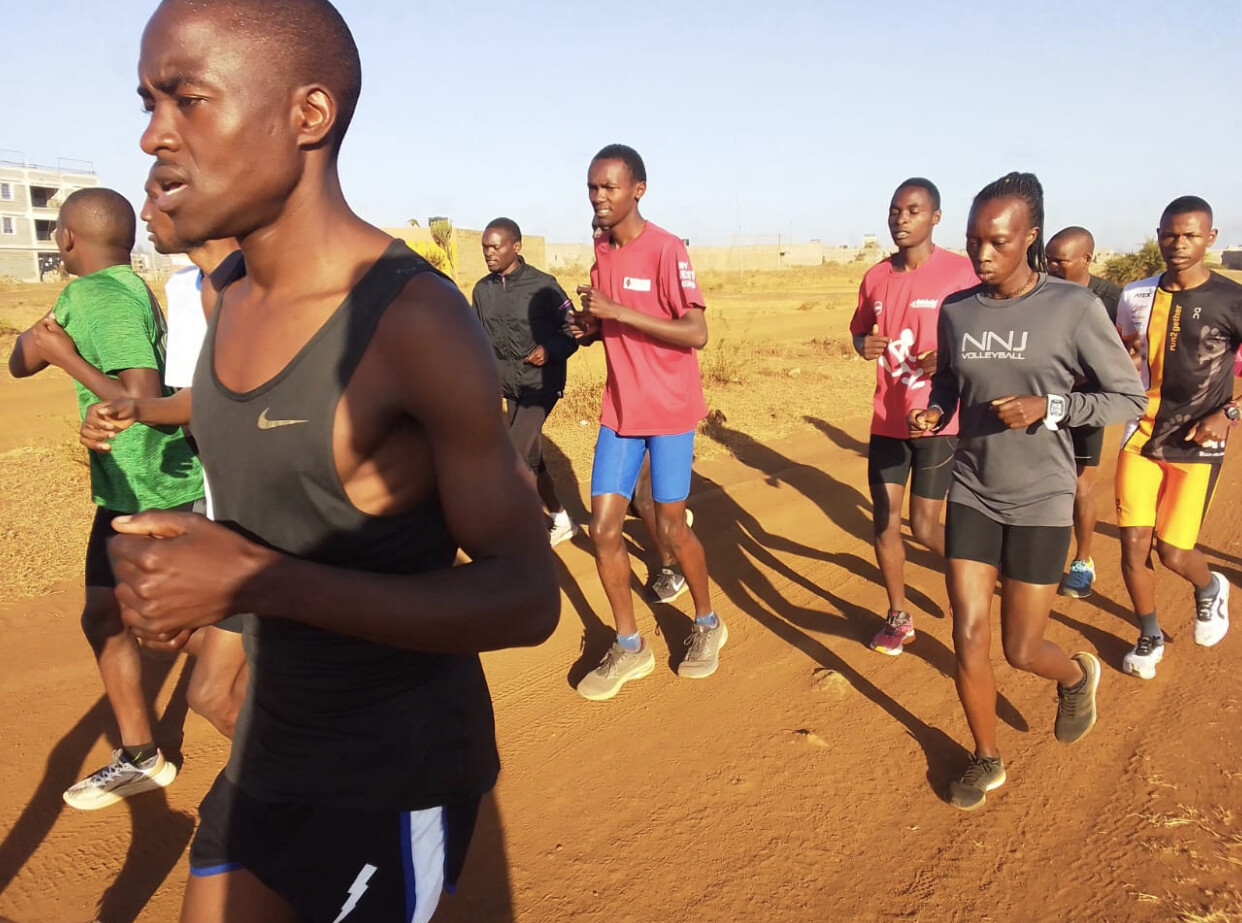
Bob and his wife Catherine built and financed the Kenya Athletics Training Academy located in Thika Kenya. The 23- room academy was officially opened Sept 4, 2021.
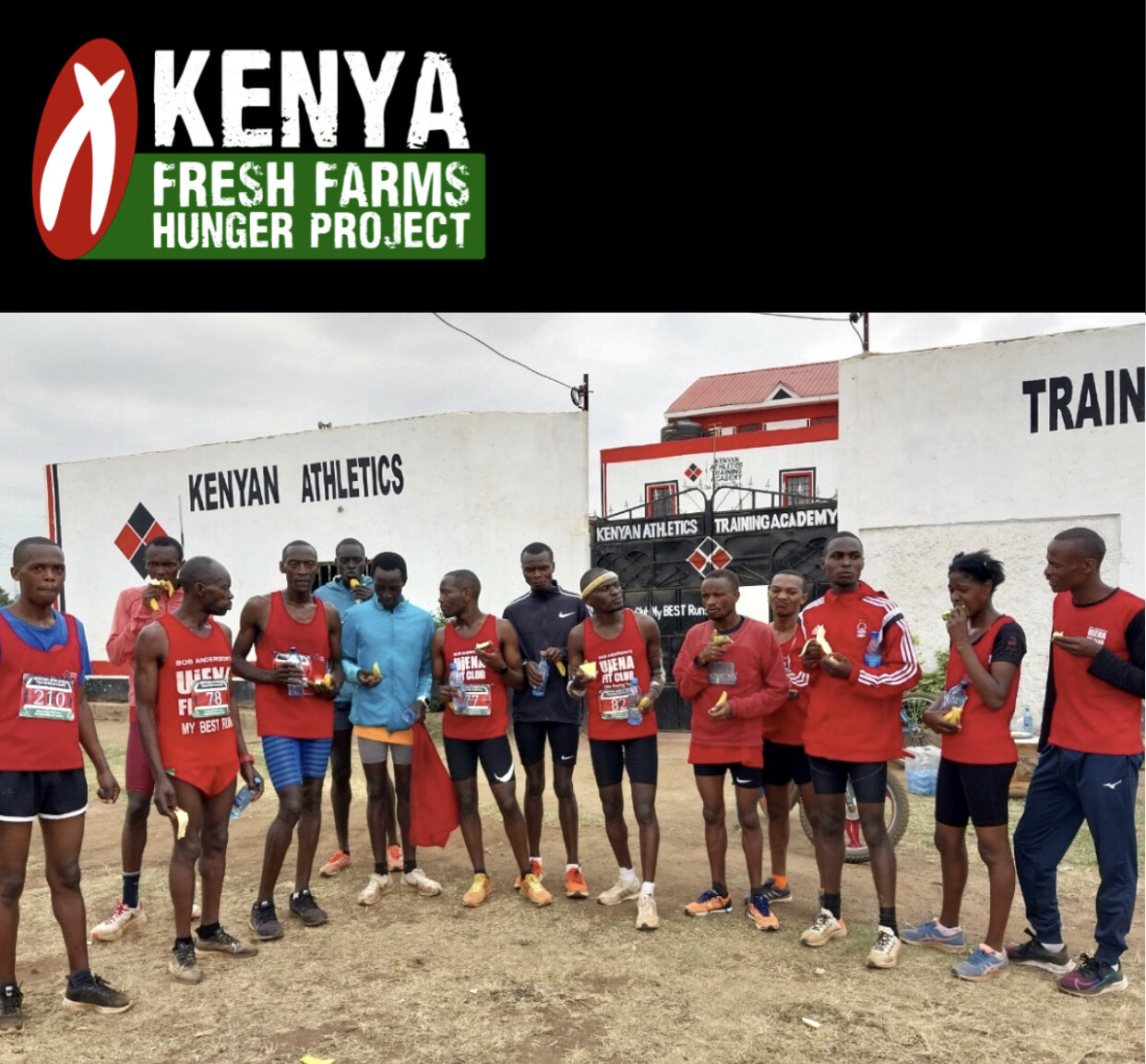
KATA is a one-of-a-kind facility and its focus is on training runners to become pro runners. KATA does not manage runners and does not ask its athletes to share any of their prize money.
Kenyan athletes are not charged to live, eat and train at KATA. "We mostly seek out runners who need our help," says head coach Joseph Ngure, a senior coach with over 30 years of experience.
As an example, Peter Njeru Mwaniki was one of the first potental pro runners who came to KATA for help. His family did not believed he could make distance running a career. They basically kicked him out of their house. He then moved in with his brother but that was not working either.
“He had run a 32:30 10k but his hope of making a career out of running was slim," says coach Joseph. "We took him in, feed him and trained him. Within just a few weeks we knew he had great potential."
On Oct 2, 2022 Peter won the Telesia half marathon in Italy clocking 1:00:29. It was a good pay day for Peter and his new KATA family made it happen for him. "We are very proud of Peter and all our KATA athletes," says Bob.
"It would be almost impossible to train hard without enough to eat," says KATA manager Florence Kimiti, as a junior ran 1:59 for 800m. "A 32:30 10k is not bad for a recreational runner but not for a pro runner. A lot of Kenyans make a living from distance running, the most famous being Eluid Kipchoge who is making millions for his efforts. He is our hero. The goat."
Peter will be running several more races in Italy before coming back to KATA to keep up his training and to help support our Kenya Fresh Farms Hunger Project.
"All KATA athletes staying at our academy put in 20 hours per week of work," says operations manager Elam Wangwero, a top runner himself and who have known Bob and Catherine since 2014.
"The work might be cleaning, painting, working on My Best Runs website (posting results, checking links, photos, etc) and now KATA Hunger Project. But of course the training always comes first along with three meals daily."
"It seems to me that doing something other can training, eating and sleeping is helping our athletes run so well," says Bob. "So much of running is mental and you need a sharp mnd."
"Without the support of KATA,"wrote Peter from Italy, "my dream would not have come true. I am feeling the happiest ever. I never thought of running such a time at this age."
The KATA Hunger Project was officially started August 1, 2022 but unofficially started in 2020. "Since we are going to provide home-grown fresh fruits and vegetables for our potential pro runners we needed to set up our own farm," says Florence.
Bob leased two acres of land outside of Embu on August 1. It was idle land but it did have 40 fruits trees (banana and mango) that just needed care. Additional land can be easily leased when needed.
Vegetable beds at KATA's Fresh Farm have already been planted. "We dug a well for water, we set up solar and are building a barn, thanks to Brock Hinzmann (2:19 marathoner back in the 80’s and 90’s) contribution," says Florence.
Runners can also train with the team by just coming to KATA and soon other locations. And when approved, will be given four kilos of Fruits and vegetables at the end of the week starting Dec 23. After or during the 13-week program the athletes with the most potential will be asked to live at KATA at no expense for them.
Potential pro runners outside of Kenya will be able to join the program starting November 1, 2022. "Our guest runners will receive all the benefits as our Kenyan athletes," says Bob. "Same food, same training, same duties with one difference. Our guests can have their own room."
Minimum stay is one month. Cost which covers everything is $1000 not including airline ticket and visa.
"A single month is not a lot of time," says coach Joseph, "but at least you will see what we do here. Our program is more than going for runs and doing some speedwork. We can get you ready to set new PR's."
"Our KATA Hunger Project is a keeper. We want to reach a lot of Kenyans in need but we need your help," says Catherine. "This is how the program works: for every one US dollar contributed, one pound of home-grown Fresh fruits and vegetables will be provided to a Kenyan in Need. 8.8 pounds weekly."
"There is so much talent here in Kenya," says Elam. "I am glad Bob and Catherine have set up these programs.
by Lisa Wall
Login to leave a comment
Kenenisa Bekele set new Marathon World Record for Masters but says he can run faster
Kenenisa Bekele made headlines last week by declaring “of course I am the best” long distance runner ever. But the Ethiopian was fifth-best at Sunday’s London Marathon, finishing 74 seconds behind Kenya’s Amos Kipruto.
Bekele, 40, clocked 2:05:53, the fastest-ever marathon by a runner 40 years or older. He was with the lead pack until being dropped in the 21st mile.
But Bekele estimated he could have run 90 to 120 seconds faster had he not missed parts of six weeks of training with hip and joint injuries.
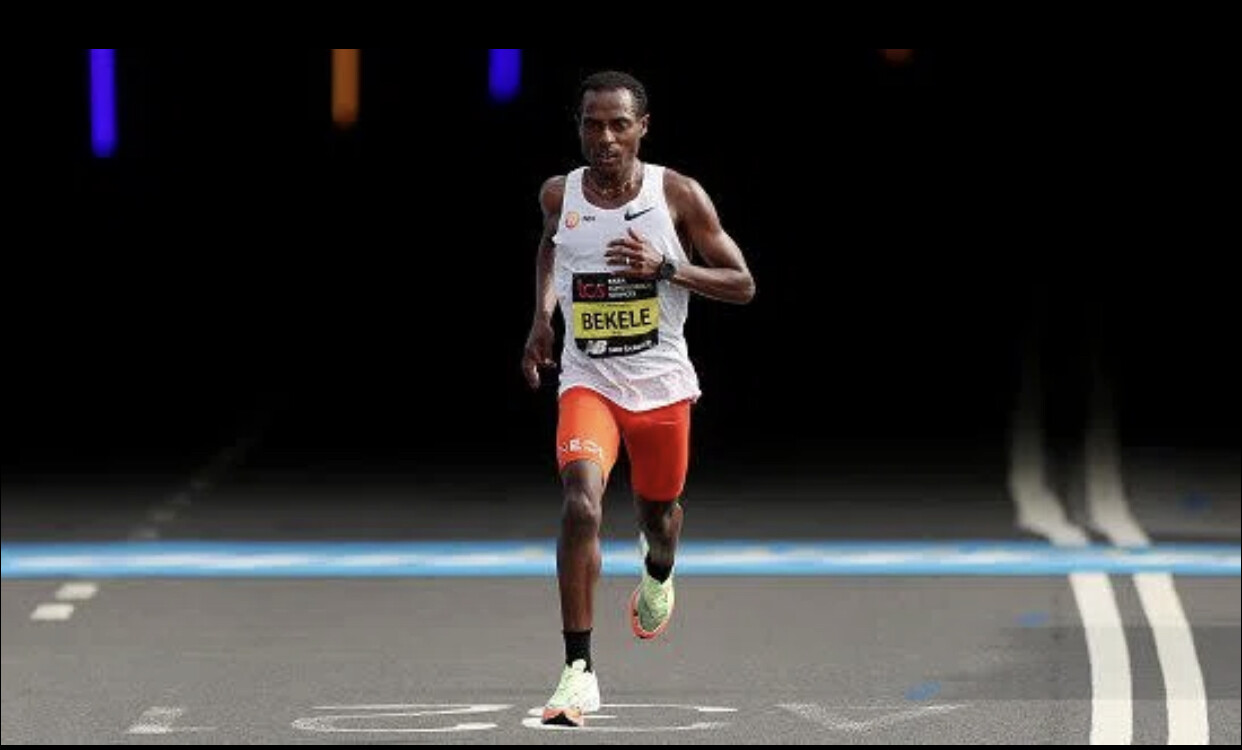
“I expect better even if the preparation is short,” he said. “I know my talent and I know my capacity, but really I couldn’t achieve what I expect.”
Bekele is the second-fastest marathoner in history behind Kenya’s Eliud Kipchoge, who broke his own world record by clocking 2:01:09 at the Berlin Marathon last week.
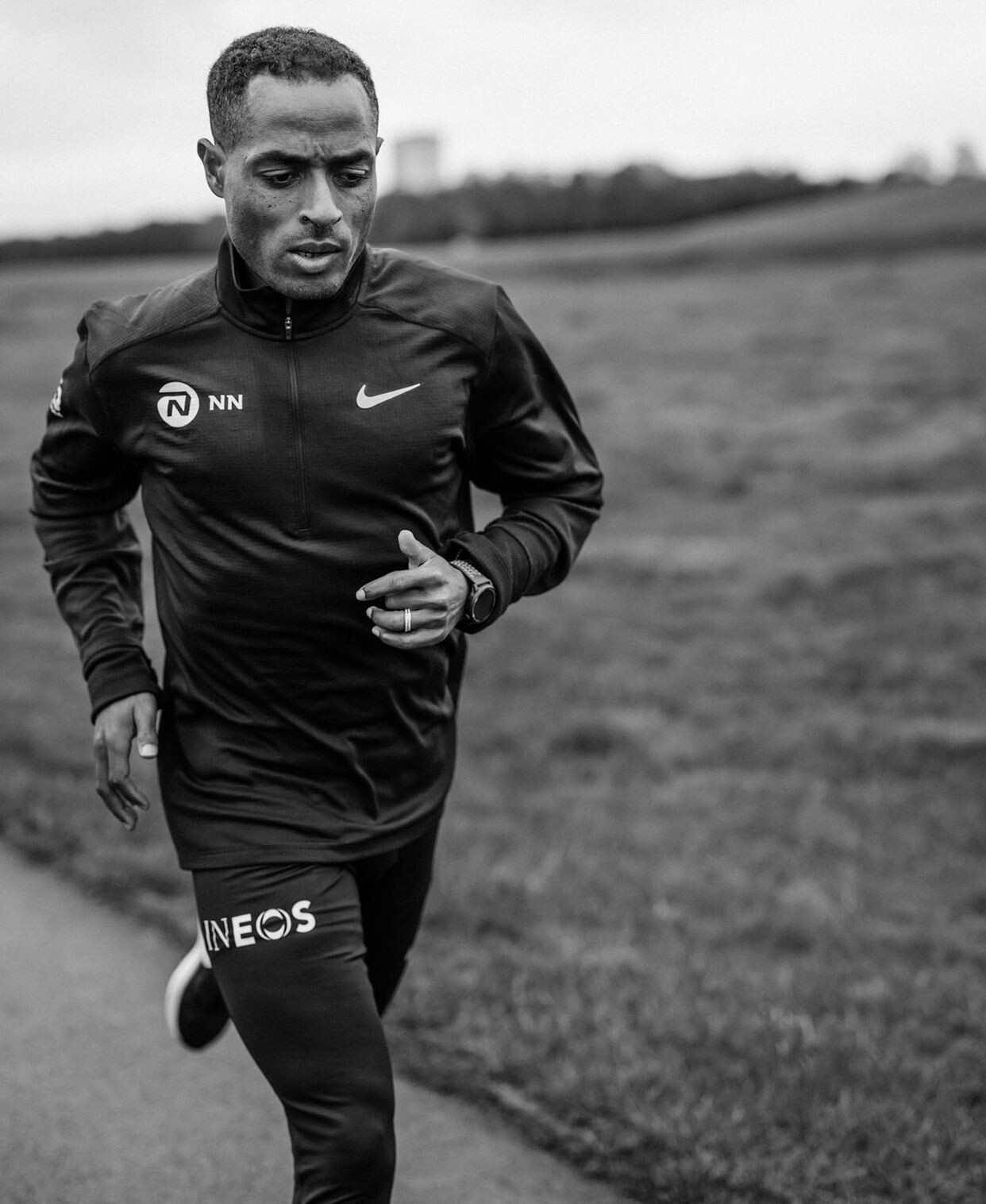
“I am happy when I see Eliud Kipchoge run that time,” Bekele said. “It motivates all athletes who really expect to do the same thing.”
Bekele’s best time was within two seconds of Kipchoge’s previous world record (2:01:39). He described breaking Kipchoge’s new mark as the “main goal” for the rest of his career.
“Yes, I hope, one day it will happen, of course,” Bekele said. “With good preparation, I don’t know when, but we will see one more time.”
Nobody has won more London Marathons than Kipchoge, a four-time champion who set the course record (2:02:37) in 2019. But the two-time Olympic marathon champion did not run this year in London, as elite marathoners typically choose to enter one race each spring and fall.
Bekele does not know which race he will enter in the spring. But it will not be against Kipchoge.
“I need to show something first,” Bekele said. “I need to run a fast time. I have to check myself. This is not enough.”
Kipchoge will try to become the first runner to win three Olympic marathon titles at the Paris Games. Bekele, who will be 42 in 2024, has not committed to trying to qualify for the Ethiopian team.
“There’s a long time to go before Paris,” Bekele said. “At this moment I am not decided. I have to show something.”
So who is the greatest long distance runner ever?
Bekele can make a strong case on the track:
Bekele Four Olympic medals (three gold)Six World Championship medals (five gold)Former 5000m and 10,000m world-record holder
Kipchoge Two Olympic medalsTwo World Championship medals (one gold)
But Kipchoge can make a strong case on the pavement:
Bekele Seconf-fastest marathoner in historyTwo World Marathon Major victories
Kipchoge Four of the five best marathon times in historyTwo-time Olympic marathon champion12 World Marathon Major victories
Login to leave a comment
TCS London Marathon
The London Marathon was first run on March 29, 1981 and has been held in the spring of every year since 2010. It is sponsored by Virgin Money and was founded by the former Olympic champion and journalist Chris Brasher and Welsh athlete John Disley. It is organized by Hugh Brasher (son of Chris) as Race Director and Nick Bitel...
more...Yehualaw and Kipruto cruise to convincing wins at London Marathon
In just the second marathon of her career, Yalemzerf Yehualaw overcame a heavy fall to win the women’s race at the TCS London Marathon, while Kenya’s Amos Kipruto made a decisive move with two miles to go to take the men’s title at the World Athletics Elite Platinum road race on Sunday (2).
Yehualaw won in 2:17:26 – the third-fastest time ever achieved on the streets of London – while Kipruto’s closing speed brought him home in 2:04:39.
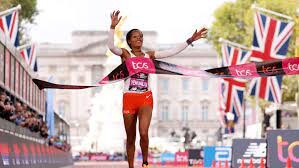
The opening pace in the women’s race was swift, as it often is on the slightly downhill section of the course. The lead pack of eight women – including Yehualaw and defending champion Joyciline Jepkosgei – passed through the first 5km in 16:01 and they reached 10km in 32:18. That early pace suggested a finishing time of 2:16:15 – well inside the women-only world record of 2:17:01 – but the tempo soon started to drop.
The same eight women were still together through 15km (48:51) and at half way, which was reached in 1:08:46. Hiwot Gebrekidan was unable to stay with the pack for much longer and the lead group was reduced to seven women by 25km (1:21:29), the pacemakers having now dropped out.
Asefa Kebede started to push the pace as the lead group embarked on the second half, with Yehualaw biding her time near the back of the pack. Jepkosgei and Joan Chelimo Melly, meanwhile, looked comfortable in the middle of the pack.
With about 10km to go, Yehualaw tripped on a bump in the road and fell hard, just as she had done at the 2020 World Half Marathon Championships where she went on to take bronze. She quickly got back up on her feet and rejoined the lead pack a minute or two later.
Melly and Ashete Bekere were next to drop off the pace, followed by Kebede, leaving just four women in the lead pack: Jepkosgei, world silver medallist Judith Jeptum, Alemu Megertu and Yehualaw. They reached 35km in 1:54:30, their predicted finishing time now outside 2:18:00, but the real racing was just beginning.
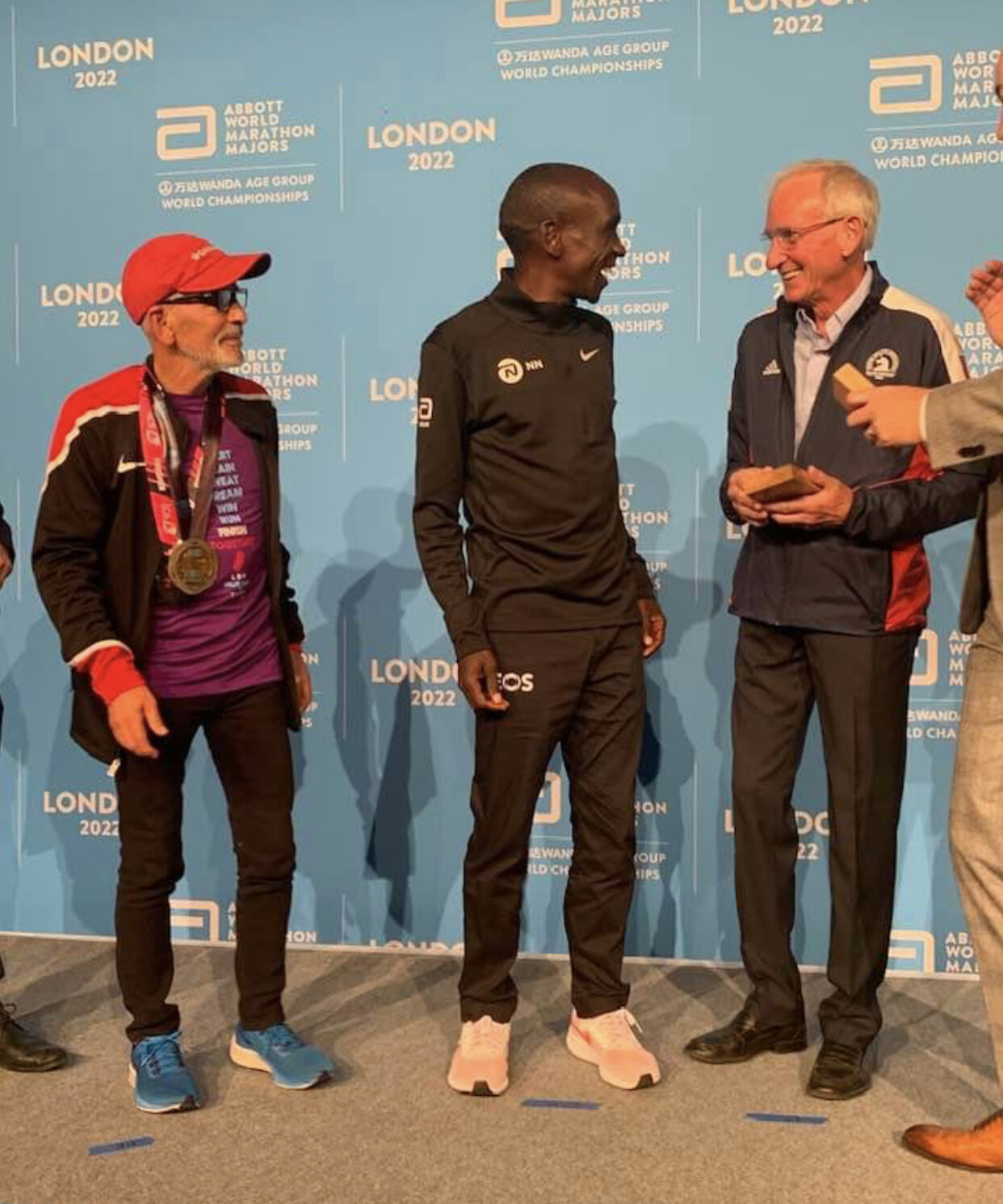
After two hours of running, Yehualaw started to increase her pace. A sizzling 4:43 split for the 24th mile broke up what was left of the lead pack, and within a couple of minutes the Ethiopian had a clear lead over Jepkosgei with Megertu and Jeptum further behind.
Showing no ill effects of her earlier fall, and running with the confidence of a seasoned marathon runner, Yehualaw continued to forge ahead in the closing stages and went on to win by 41 seconds in 2:17:26, just three seconds shy of the PB she set on her debut in Hamburg earlier this year. It’s also the third-fastest time ever recorded in London, behind the world records set by Paula Radcliffe (2:15:25) and Mary Keitany (2:17:01, women-only).
"I am so happy to win here in London," said Yehualaw. "I have worked very hard to prepare for this race and to take the victory is amazing."Jepkosgei held on to finish second in 2:18:07 and Megertu completed the podium in 2:18:32, a PB by 19 seconds. For the first time ever, six women finished in 2:19:30 or quicker.
Kipruto conquers quality field for first world marathon major
The opening pace in the men’s race was more steady and consistent than the women’s race, but the race unfolded in a similar fashion with a group of seven men running together through the early checkpoints. They covered 5km in 14:45, 10km in 29:26 and 15km in 44:20, suggesting a finishing time inside 2:05.
Kenenisa Bekele featured prominently in the lead pack, while defending champion Sisay Lemma held back slightly near the rear of the group. World and Olympic bronze medallist Bashir Abdi and Kenya’s Amos Kipruto were also in contention.
They reached 25km in 1:13:41, still on course for a finishing time just outside 2:04 and with the same seven men still running together. At about 33km, Bekele started to fall off the pace of the lead pack, but he stayed in the race and kept the leaders in sight.
About 15 minutes later – and at roughly the same part of the course where Yehualaw made her move in the women’s race – Kipruto accelerated away from the rest of the pack, opening up a significant lead within a relatively short space of time. A 4:21 split for the 25th mile proved decisive and it soon became clear that victory would be his.
He went on to win by more than half a minute, crossing the line in 2:04:39 to achieve his first victory in a marathon major, following three podium finishes in Berlin and Tokyo in recent years. Ethiopia’s Leul Gebresilase came through to take second place in 2:05:12, seven seconds ahead of Abdi.
Kinde Atanaw was fourth in 2:05:27, followed by Bekele in fifth in 2:05:53, his fastest time for three years. He also becomes the first 40-year-old to run a marathon faster than 2:06.
third photo: Gene Dykes on podium after winning the 70-74 age group with Eluid Kipchoge, the Goat!
by Jon Mulkeen (World Athletics)
Login to leave a comment
TCS London Marathon
The London Marathon was first run on March 29, 1981 and has been held in the spring of every year since 2010. It is sponsored by Virgin Money and was founded by the former Olympic champion and journalist Chris Brasher and Welsh athlete John Disley. It is organized by Hugh Brasher (son of Chris) as Race Director and Nick Bitel...
more...Eluid Kipchoge will lose $200,000 with the Abbott World Marathon Majors drastic reduction of prize money but this is not right says MBR publisher
Two days after Eliud Kipchoge clocked a 2:01:09 world record in Berlin, the Abbott World Marathon Majors announced on Tuesday a drastic reduction in the series’ prize money for runners.
Abbott, currently a $45 billion dollar global healthcare company based in Illinois, was the first title sponsor of the World Marathon Majors.
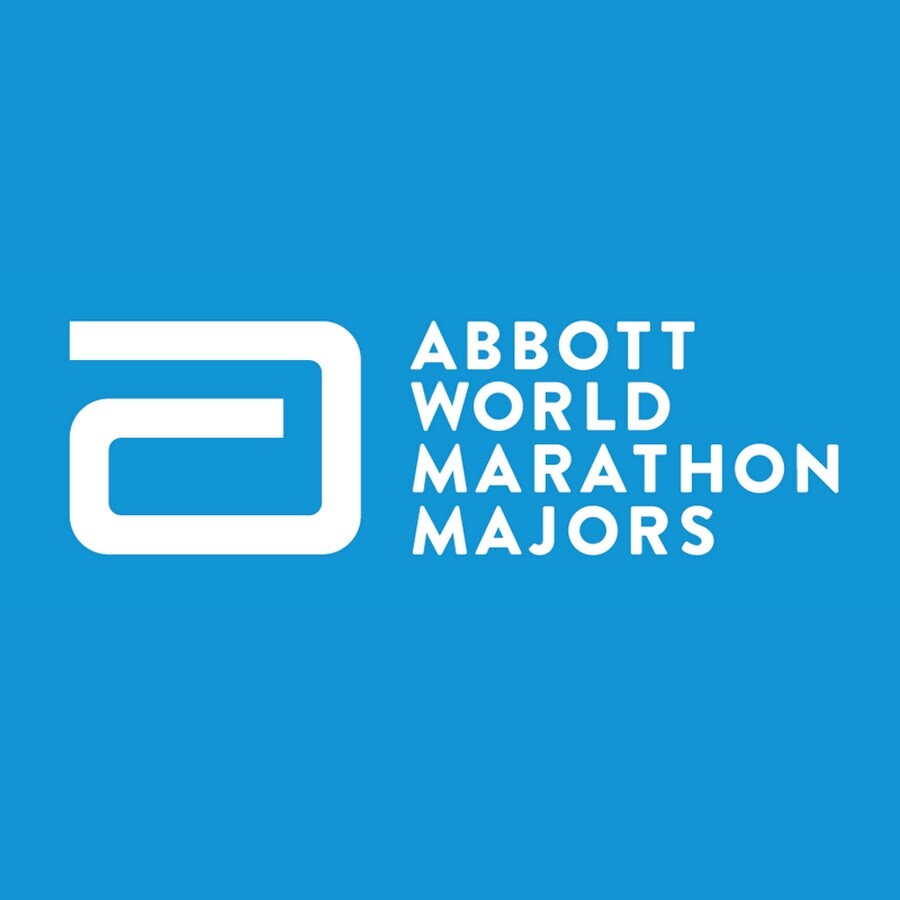
Let's Run posted this: "The change will take effect immediately, applying to the current series, which began at the Tokyo Marathon in March (starting this year, the WMM seasons are based on calendar years rather than the multi-year format of years past). As a result, Kipchoge, who has all but locked up the 2022 WWM Series title, will receive $200,000 less for his efforts.
When the World Marathon Majors — which consists of Tokyo, Boston, London, Berlin, Chicago, and New York — launched in 2006, one of its signature elements was the $500,000 prize awarded each year to the men’s and women’s series champions. In 2017, WMM altered its prize structure, reducing the grand prize to $250,000 (but adding $50,000 for second and $25,000 for third) while increasing prize money for wheelchair athletes and adding a charitable donation component of $280,000.
WMM announced that moving forward series champions will receive $50,000 each — just one-fifth of what was awarded last year and the same amount the wheelchair series champions receive. The prizes for second and third were also halved to $25,000 and $12,500, respectively, while WMM added prize money for fourth ($7,500) and fifth ($5,000). There was no mention of a charitable donation component (though the amateur runners at the World Marathon Major races raise significant money for charity each year)."
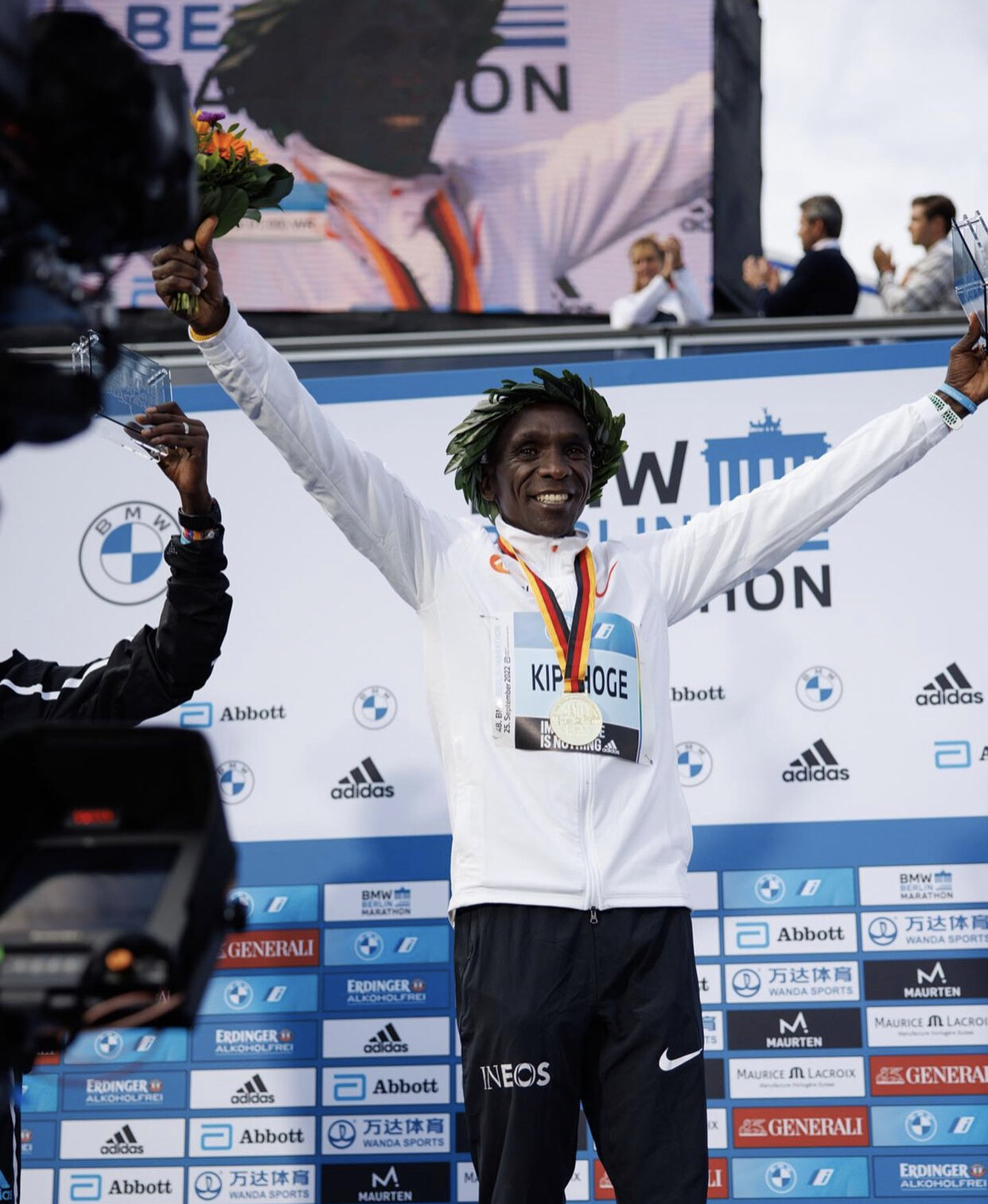
"This is not good news," says Bob Anderson, My Best Runs publisher, "but millions of dollars have been awarded over the years and maybe we should not have taken it for granted?"
"However, how can they make a change like this when it was already announced? A major change like this should not go into effect until the next season. Kipchoge should not be pentalized because Abbott decided after the fact to reduce marketing expenses or something in my opinion," says Bob.
"I do remember when my friend Derek Clayton set the world record clocking 2:08:32 May 30, 1969. He did not win any prize money. That record stood for 12 years. Or another friend Geoff Smith won the 1984 and 1985 Boston Marathon and won no prize money. Running was not a pro sport back in those days and no one was paid above the table until 1986 or so.
"Racing and for sure the Marathon offer sponsors a lot of exposure," Bob continues. "Hopefully new sponsors will come to the table. However, the economy right now is not good and expenses like this can be the first to be cut but lets think positive."
Abbott Laboratories is an American multinational medical devices and health care company with headquarters in Abbott Park, Illinois, United States. The company was founded by Chicago physician Wallace Calvin Abbott in 1888 to formulate known drugs; today, it sells medical devices, diagnostics, branded generic medicines and nutritional products.
"In 2021 Abbott (ABT) revenues were 43 billion and their income was 7 billion. However in the last six months their stock price has decreased 18.2%. Off but better than many companies," says Bob Anderson. "I wonder if this has anything to do with this decision to cut prize money but regardless Eluid Kipchoge should not lose $200,000 in the process."
Let us know your opinion.
Login to leave a comment
Scottish film director Kevin Macdonald is going to be making a documentary on Eliud Kipchoge's plans to break the two-hour barrier for 26.2 miles
Eliud Kipchoge is the marathon world record holder with a time of 2:01:39. In October in Vienna he will be attempting to run the first sub two hour time for 26.2 miles. It won’t count as a world record, however since it is being run as a time trial but still the feat would be off the charts.
Kevin Macdonald is expected to land in Kenya soon. While in the country, he will be taken around by filmmakers associated with Ginger Ink, who is known for producing some of Kenya's award-winning movies like 'Supa Modo' and 'Nairobi Half Life'. The two movies by Ginger Ink have been submitted for the Oscars.
The Eliud Kipchoge documentary, which will be shot in Iten, is funded by Britain’s billionaire Jim Ratcliffe.
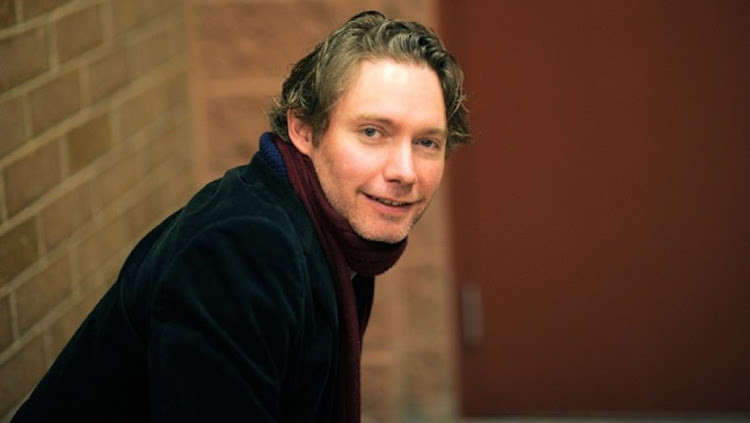
Ratcliffe founded chemicals group INEOS and is estimated by London-based Sunday Times Rich List to be worth 21 billion pounds (25.5 billion US).
Ratcliffe was born in Failsworth, Lancashire. He studied chemical engineering and got his first job at oil company Esso.
He started making his fortune by mortgaging his house in 1992 to finance a buyout of a BP chemicals business and formed INEOS in 1998.
Today his fortune is valued at 21 billion pounds, and in May 2018, he was named the richest person in the UK.
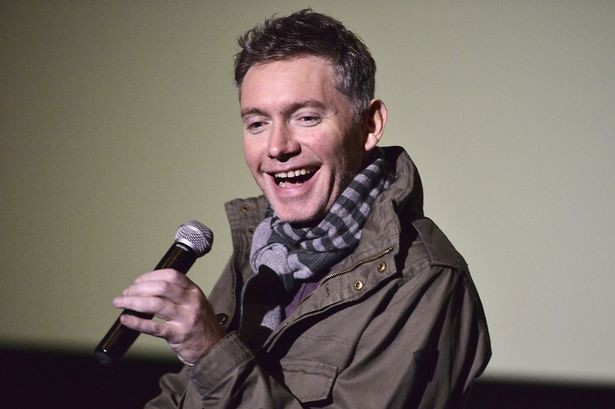
Macdonald is known for shooting captivating documentaries. He worked with the film production team Altitude, who created a 2018 documentary based on Whitney Houston's life and death.
This was the first Whitney Houston documentary to be officially authorised by the estate and includes never-before-seen footage of Houston, exclusive demo recordings, rare performances and interviews with luminaries like Clive Davis.
He said, "The story that is never told about Whitney is just how brilliant she was as an artiste. By many measures, she had the greatest voice of the last 50 years. She changed the way pop music was sung, bringing it back full circle to its blues and gospel roots."
He plans on doing an equally exciting documentary on Eluid Kipchoge.
Login to leave a comment
This sounds like an exciting project. Can’t wait to see the final result. - Bob Anderson 8/20 9:22 am |
INEOS 1:59 Challenge
Mankind have constantly sought to reach new frontiers and to achieve the impossible. From Edmund Hillary reaching the summit of Mount Everest to Roger Bannister’s four-minute mile to Felix Baumgartner jumping from space we have frequently redefined the limits of human achievement and broken new barriers previously seen as simply impossible. After the four-minute mile and the ten second 100m...
more...The Run The World Global 52-week Challenge has finished. The team logged 122,123 miles or 335.5 daily. Michael Wardian was first American and Kenyan's Eliud Esinyen ran the most miles averaging 15.7 miles daily logging 5,738
Run The World Global Challenge is a world-wide celebration of running. The program was started by Bob Anderson one year ago, July 4, 2018. Since that time 281 runners around the world ran or walked and then logged 122,123 miles. This equals 335.5 miles daily or 2,348 miles weekly for 52 weeks which equals 4.9 times around the world.
"One of the key reasons we started this program," says creator Bob Anderson, My Best Runs and Runner's World magazine founder, "was to motivate people, bring together runners from all over and to run miles all over the world."
That all happen. Runners from 20 countries participated, miles were run in 75 countries and it certainly motivated many runners to run more miles than they were running before.
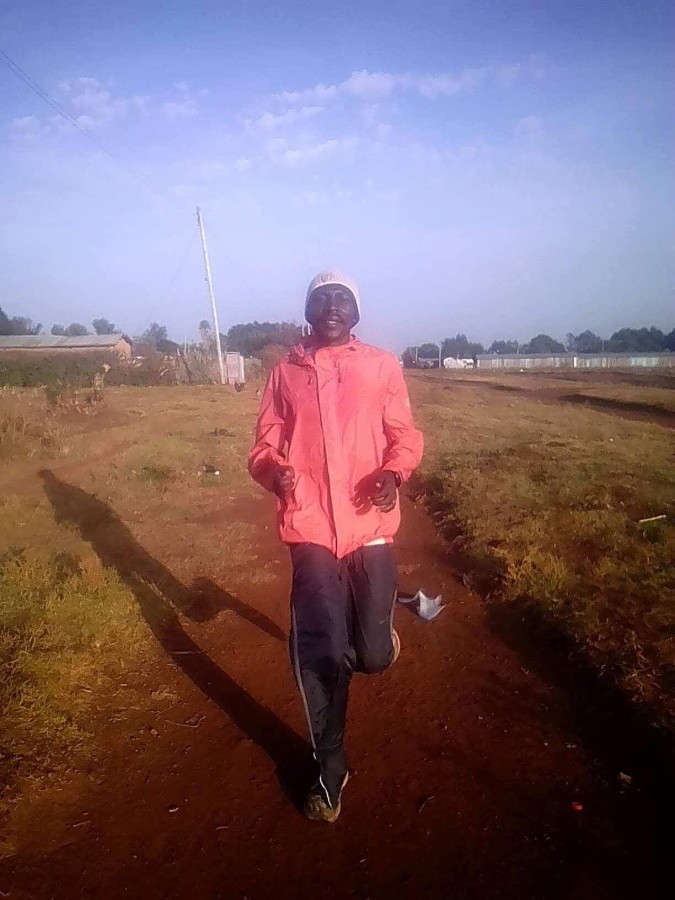
53-year-old James Kalani had not run much over the last few years and then he entered the RTW Challenge. After getting in good shape over several months, he started pushing it for Challenge #5 which started March 31. Over the last 94 days he ran and logged 1536 miles. That's 114 miles weekly. It was not just covering miles, many were quality. On June 16 he ran 30.6 miles at an average pace of 6:41 per mile.
Before the RTW Challenge creator Bob Anderson was running on average 20 miles weekly. "I got so motivated by this challenge," says Bob. "I looked forward to running not just one time daily but often I would run two or three times. I took a photo everyday and posted it in our Runner's Feed. I also read every post and commented on each for the whole year. I have been running since 1962 and have run nearly 1,000 races. I am an addicted runner but I needed something new and this was it."
In the end Bob averaged 5 miles daily or 35 miles weekly for a total of 1830 miles for the year. With the added miles he also improved his racing performance. He ran 7:54 pace for 10k and placed third 70 plus at the London 10,000 in May. A race with nearly 20,000 runners.
The RTW Challenge team did some amazing things during the year. 69-year-old Brent Weigner lives in Cheyenne Wyoming but many of his 2036 miles were run outside of the United States. In fact Brent ran miles in 30 different countries.
The most miles were run and logged in the United States. The top five countries were: United States (64,899 miles), Kenya (24,066 miles), Palau (8,242 miles), India (7,423 miles) and South Africa (6,765). The amazing story here is that the little country of Palau has less that 22,000 inhabitants and placed third. Their team leader Aaron Salvador logged 1,584 miles himself and encouraged his team to run and log.
The team leader for South Africa, Liz Dumon, is the key reason why her country placed fourth. She herself ran and logged 1000 miles. Liz encouraged people to sign up. In fact our youngest members were twins she recruited along with mom and grandma. The 7-year-old twins Jonathan (logged 118 miles) and his sister Michelle (logged 100 miles) had loads of fun and posted regularly in the Runners Feed. Their dogs joined in on the fun too. (Third photo of twins with Grandma)
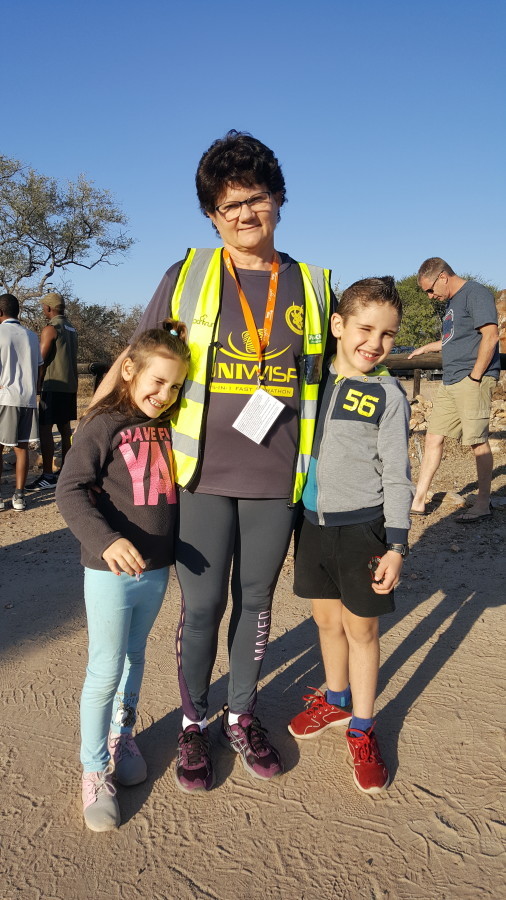
Their 56-year-old grandma (Johanna Fourie) logged 672 miles and placed 10th for females. Right behind her was mom (Erika Fourie) with 625 miles.
Who said age is just a number? The top three overall females were 65 plus. Placing first was 68-year-old Kat Powell (USA). She logged 1271 miles. Not far back was 69-year-old Linda Robinson (USA) with 1145 miles followed by 65-year-old Carmella DiPippa (PW) with 1040 miles. Sixth female was 71-year-old Karen Galati (USA) who logged 835 miles.
On the men's side there were so many stars. 35-year-old Kenyan Eliud Esinyen averaged 15.7 miles daily or 110 miles weekly (second photo). Many times he ran three times daily. On April 21 he ran a marathon on a tough course at high altitude clocking 2:22:46 which is 5:27/mile pace. On January 27 he ran a 10k clocking 31:05. Eliud ran and logged the most with 5,738 miles.
Kenya's team leader Willie Korir (27) placed second overall with 5195 miles. He also posted images regularly in the Runners Feed along with comments. He also wrote several stories for My Best Runs Running News Daily column including finding inside information about the king of the marathon, Eluid Kipchoge.
The first American and third overall was 45-year-old Michael Wardian with 3618 miles (frist photo). This ultra star pulled off many amazing feats during the year. Most recently on June 29 he ran 89.9 miles around Washington DC. On May 4th he ran 62.14 miles at 7:14/mile average pace in Sacramento. He ran the Big Sur Marathon in 2:35:18 making the podium. He had run the Boston Marathon earlier a little faster clocking 2:33:23.
In March he travelled to Israel and posted the fastest known time on the 631-mile Natoinal Israel Trail. He covered this distance in 10 days, 16 hours and 36 minutes. Earlier he not only ran seven marathons on seven continents in seven days (winning them all) he tacked on three more marathons when he got home. That's ten marathons in ten days. He is the complete runner with a wide range. On Feb 10th he ran a 5k in 17:01.
"Michael is one amazing versatile runner and we were happy when he decided to join our team," says Bob Anderson.
Second American and fifth overall was 75-year-old Frank Bozanich who logged 3523 miles. Frank has run many ultra races over the years and have won many. Lots of these miles were not real fast compared to what he has done before. But on July 30th last year he ran 20 miles in Reno in two hours and 43 minutes. That is an 8:09/mile pace.
Finishing in seventh place was 72-year-old Paul Shimon who logged 2835. Like so many of our team, Paul had to deal with a lot of bad weather in Kansas during the winter. But he layered up and got in the miles.
Michael T Anderson (61) placed eighth overall logging 2,798 with lots of fast times along the way. He has run over 130,000 miles in his lifetime so far. On June 8th he ran 19:13 for 5k in Atlanta where he lives. On April 28 he clocked 39:25 for 10k.
"The fastest runner on our team was Joel Maina Mwangi," says Bob Anderson. This 34-year-old Kenyan placed 13th overall with 1,953 miles logged. On March 10 he ran a 30:14 10k in Torino Italy. He ran six half marathons under 1:05. His fastest was run in Aosta, Italy where he clocked 1:02:50 on September 30.
"There are as many amazing stories," says Bob Anderson. "I am glad our event is helping motivate runners all over the world. I am looking forward for year two."
What's next? Run The World Global Challenge #6 will be a 10-week program. There is no entry fee. You just need to have a free My Best Runs (the sponsor of this program) account and sign up for Run The World.
Login to leave a comment
Run The World Global Challenge
Run The World Global Challenge (My Best Runs Running Log)is a world wide celebration of running. RYW Challenge 14 started Jan 1, 2026 and will go the entire year ending Dec 31, 2026. See how many miles you can log of running and walking. The continuing RTW1 Challenge started July 4, 2018. Participants run or walk and then log in...
more...Kenya's Eliud Kipchoge has started training to break the two hour mark in the marathon
World marathon champion Eliud Kipchoge said on Thursday that he has started training in order to be fit to battle the INEOS 1:59 Challenge.
This will be the second attempt for the 34-year-old to beat the odds and run the marathon distance in under two hours as the fastest man.
"I think a good career is where you give yourself a challenge every now and then and so I think it is high time for me to try another challenge by beating the two-hour mark," said Kipchoge from Eldoret.
In 2017, Kipchoge missed 26 seconds from his initial attempt to break the two-hour mark as he clocked in two hours and 25 seconds in his "Breaking Two" project on Italy's Monza motor racing circuit.
Now he has shelved plans to compete at the World Championships or defend his Berlin marathon title to focus on running to break the two-hour mark in a bid sponsored by British manufacturing company INEOS.
It will take place on an unspecified flat loop circuit venue in London, on a date to be decided in October.
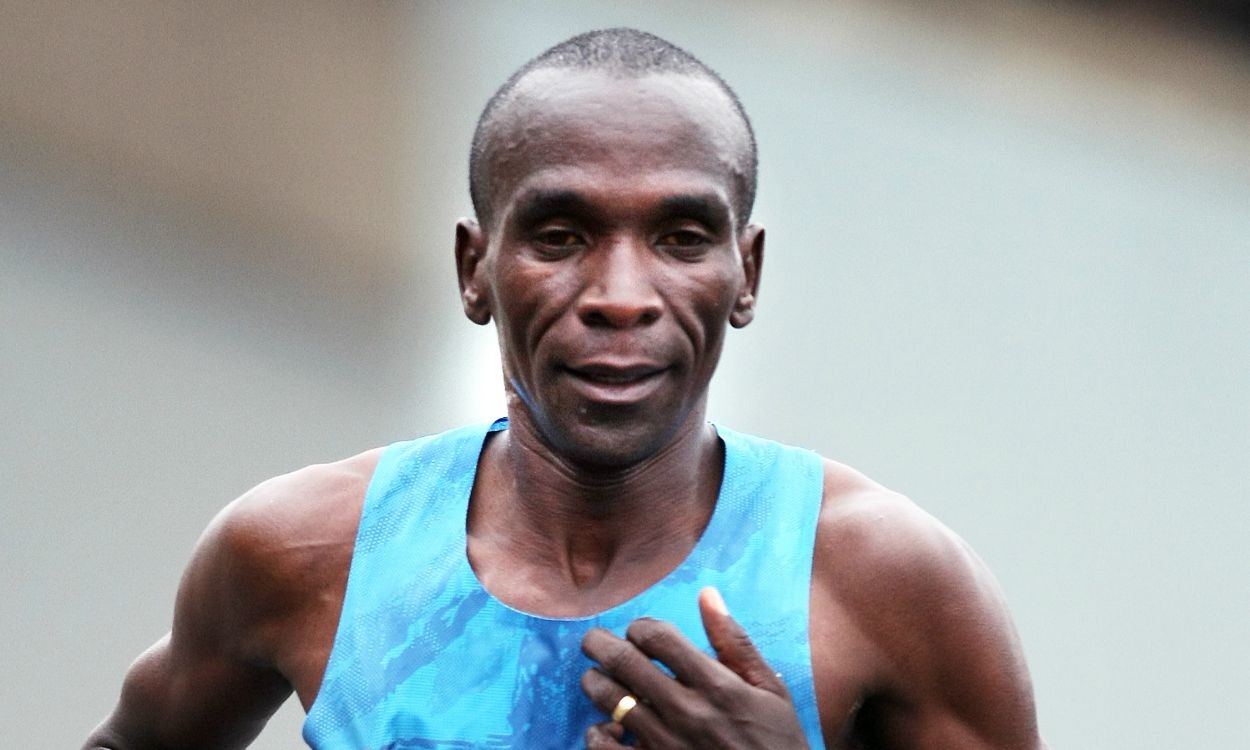
"INEOS Challenge is a noble course, it's a historic challenge where I am going to make history. Many ideologies have been said that no human can break the two-hour mark. But personally, I have dared to try for the first time and I missed by 26 seconds. Now I have a rich experience from Monza and am confident that I will beat the mark because our training program is different from the other training," said Kipchoge.
Indeed, the Olympic champion has had two months of total rest after winning the London marathon clocking 2:02:37 less than a minute off his world record set in Berlin of 2:01:39.
He has started his training with gym sessions for two weeks in late May and has moved to high altitude training camp in Kaptagat for the full preparation.
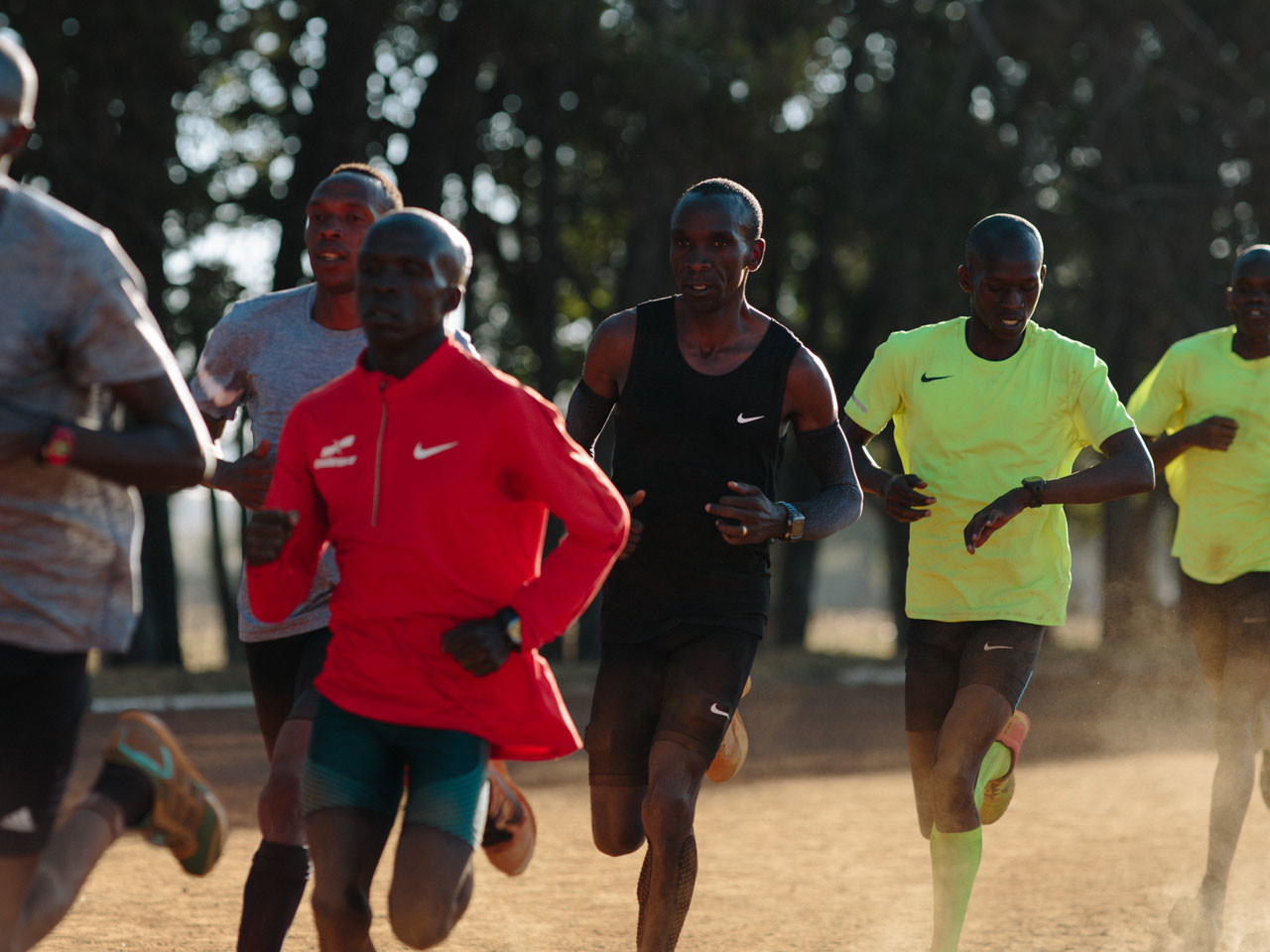
"Our training has started again. When we finished the season, we have four days of running slowly to recover and then three weeks of total rest and then we start again. When your mind is relaxed and fit, the physical part can go on as usual. When we start we start at zero and we need three -four month to be fit again for another marathon," said Kipchoge.
His longtime physiotherapist Peter Nduhio, who is now part of INEOS 1:59 Challenge team, said he is amazed by Kipchoge's ability to remain focused despite challenges in his life.
"Eliud keeps on setting the bar higher. Each time he makes us climb the ladder higher. His best season was 2018, now he has a new challenge and he will attain it," said Nduhio. "What makes this challenge inspirational is that it has no template to follow."
by
Login to leave a comment
INEOS 1:59 Challenge
Mankind have constantly sought to reach new frontiers and to achieve the impossible. From Edmund Hillary reaching the summit of Mount Everest to Roger Bannister’s four-minute mile to Felix Baumgartner jumping from space we have frequently redefined the limits of human achievement and broken new barriers previously seen as simply impossible. After the four-minute mile and the ten second 100m...
more...The battle at the London Marathon is going to be starting in just a few hours
Sir Mo Farah has twice competed in the London Marathon, finishing in eighth place in 2014 and in third spot in 2018.
The four-time Olympic champion will face stiff competition to win race, which will come in the form of defending champion and world record holder Eliud Kipchoge. On top of this Eliud has only been beaten once in the marathon. Wilson Kipsang beat him in Berlin as he set a world record.
Farah is well aware of the momentous task on his hands and is hoping his fellow Brits can help guide him to victory.
”All I can ask from the crowd is to give me as much information as possible, as I go through the last 10 miles in particular," he told Sky News. "If I'm leading, if I'm behind, the more information I have the easier it is.
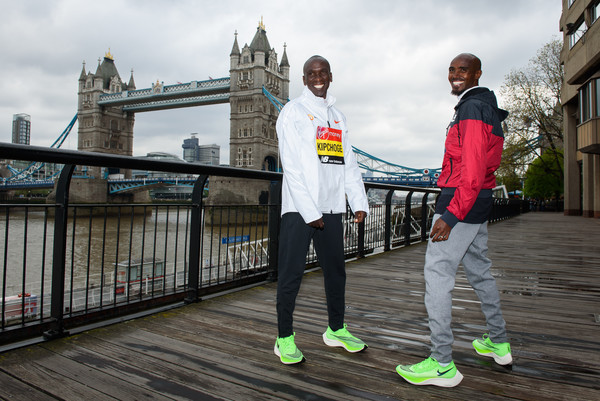
“This race means a lot to me. I finished third last year and this year I believe I can give it a little bit more."
Kenya’s Kipchoge is the favourite to win the marathon this year having set a new world record in Berlin last September.
"Eliud is a great athlete and the world record holder," Farahsaid of Kipchoge. "I'm going to go out there and give it my best."
"Racing against Eliud in London was learning the hard way - but I believe I learned a lot," Farah added when asked about last year's race.
Mo Farah and Eliud Kipchoge are two of the favourites to win the London Marathon.
"After each race, you get a bit better, that bit more experienced. I believe I could have gone a little bit faster in Chicago - 2:04-something, but I don't know.
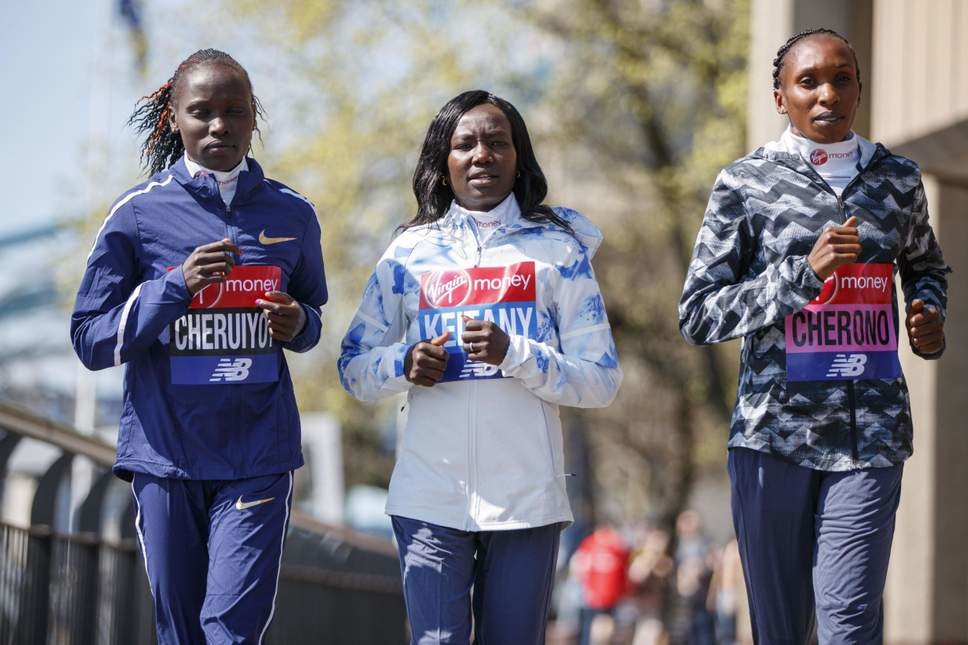
"It's nice to be back in my home city; it's really exciting. I feel more nervous and hungry again. I'm not used to winning in the marathon, so I feel like I've got my mojo back."
The battle in the women’s race could even be more exciting and in fact a world record could be in the makings.
It looks like the weather could be good for marathoning. Rain maybe early but the temperature should be in the mid forties. The wind might be as strong as 10mph.
In total over 40,000 participants have entered and over one billion pounds have been raised for charity since the Marathon was first run.
Login to leave a comment
Best Racing Moment of 2018 and My Best Runs 2019 World Best 100 Races were announced today
My Best Runs "Best Racing Moment in 2018" and the My Best Runs "2019 World Best 100 Races" were announced today in Mountain View, California at the My Best Runs (MBR) headquarters.
First on the agenda was the announcement of the 2018 Best Racing Moment. MBR founder Bob Anderson stated, "Eluid Kipchoge was all smiles as he crossed the finish line at the Berlin Marathon September 29."
"He had just smashed the world marathon record clocking 2:01:39. Eliud ran the last 17k without pacers, pushing himself, taking off one minute and 18 seconds off of Dennis Kimetto's record."
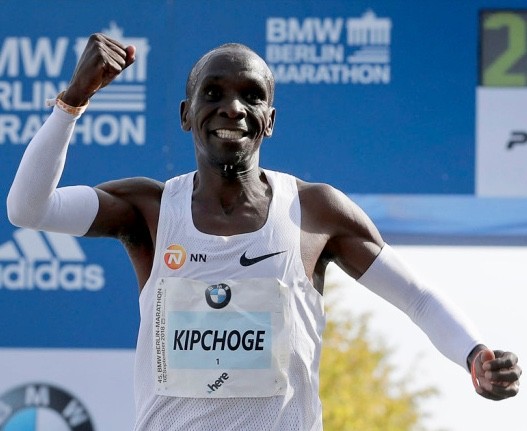
"The world has rarely seen one event so dominated by one man, Kenya's Eliud Kipchoge," says Bob who also was the founder of Runner's World magazine (1966) and publisher for 18 years.
Eliud has won many awards this year including World Athletes of the Year at the IAAF Awards.
Next up on the agenda was the annoucement of the 4th Annual My Best Runs 2019 World Best 100 Races.
"There are so many good races in the world. This list could easily be much bigger. However, as we have done now for four years, we have narrowed it down to the top 100," stated Bob.
The featured race at 44 of the best 100 are marathons. There are 20 half marathons and 14 10ks. There is the Western States 100 miler and the Comrades Ultra marathon in South Africa.
The shortest race is the New Balance 5th Avenue Mile in New York City. The longest is the 156 mile Marathon Des Sables coming up March 5 in Morocco.
Most offer prize money totally million of US dollars. The Standard Chartered Dubai Marathon coming up January 26 is offering $1,316,000. This marathon which was first held in 2000 top four men at the 2018 race all ran under between 2:04:00 and 2:04:06. Four women ran between 2:19:17 and 2:19:53.
"It is good to see over $21 million (from races MBR are featuring) in prize money being offered runners," says Bob. "Running is what these runners do and the money is well deserved and important for our sport."
Of course the Berlin Marathon is one of our top 100 but so is the Valencia Half Marathon (Spain) where Abraham Kiptum broke the world half marathon record in the 2018 race by clocking 58:18.
The Birell 10k Race in Prague, CZE also made the list again for the 4th year. 18-year-old Phonex Kipruto from Kenya clocked 26:46 while Caroline Kipkirui clocked 30:19. "This is one fast evening race and obviously belongs on our top 100 list," stated Bob.
The list has races from 23 different countries.
"You can not go wrong in running any of these races," says Bob Anderson. "Your biggest challenge in many of these races will be to be able to be on the starting line. But if you can get in, you will have a blast."
by My Best Runs
Login to leave a comment
The magical Kenyan Diet and training at altitute are two keys factors why Kenyan runners are having so much success
One unique and interesting thing about Kenyan runners is their daily diet.
A diet that gives them energy to run for a long time and fast. Many wake up at 5am and eat something like a slice of bread or ugali with tea to provide energy.
Some prefer going for their morning run on an empty stomach but after training they take tea with rice or ugali. This is common in Kenya as well as drinking at least two glasses of tea in the morning.
The most important meal of the day for many Kenyan runners is lunch. Most eat a heavy amount of ugali, rice and beans/potatoes or stew depending on the athlete.
For example super stars like Eliud Kipchoge and Wilson Kipsang, love ugali with traditional vegetables like spinach accompanied by milk called mursik (sour milk).
Mursik is sour milk that taste so sweet. It contains enough proteins to help build and repair muscles due to tearing during daily training and competition. With daily intake it helps the runner be more energetic, strong and more able to be tough.
The Mursik Factor has been making headlines when an athlete wins a race or breaks a record because Mursik never disappoints. Mursik and ugali are both key. The ingredients of ugali itself is such a secret and many keep wondering where the energy of Kenyans comes from.
Ugali is a carbohydrate but has amazing ingredients. Ugali is a type of cormeal porridge and is made from maize four.
It is cooked in boiling water or milk until it reaches a stiff or dough-like consistency. 100g of maize flour contains folates 0.6mg, vitamin A 0.5mg, vitamin B1 3.0mg, vitamin B2 2.0mg, vitamin B3 14.9mg, vitamin B6 2.0mg, vitamin B12 0.007mg, iron 21mg, and Zinc 33mg.
In addition the roughage helps in digestion. On top of this energizer, the high altitude helps the body produce a lot of hemoglobin due to less oxygen giving runners an easy time to run fast in low altitude outside Kenya.
This is the magical Kenyan diet that propel Kenyan runners like a space ship going into the universe.
How can you doubt anything that Eluid Kipchoge does to run a 2:01 marathon?
by Willie Korir reporting from Kenya
Login to leave a comment
Eliud Kipchoge and Caterine Ibarguen were named World Athletes of the Year at the IAAF Awards
Kipchoge underlined his status as the world’s most dominant distance runner. The 34-year-old Kenyan won the London Marathon in April in 2:04:17 to finish comfortably ahead of one of the deepest marathon fields in history.
Five months later, he won the Berlin Marathon in 2:01:39 to smash the world record. His time in the German capital was 78 seconds faster than the previous world record, representing the biggest single improvement on a men’s marathon world record since 1967.
Not content with being the best triple jumper in the world, Ibarguen also tested herself against the world’s best in the long jump this year – and consistently came out on top in that too.
The 34-year-old Colombian won both horizontal jumps at the Central American and Caribbean Games, the IAAF Continental Cup and at the IAAF Diamond League finals – winning the latter two titles in two different cities within the space of 24 hours.
She was unbeaten in all eight of her triple jump competitions, ending the year with a world-leading mark of 14.96m in her specialist event and a national record of 6.93m in the long jump.
Login to leave a comment
Another look at the 2018 Boston Marathon Champion Yuki Kawauchi
Yuki Kawauchi’s improbable victory at the Boston Marathon on Monday is the crowning glory in the career of an amateur Japanese runner who has defied every convention in modern athletics and taken the road less travelled to make his mark.
The 31-year-old from Saitama, who becomes the first Japanese man to win the Boston Marathon since Toshihiko Seko in 1987, holds down a full-time job working at a local school, and trains without the aid of a coach or sponsorship. And he has competed in more than 80 marathons.
After splashing across the finish line through wind and rain ahead of defending champion Geoffrey Kirui of Kenya on Monday, Kawauchi was in no doubt he surprised a few people.
“I don’t think there was a single person in Boston who thought I would win this today,” he said with a smile. “In the marathon you never know what could happen.”
(Editor’s note: we did think that Yuki was the best runner in the field winning other races in extreme weather conditions. This being posted Sunday on MBR.)
Many of Kawauchi’s marathon wins have come in awful weather and he said being battered by wind and rain in Boston played right into his hands.
“I think the conditions were instrumental in being able to win …” he added. He has won his last five marathons, including four in 2018 alone, and ran 12 last year. Kenya’s reigning Olympic champion Eluid Kipchoge by comparison ran only two.
“I love to run races,” said Kawauchi. “Races gives me the opportunity to travel and in a more practical sense, because I train by myself if I didn’t put in a lot of races I wouldn’t be able to put in the same quality.”
Login to leave a comment


